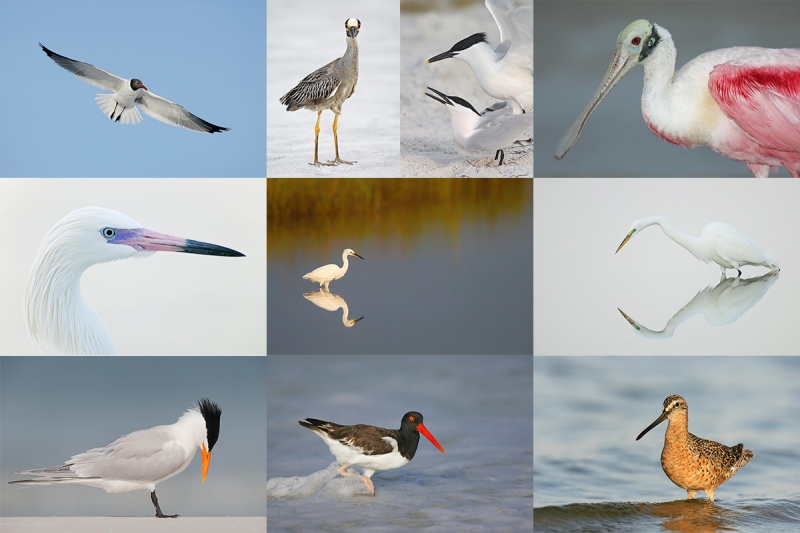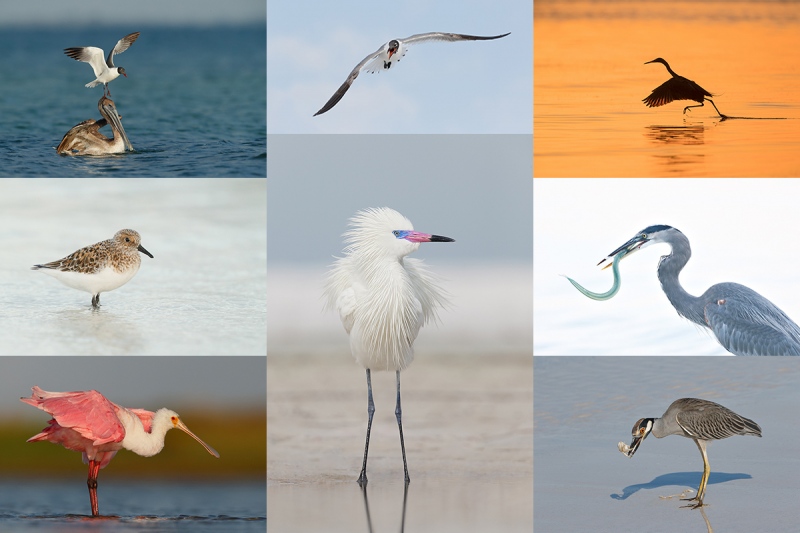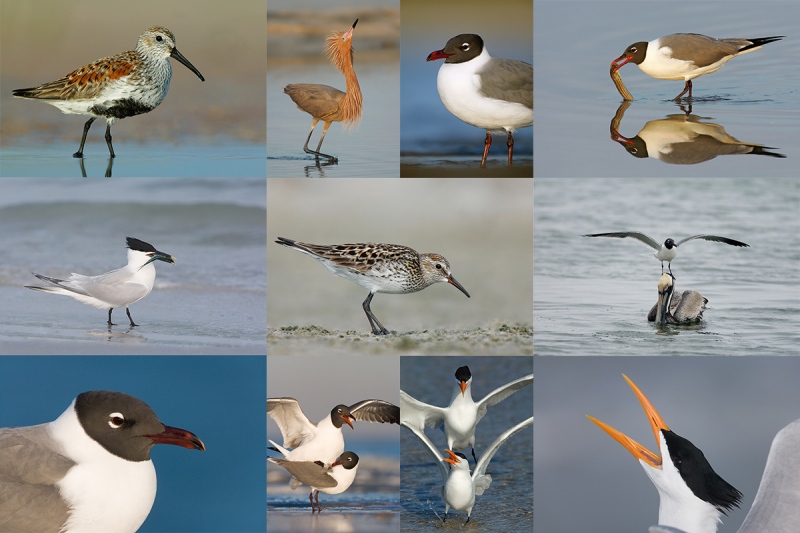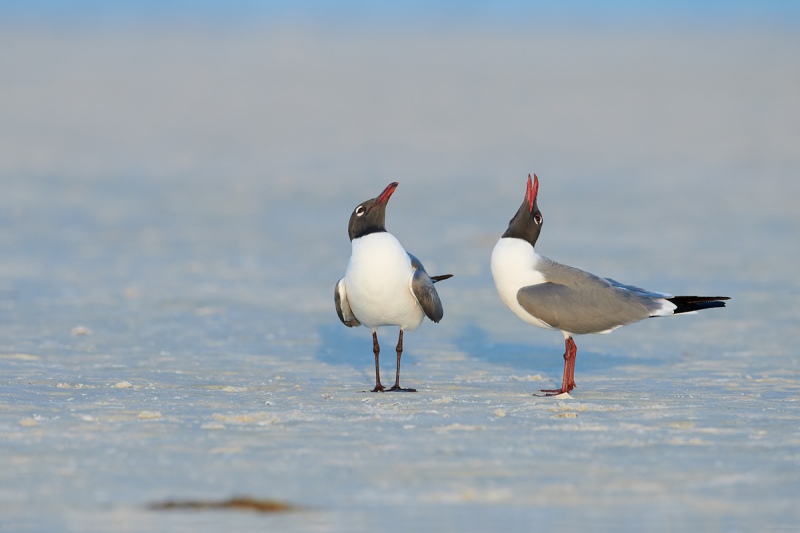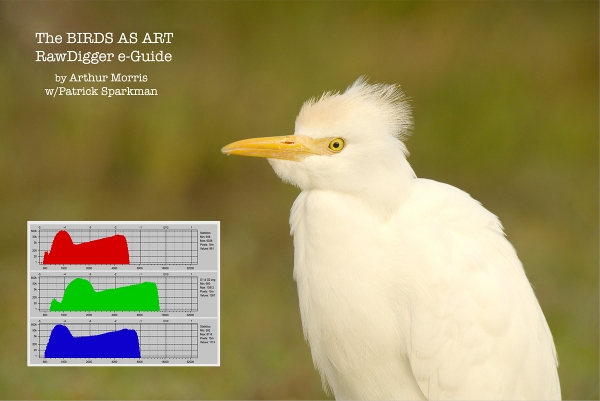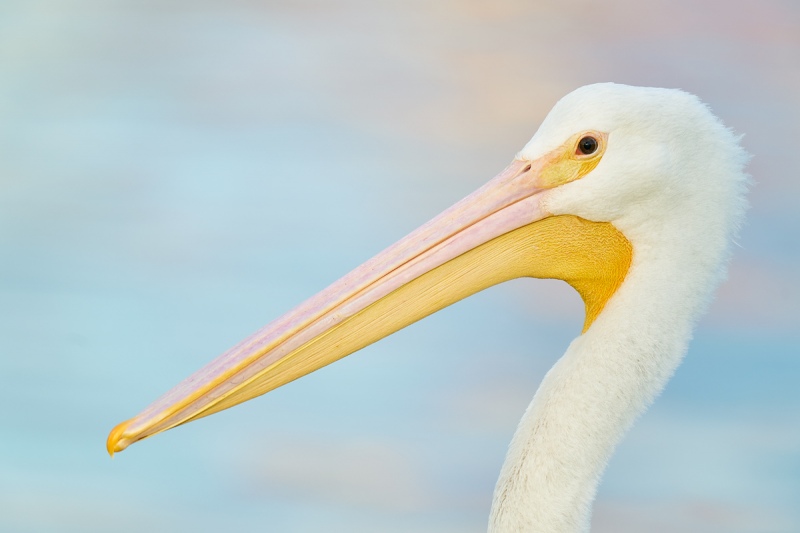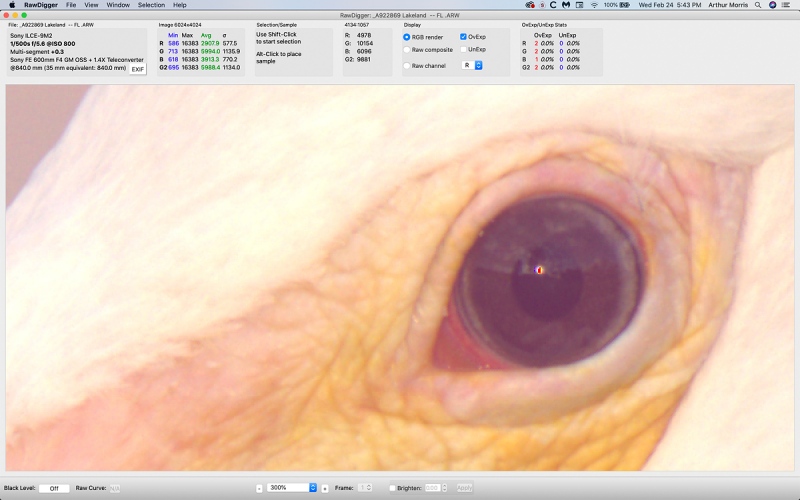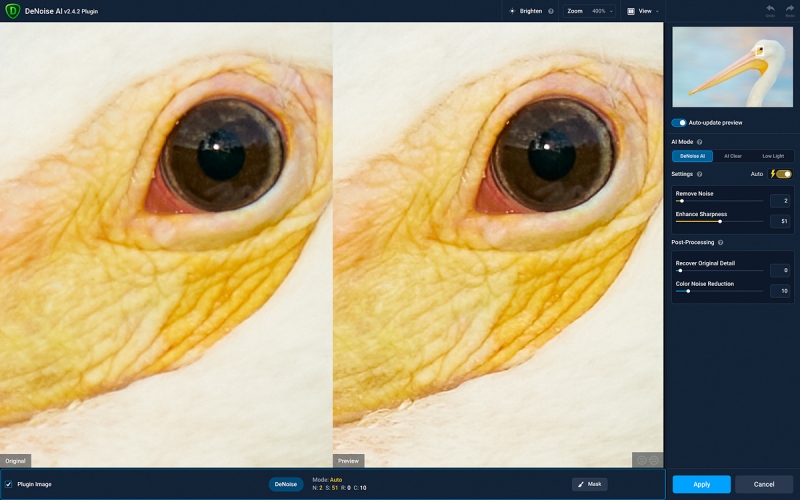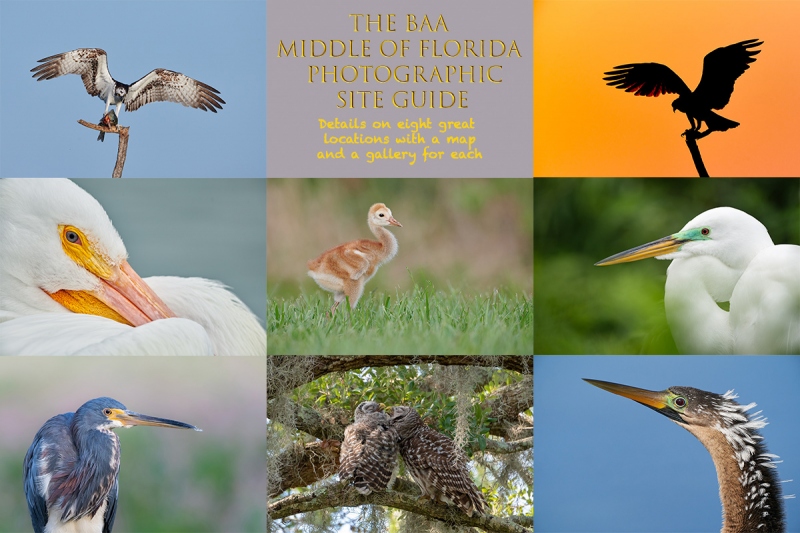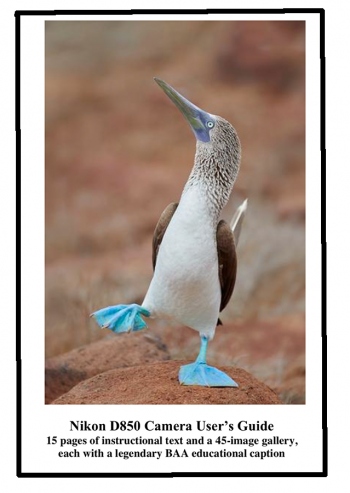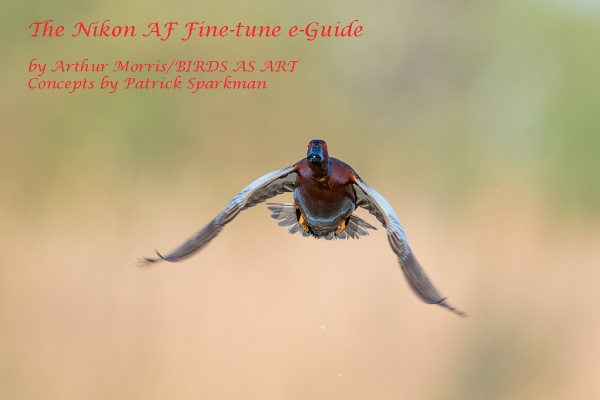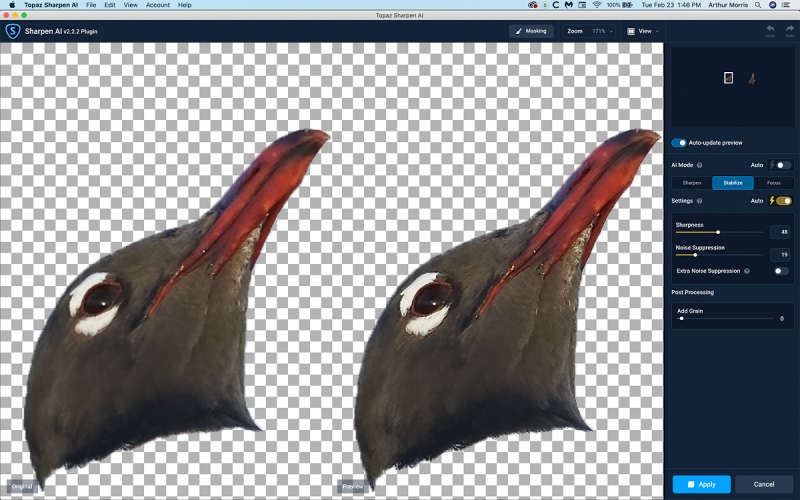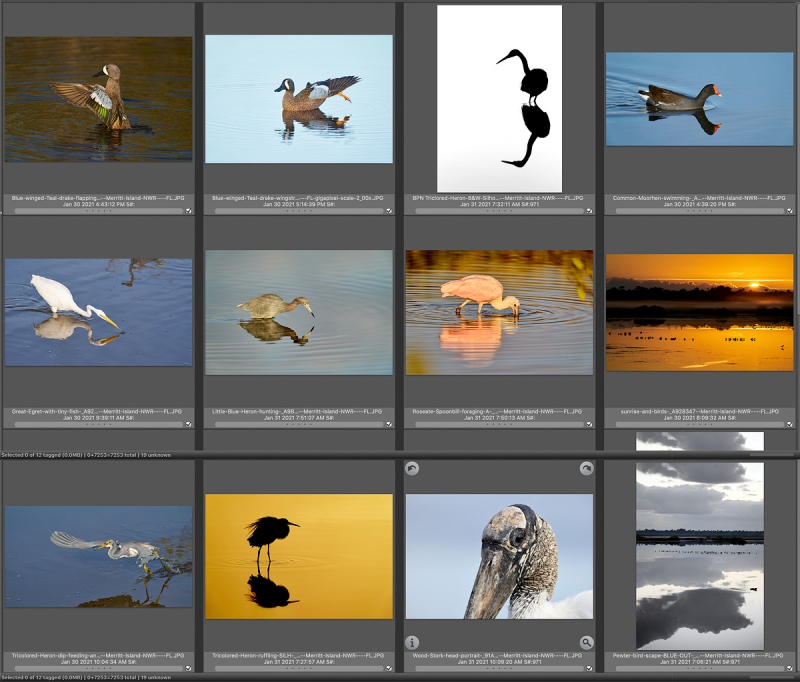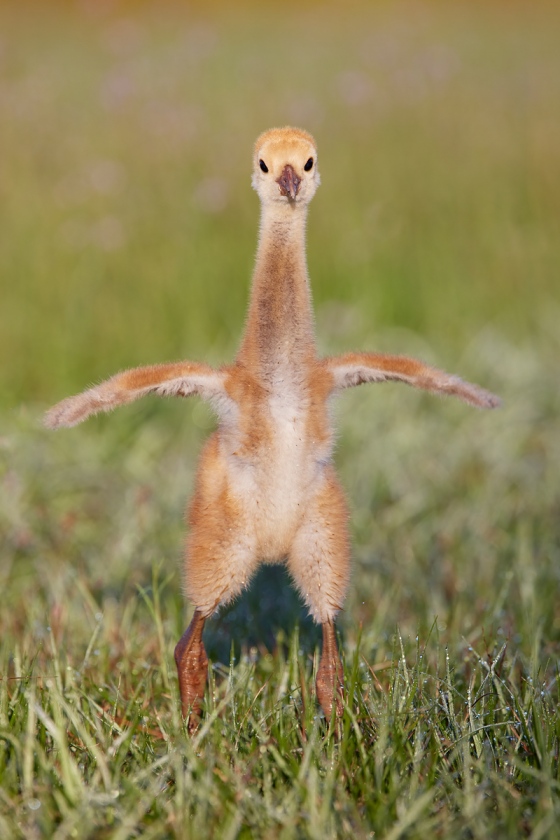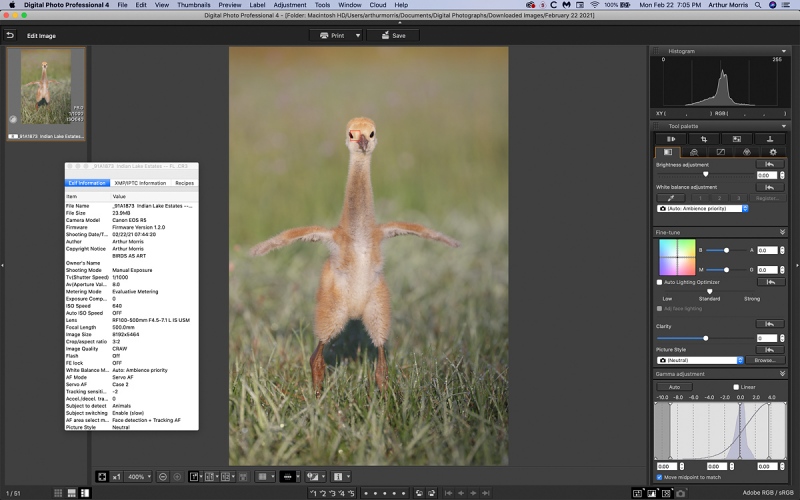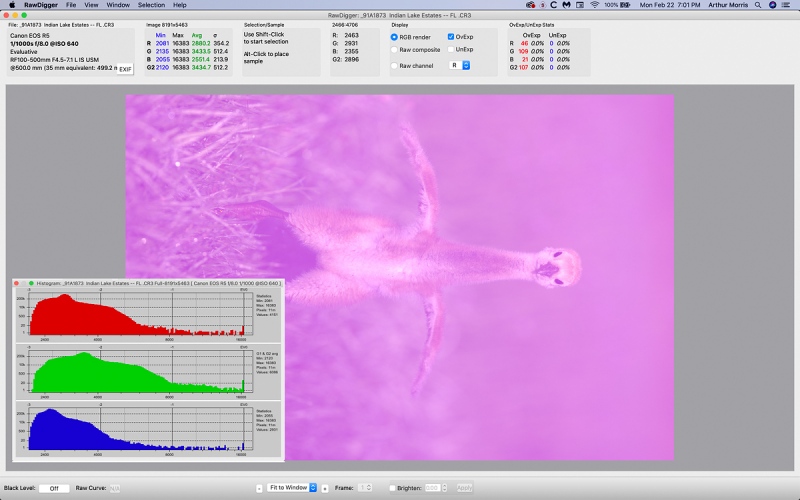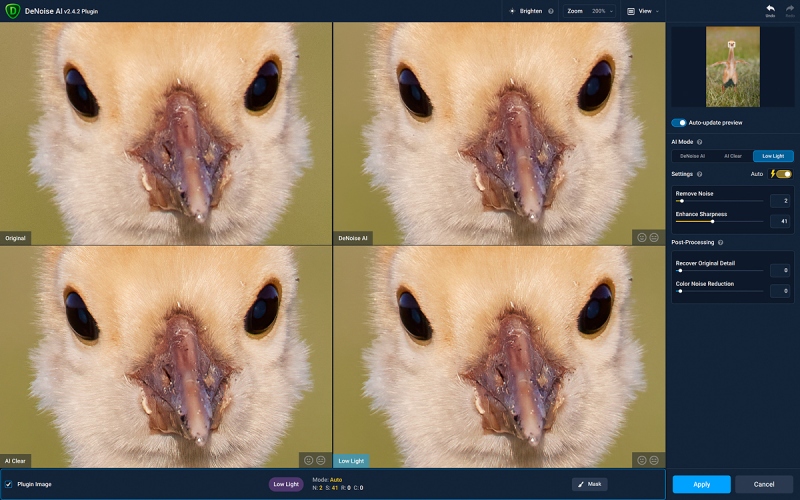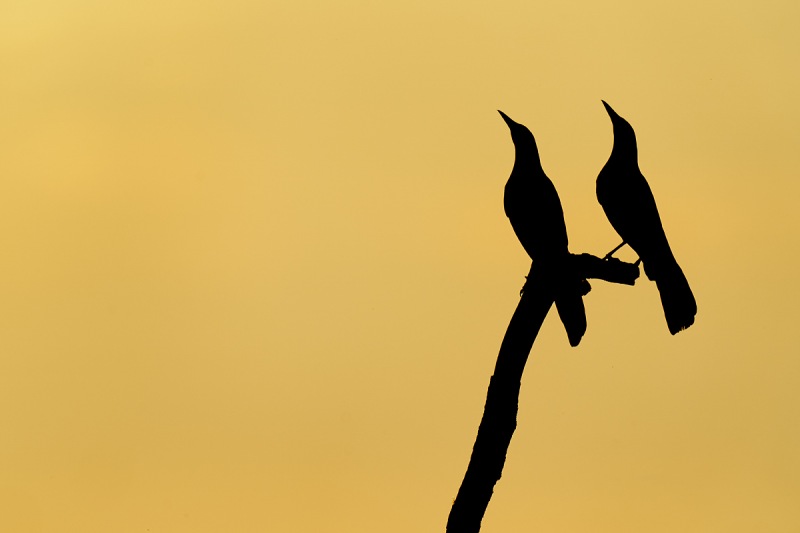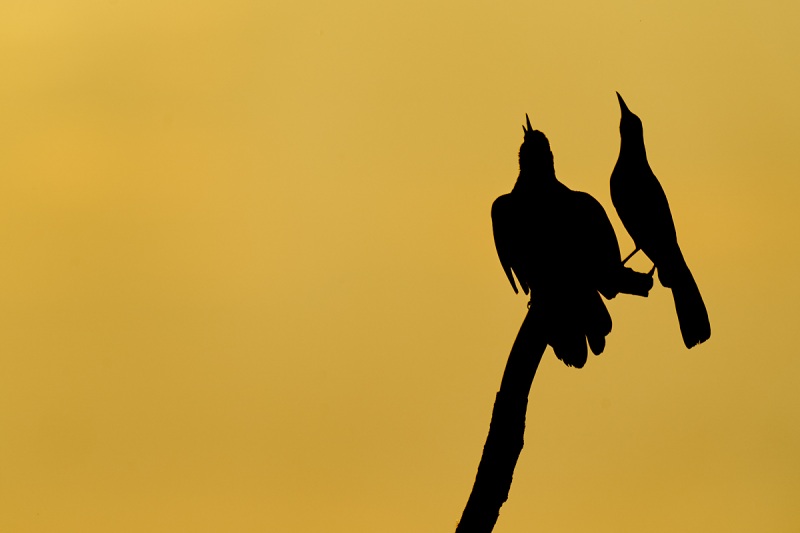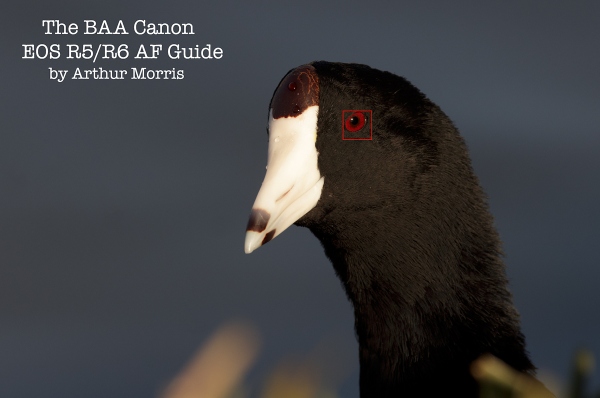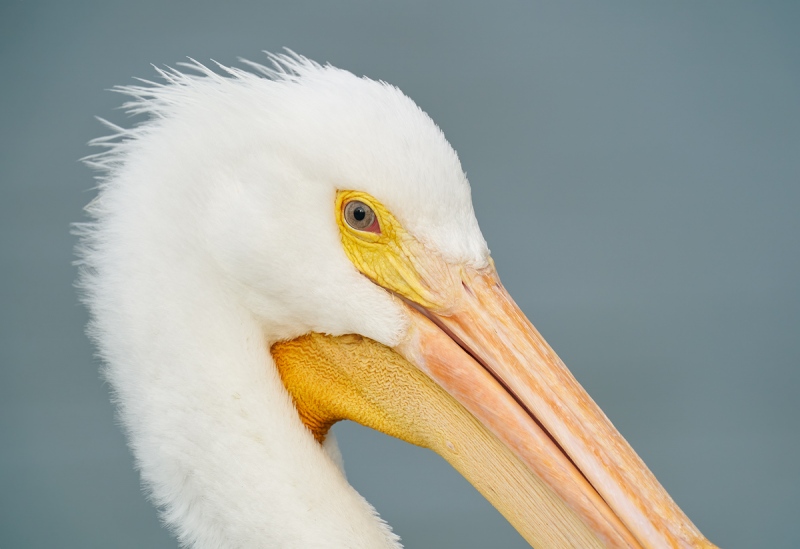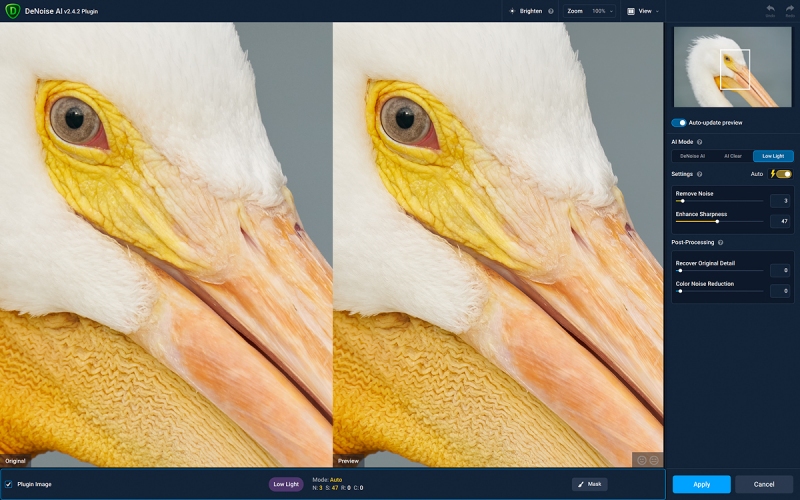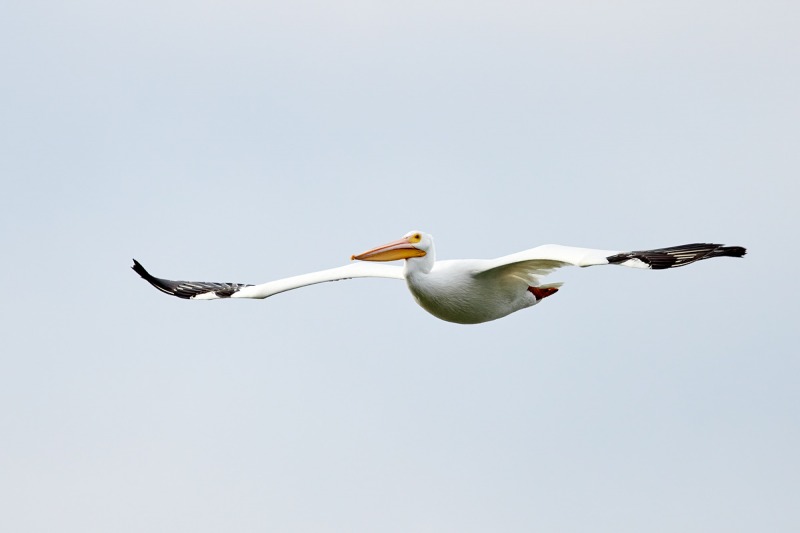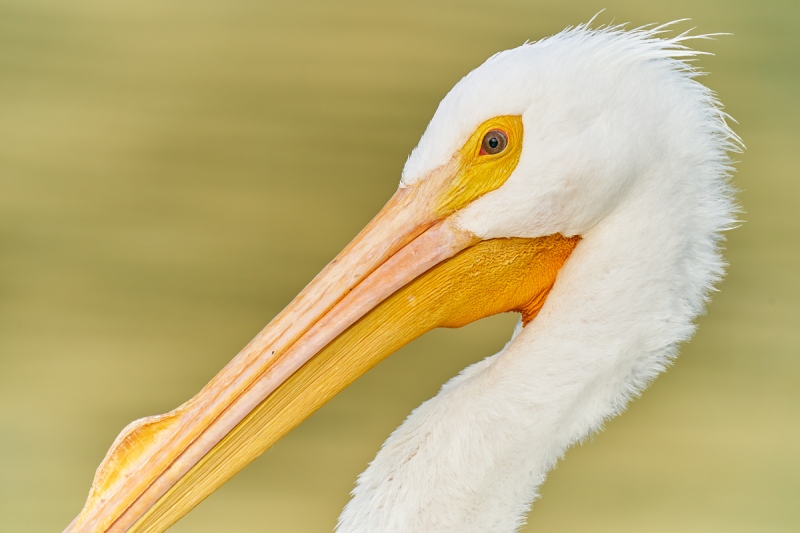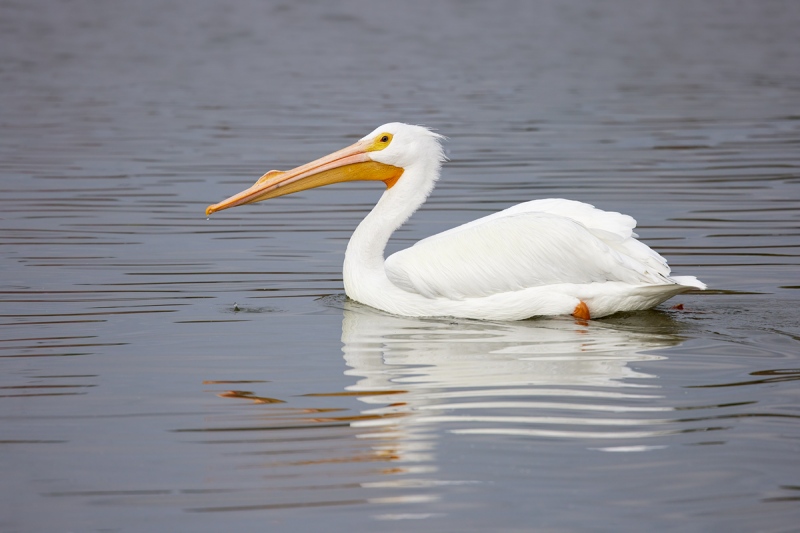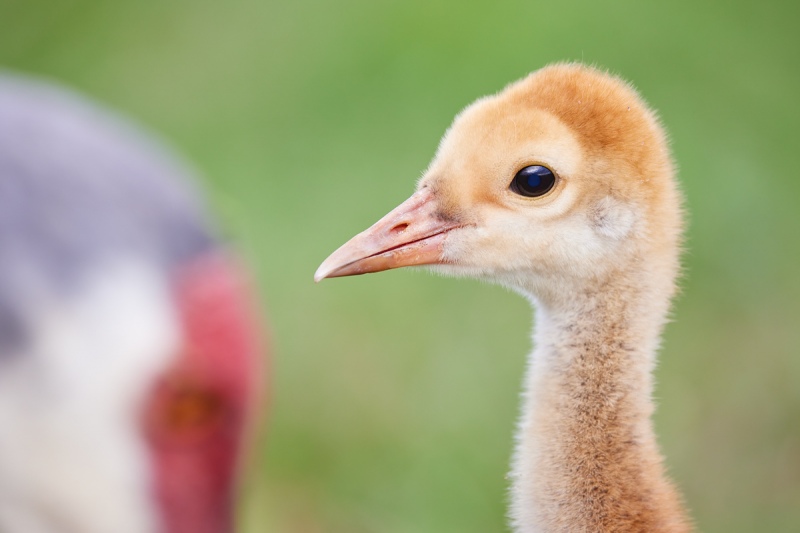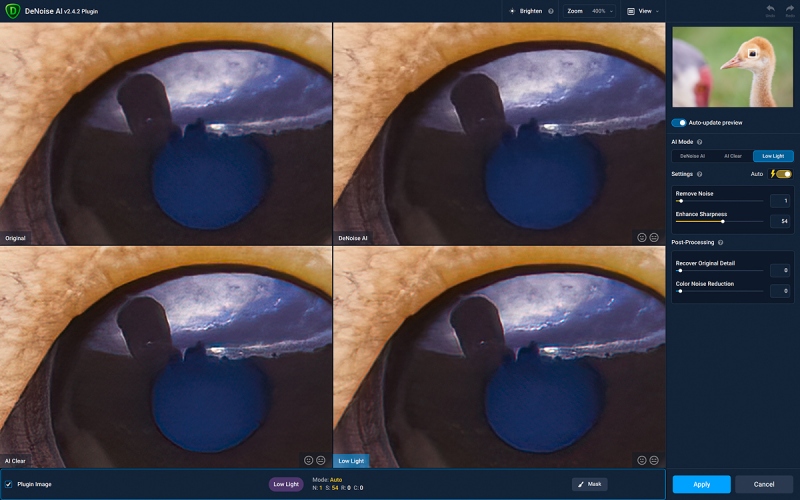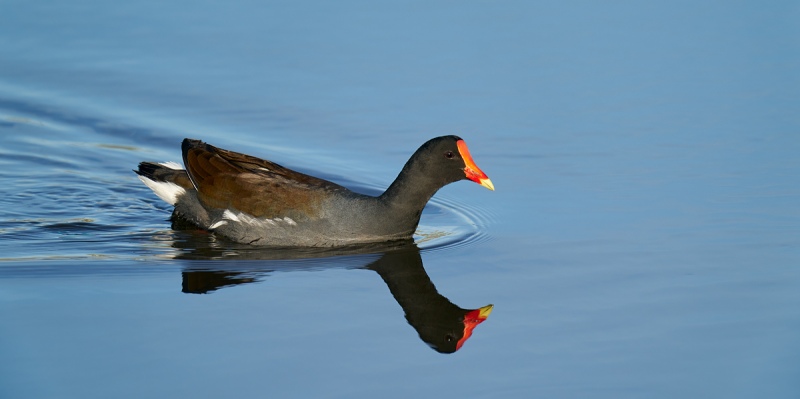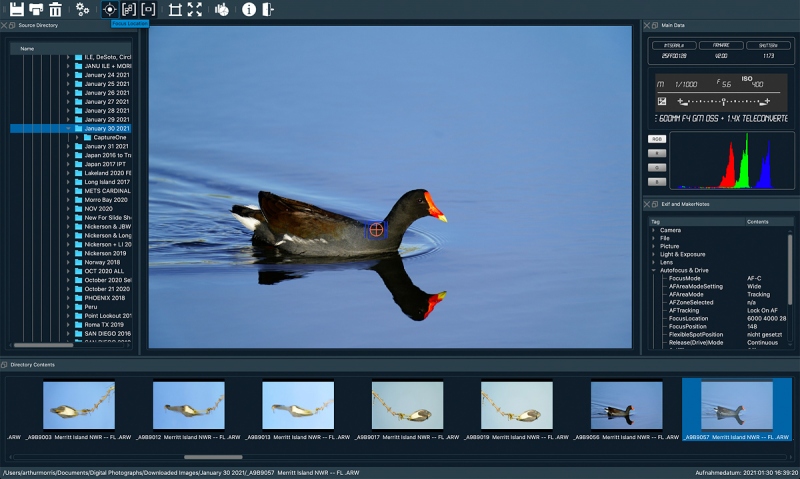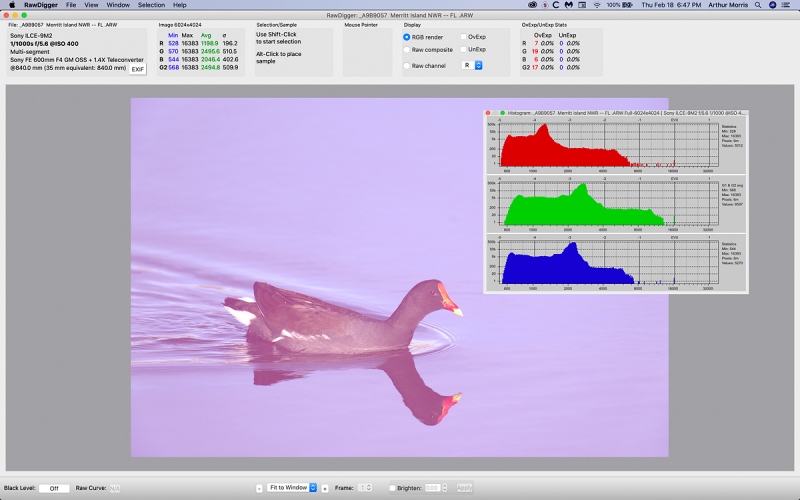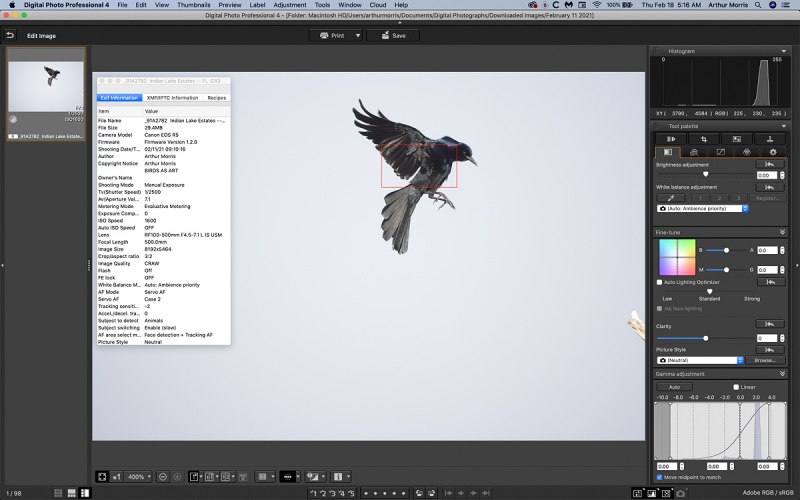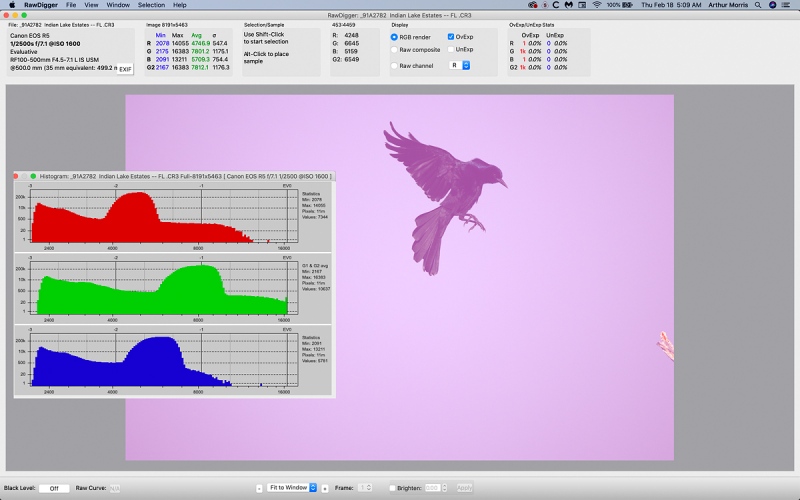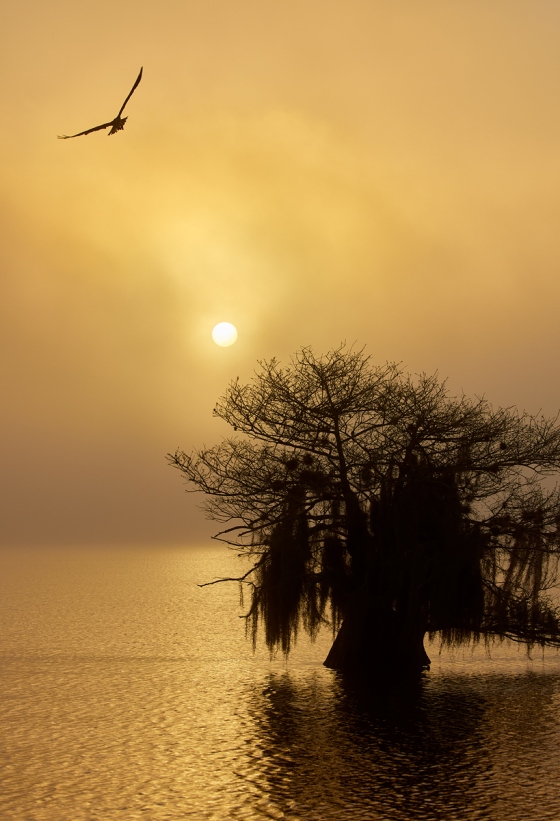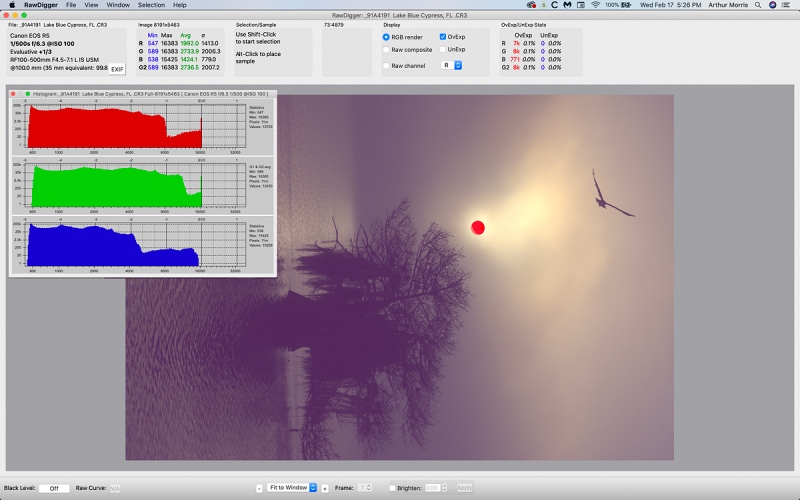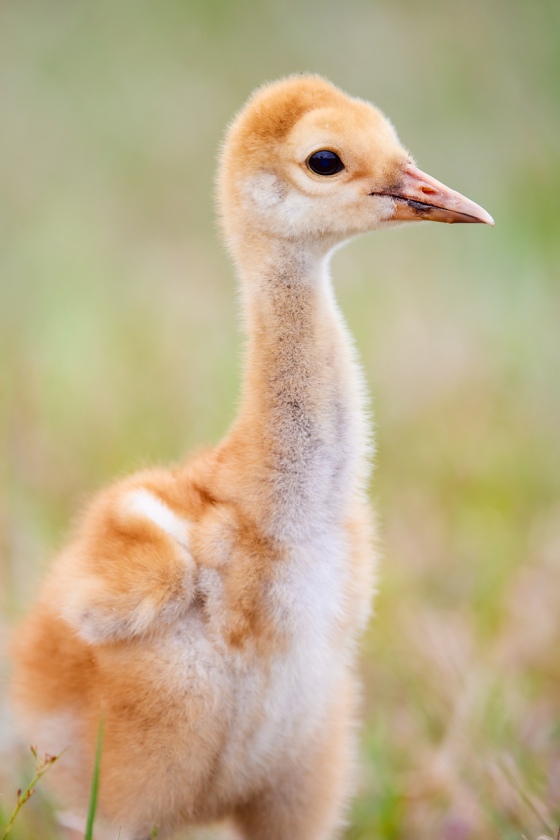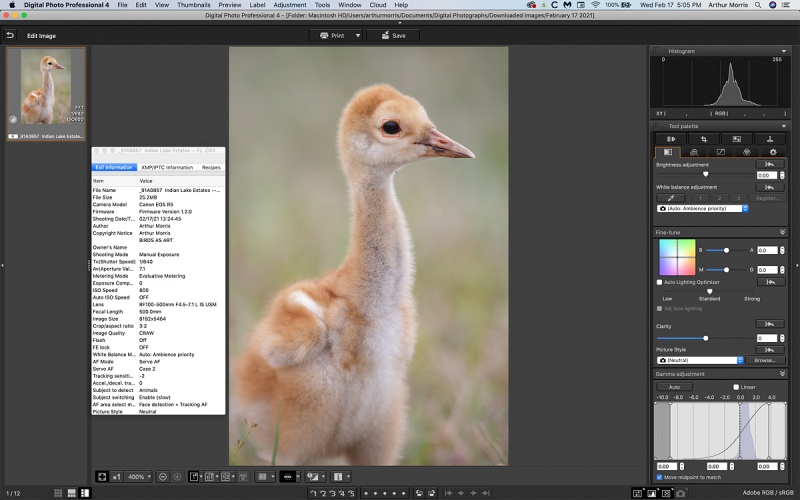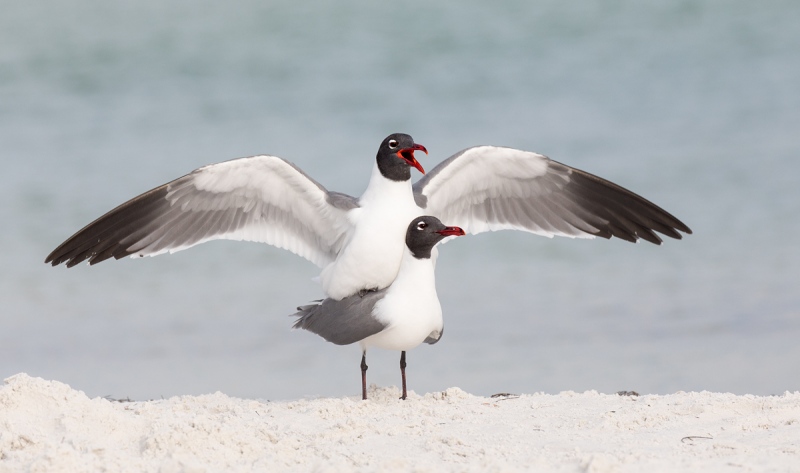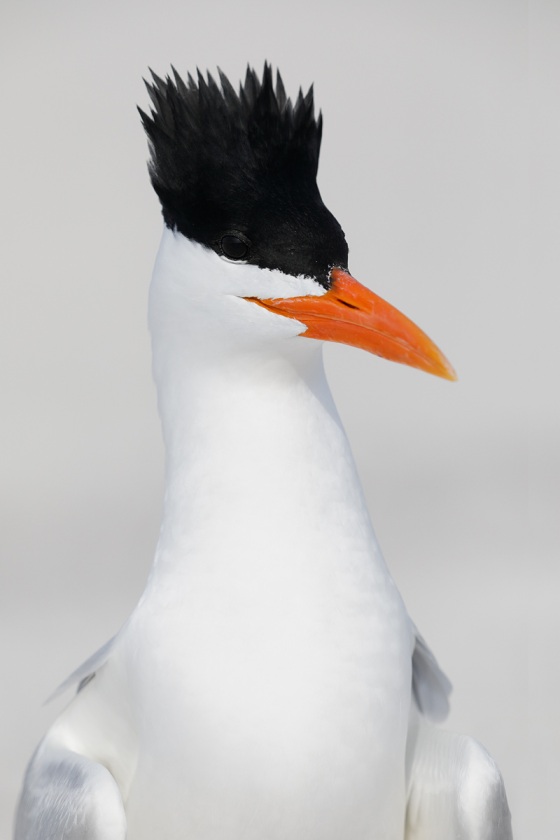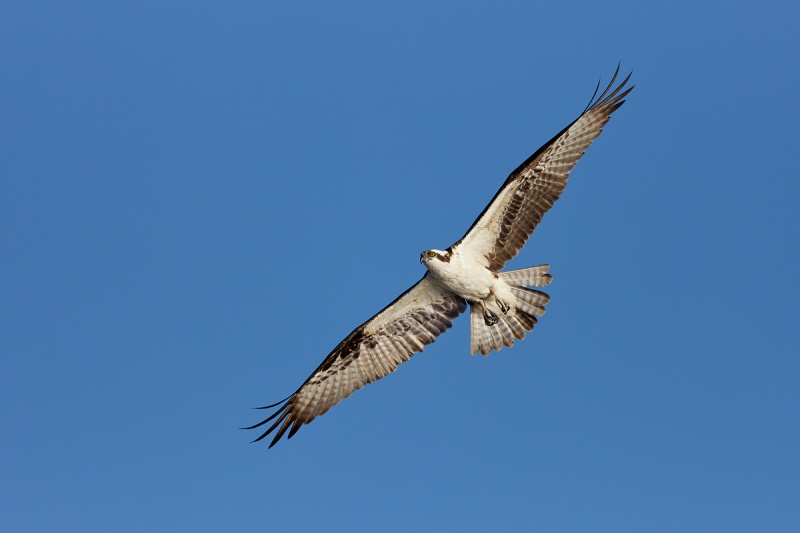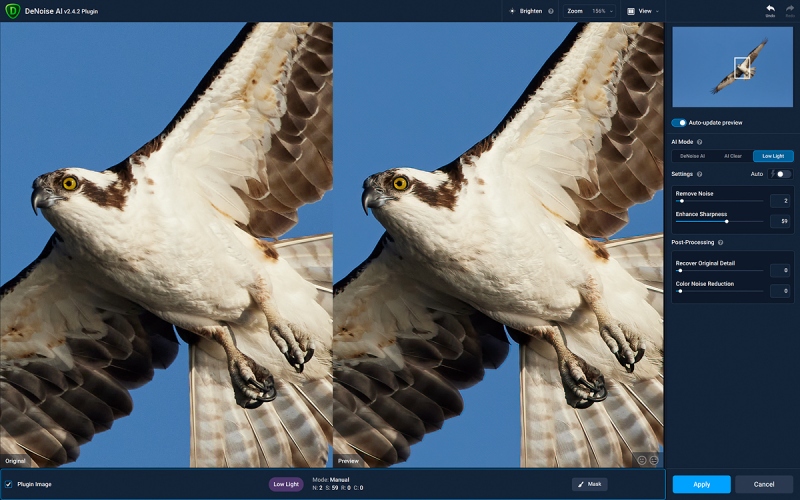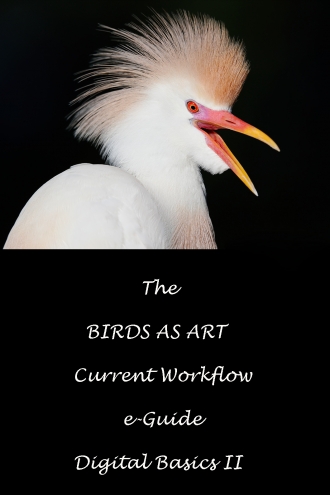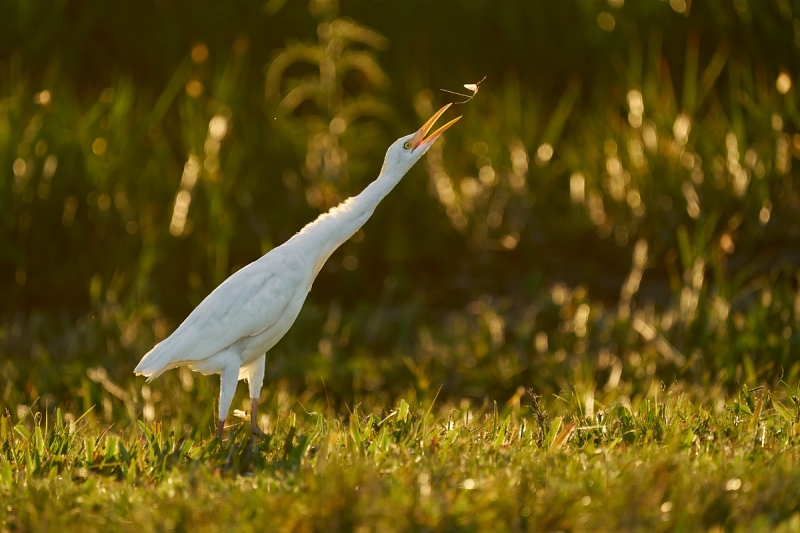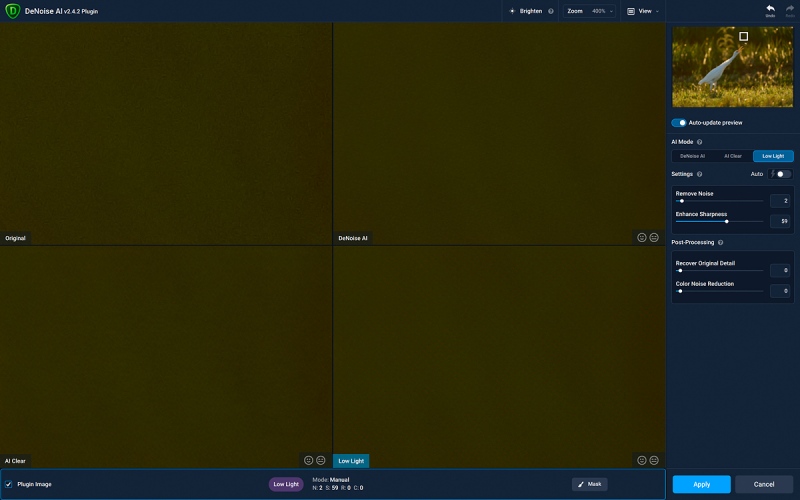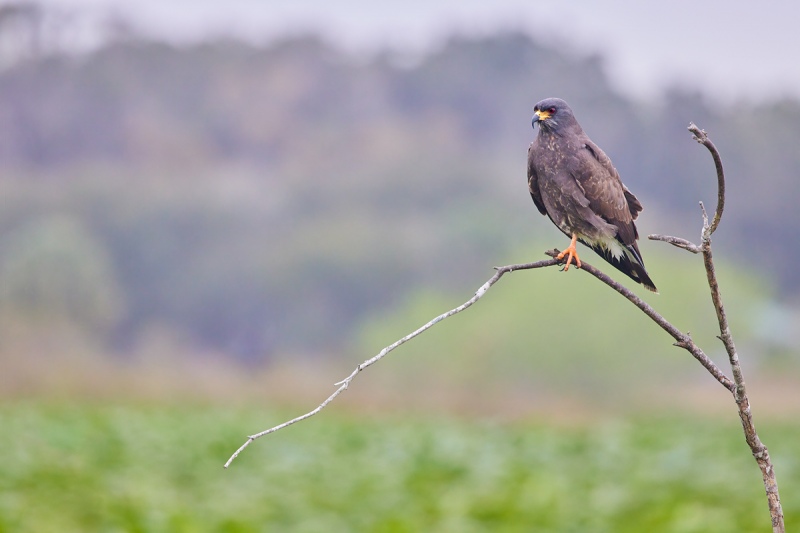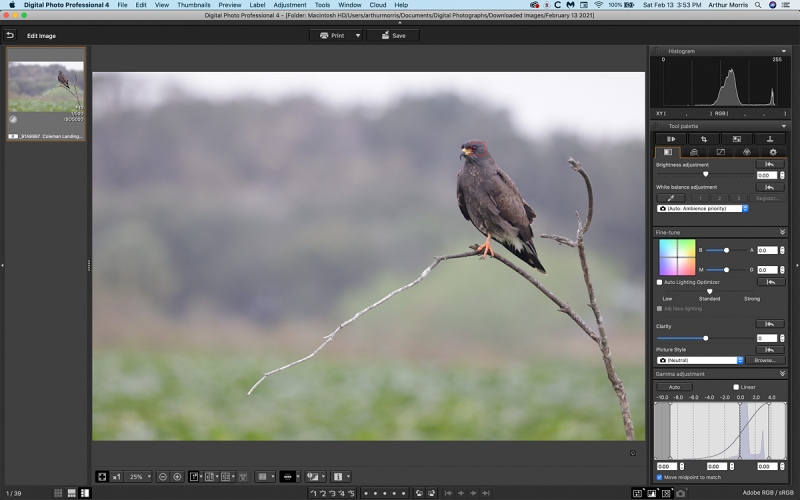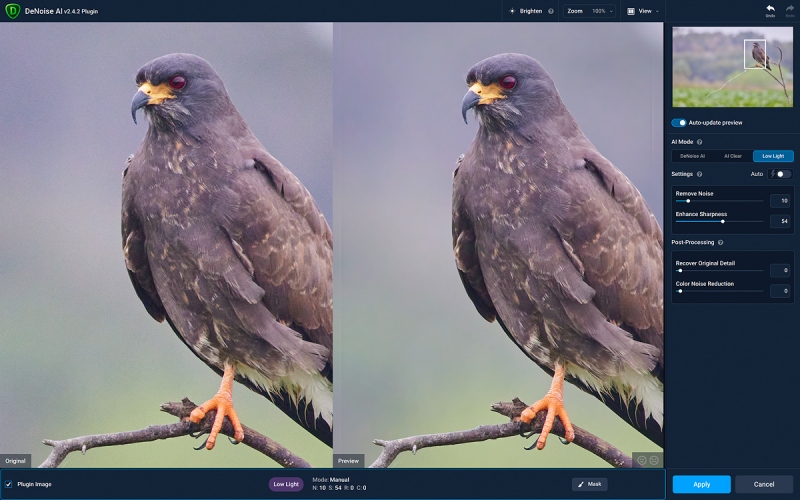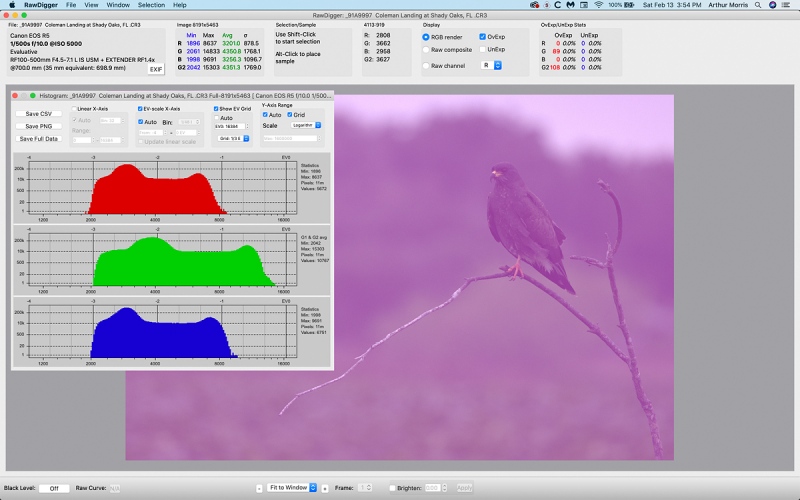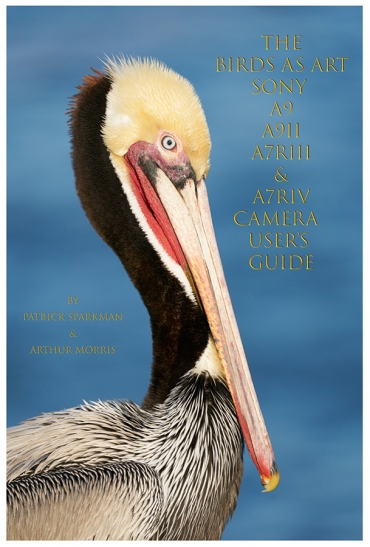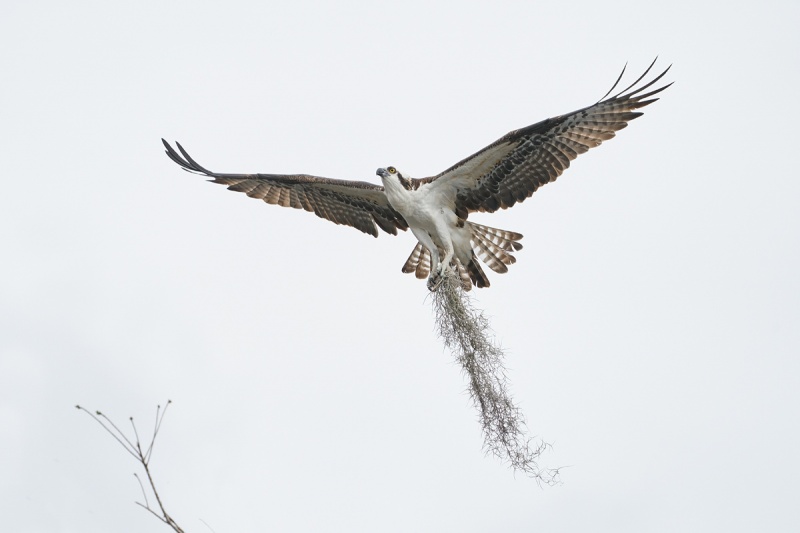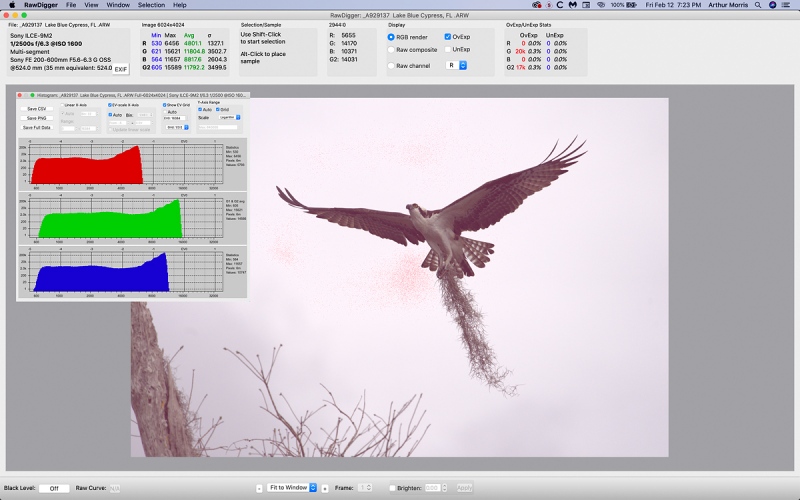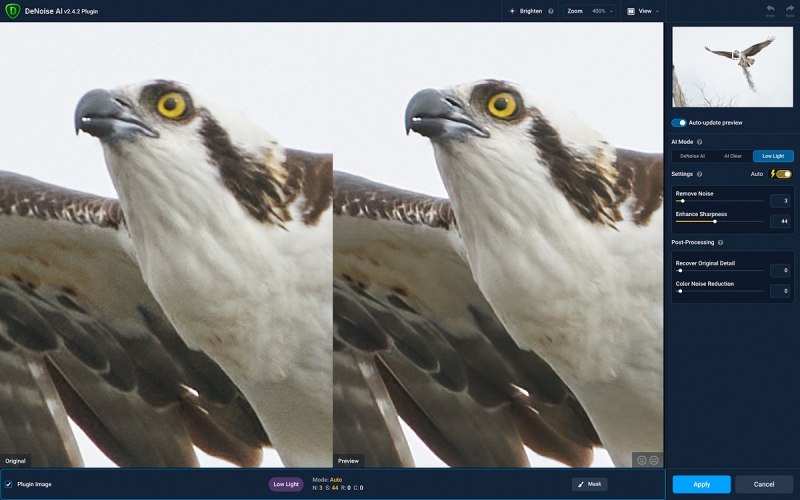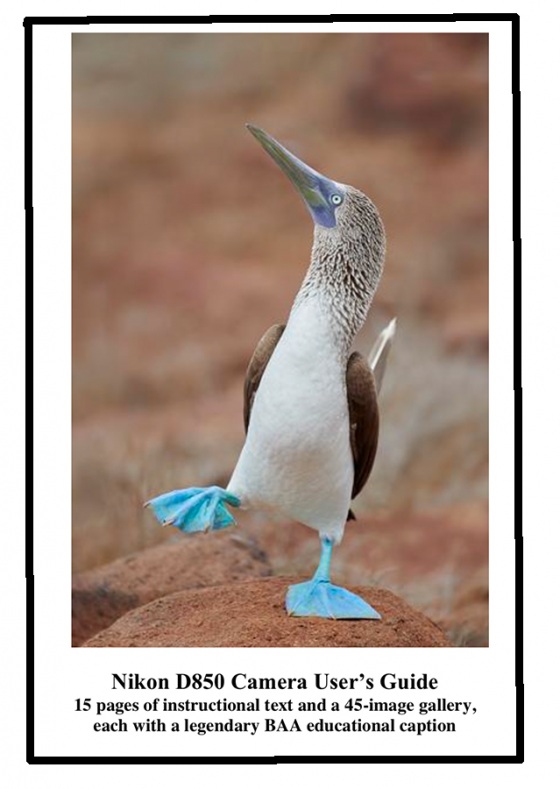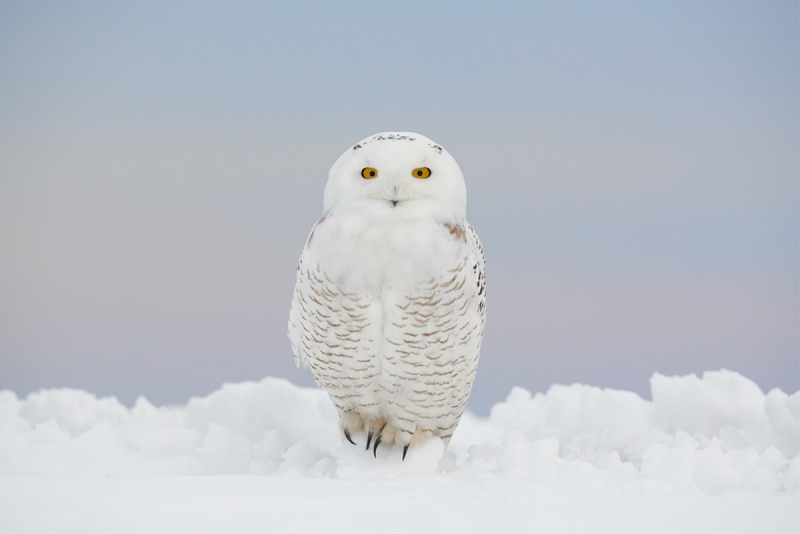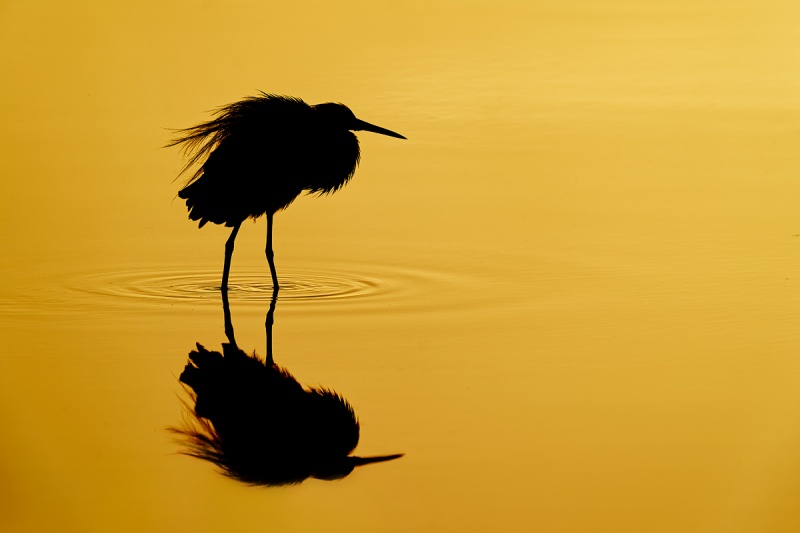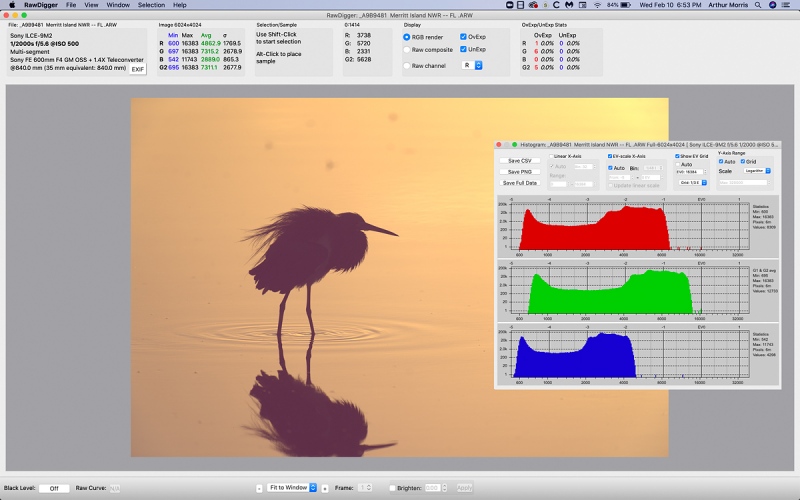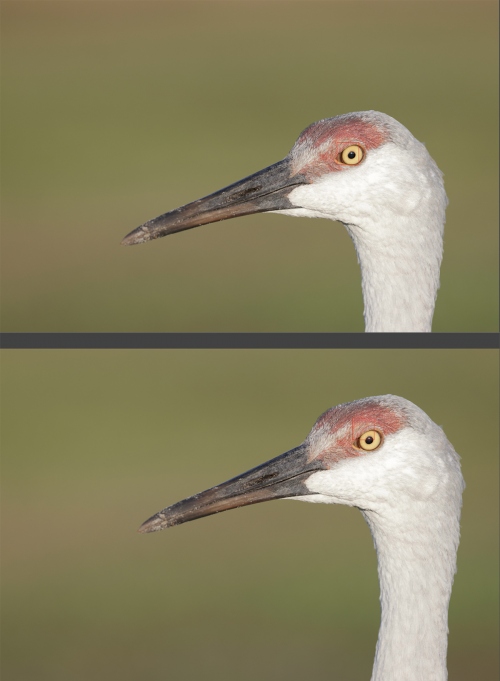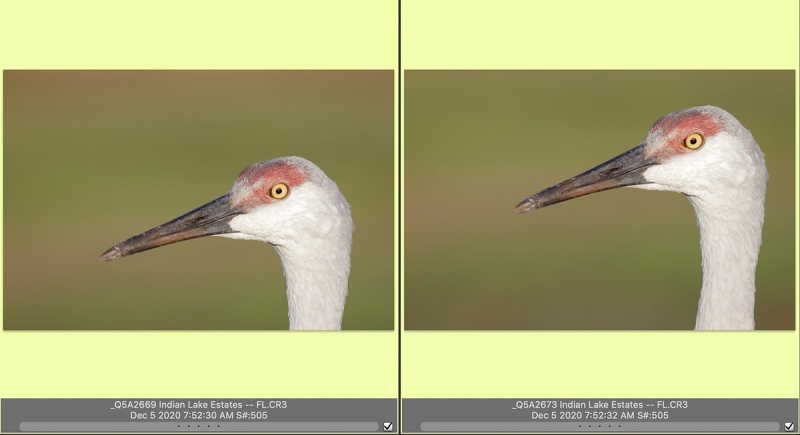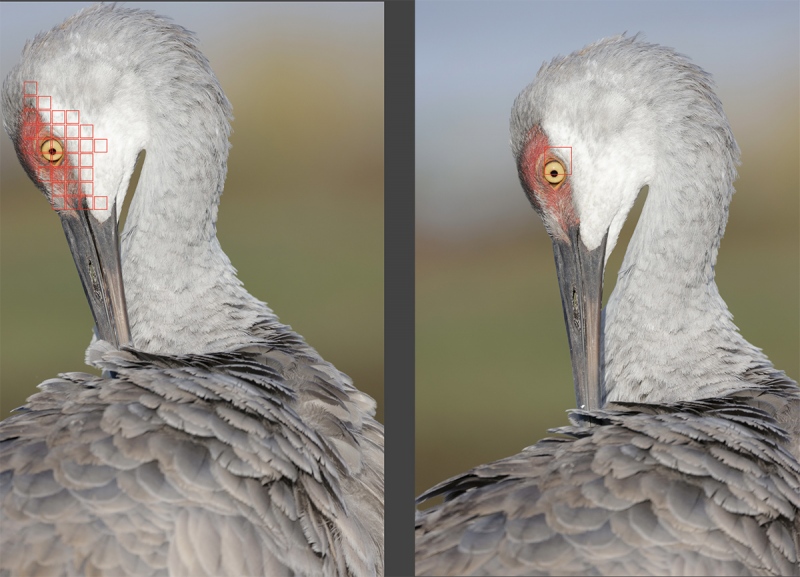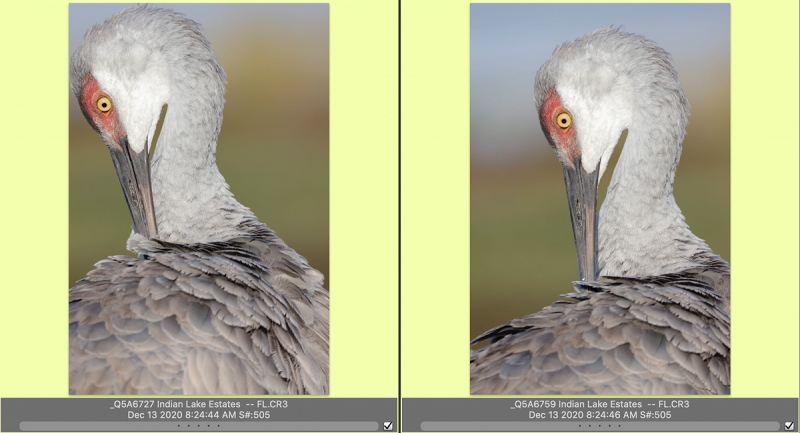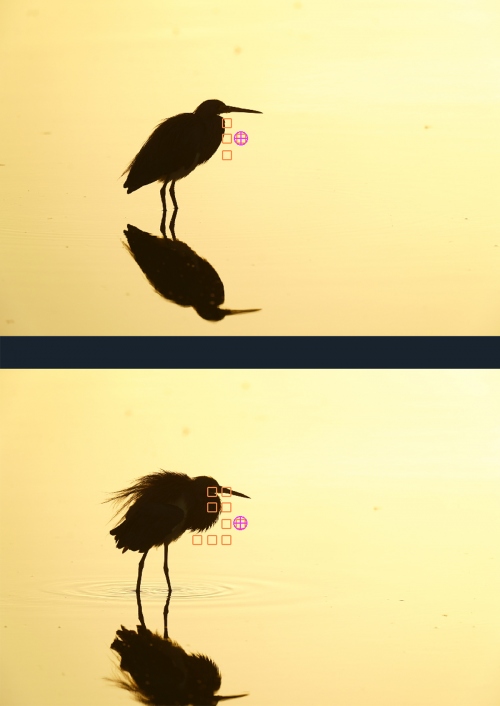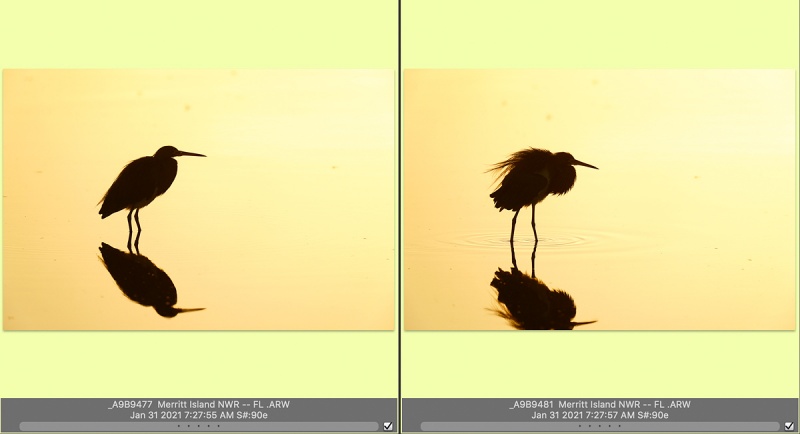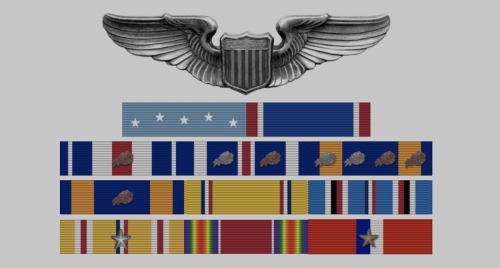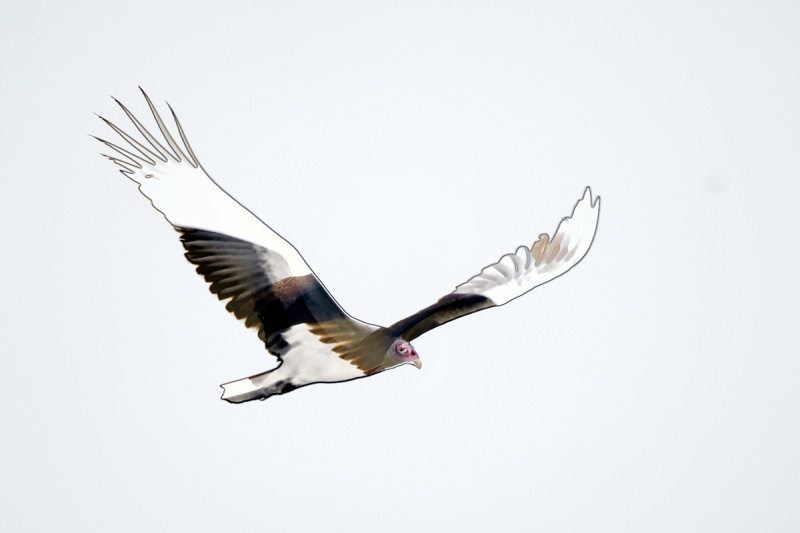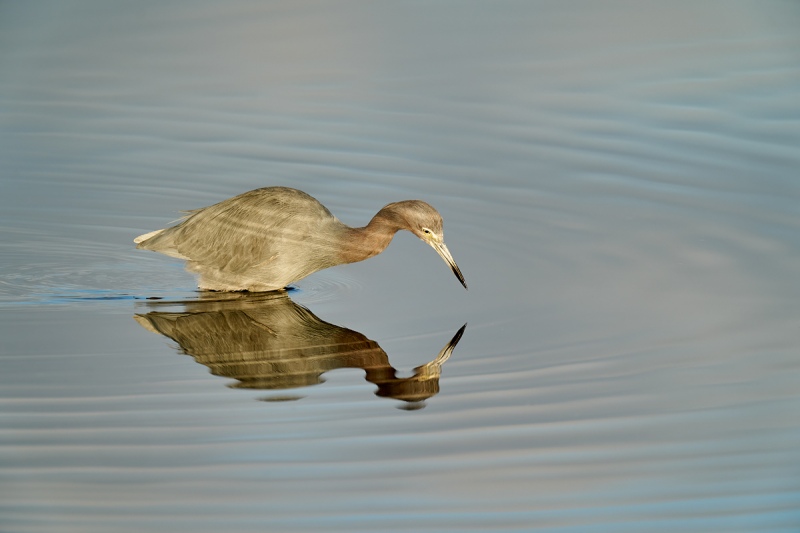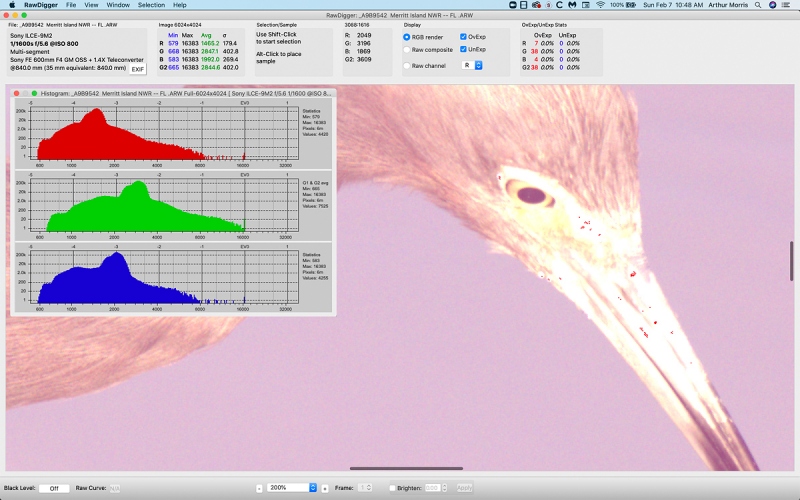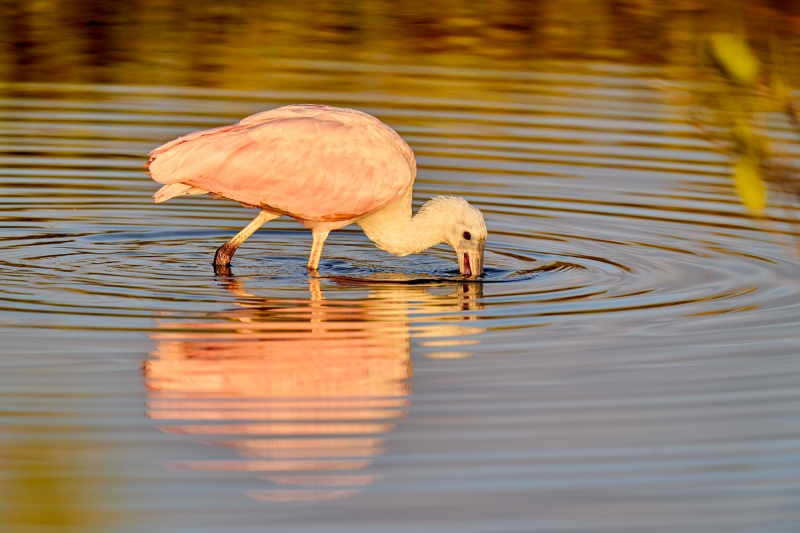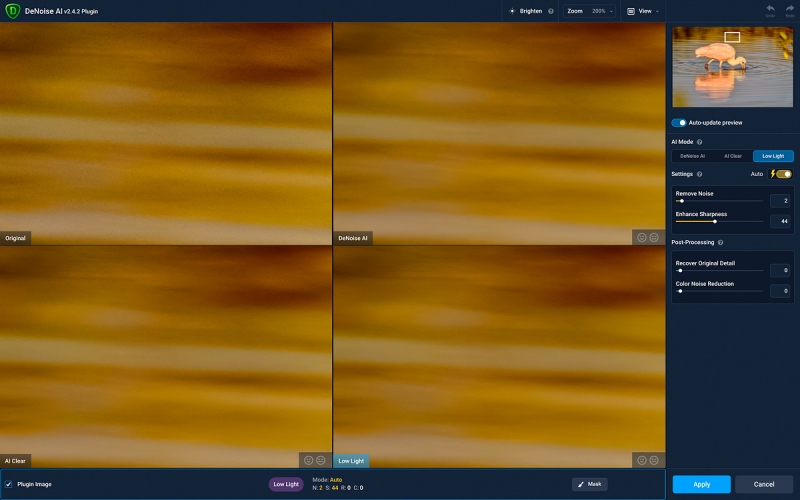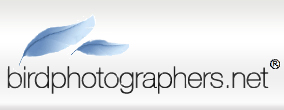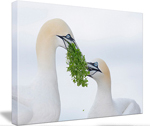February 26th, 2021 What’s Up?
Me, early, on the way to Fort DeSoto on Friday morning for a busman’s holiday.
Photography on Thursday morning at ILE was fair. I did some of the larger crane chicks. They act as if I do not exist. They were hanging in a spot where the grass was too high. I did some Cattle Egret flight from the car, got one good one, and continued to learn about R5 AF.
Speaking of the R5, I am pretty much finished with the guide, but for the gallery and the section on MY MENU. I will be sending out a few review copies very soon and should have the guide available in the store by the end of next week the latest.
The forecast for Thursday night is looking very good: clear with northeast winds. I will be heading down at about 6pm and hope to be sound asleep by 7pm so that I am well rested for the drive to Fort DeSoto.
The weekend weather for DeSoto is still looking excellent. If you would like to join me for one or more inexpensive In-the-Field Instructional sessions, please contact me ASAP via e-mail or try me on my cell at 863-221-2372. Saturday morning is looking perfect.
I was glad to learn that Morris Herstein sold his Venus Optics Laowa 15mm f/4 Macro Lens for Canon EF within hours of it being listed on Thursday.
Today is Friday 26 February and I hope that you have a great day wherever you are.
This blog post took less than an hour to prepare and makes sixty-eight days in a row with a new one. Please remember …
Please Remember
With income from IPTs now at zero, please, if you enjoy and learn from the blog, remember to use one of my two affiliate programs when purchasing new gear. Doing so just might make it possible for me to avoid having to try to get a job as a Walmart greeter and will not cost you a single penny more. And if you use Bedfords and remember to enter the BIRDSASART code at checkout, you will save 3% on every order and enjoy free second-day air shipping. In these crazy times — I am out at least forty to sixty thousand dollars so far due to COVID 19 (with lots more to come) — remembering to use my B&H link or to shop at Bedfords will help me out a ton and be greatly appreciated. Overseas folks who cannot order from the US because of import fees, duties, and taxes, are invited to help out by clicking here to leave a blog thank you gift if they see fit.
Wanted to Buy
If you have a Canon EF 100-400mm f/4.5-5.6L IS II USM lens that you would like to part with, please contact me via e-mail. I now have two interested buyers.
|
|
|
All of the images were created at Fort DeSoto in April or early May. Click on the card to enjoy a larger version.
Fort DeSotoIPT card A
|
Fort DeSoto Spring IPT #1
Fort DeSoto Spring IPT #1. 3 1/2 DAYS. SAT 10 APR thru the morning session on TEUS 13 APR 2021. $1499 includes three lunches. Limit: 6. Openings 5.
While DeSoto is one of the rare photo hotspots with the potential to be great any day of the year, it absolutely shines in spring. Many of the wading birds and shorebirds are in full breeding plumage. The terns and gulls are courting and copulating. We will have lots of flight photography opportunities. Did I mention that many of the birds are silly tame?
A $499 deposit is required to hold your spot for this IPT. You can send a check (made out to “BIRDS AS ART) to us here: BIRDS AS ART, PO Box 7245, Indian Lake Estates, FL, 3385, or call Jim or Jennifer at the office with a credit card at 863-692-0906. Your balance, payable only by check, is due immediately after you sign up. If you have any questions, please feel free to contact me via e-mail. If you cancel due to COVID 19 concerns, all of your payments will be refunded.
|
|
|
All of the images were created at Fort DeSoto in April or early May. Click on the card to enjoy a larger version.
Fort DeSoto IPT card B
|
Fort DeSoto Spring IPT #2
Fort DeSoto Spring IPT #2. 3 1/2 DAYS. MON 26 APR thru the morning session on THURS 29 APR 2021. $1499 includes three lunches. Limit: 6.
Not only am I conversant in all three major camera systems used in the US — Nikon, Canon, and SONY (sorry Andy Rouse …), I have used all three within the past four years. Those include both SONY and Canon mirrorless. On both of these IPTs you will learn how to get the best exposure, how to get the most out of your AF system, and how to get close to free and wild birds. And tons more.
A $499 deposit is required to hold your spot for this IPT. You can send a check (made out to “BIRDS AS ART) to us here: BIRDS AS ART, PO Box 7245, Indian Lake Estates, FL, 3385, or call Jim or Jennifer at the office with a credit card at 863-692-0906. Your balance, payable only by check, is due immediately after you sign up. If you have any questions, please feel free to contact me via e-mail. If you cancel due to COVID 19 concerns, all of your payments will be refunded.
|
|
|
All of the images were created at Fort DeSoto in April or early May. Click on the card to enjoy a larger version.
Fort DeSoto IPT card C
|
Fort DeSoto Spring IPTs Expected Species
With any luck, we should get to photograph the following species: Laughing, Ring-billed, Herring, and Lesser Black-backed Gull; Royal, Sandwich, and Forster’s Tern: Great, Snowy, and white and dark morph Reddish Egret and Great Blue, Little Blue, and Tricolored Heron; Yellow-crowned Night-Heron, Wood Stork, Roseate Spoonbill, and Brown Pelican. We will see and photograph lots of shorebirds including American Oystercatcher, Black-bellied, Wilson’s, Semipalmated, Snowy, and Piping Plover, Marbled Godwit, Willet, Dunlin, Red Knot, Sanderling, and Western and possibly White-rumped Sandpiper.
Sign up for both IPTs and enjoy a $200 discount. Most of us will be staying in nearby Gulfport.
Image Perspective Question
In a recent Fort DeSoto in Spring! Announcing Two DeSoto IPTs. New and Selected Used Gear Listings. The Under-Appreciated Laughing Gull. And an Image Perspective Question blog post here, I asked, with regards to the image above: Why would today’s featured image have been twenty times better if I had gotten down on my belly?
Kudos to Jeff Walters, the only one to take a stab at the question when he left this comment:
You would get more blue sky in the background had you gotten on your belly and may have eliminated the dark spot in the foreground.
His answer was correct in part (there is no sky in the image), but he missed the two most important reasons:
#1 (by far). Had I gotten down on my belly all of the butt-ugly detail and texture in the sand would have disappeared; gone, goodbye, forget it. Imagine that you are looking down at a patterned tablecloth. You would see the entire pattern. Yes the foreground and distant background would have been nicely out-of-focus, but you would still have seen the pattern. Now imagine that you kneel down so that your eyes are at table-top level? Would you see a shred of the pattern? No, not at all.
#2: Being down at the level of the birds, the image would have had a much more intimate feel to it, as if you were part of their world,
#3: Note: the blue strip at the top of the image was actually the Gulf, not the sky. So had I gotten wet and sandy, we would have had a lot more of the blue Gulf water along with some probably grey sky. But again, all of the ugly detail in the sand would have been gone.
I plan on getting down and dirty whenever possible at DeSoto.
Typos
In all blog posts and Bulletins, feel free to e-mail or to leave a comment regarding any typos or errors.
February 25th, 2021 This Just In!
I took one look at the weather forecast for St. Petersburg for the next few days: clear with southeast winds for Friday and Saturday mornings switching to southwest in the afternoons, and booked an AirBnB for two nights. Sunday morning is looking good also with partly cloudy skies and south winds. I will be driving over in the dark on Friday morning — leaving ILE at about 4:30am, and returning home after shooting on Sunday morning.
If you would like to join me for one or more inexpensive In-the-Field Instructional sessions, please contact me immediately via e-mail or try me on my cell at 863-221-2372. There is room for you on the couch if you would like to stay a night or two.
With love, artie
February 25th, 2021 What’s Up?
I had hoped for some huge flocks of ibis in flight at Circle B Bar Preserve before the sun came up and there were. But they were about two miles distant. I did make some half-way decent blurs. I headed for my favorite morning American White Pelican spot and did quite well. I was so busy driving and answering e-mails that I did not touch the R5 Camera User’s e-Guide yesterday. I should have a ton of time to work on it today.
Jim and I went down to the lake at 3:30pm to check on the two crane families. All four chicks were safe and accounted for. Last year, only two Sandhill Crane chicks survived. That out of the six that hatched along the lakefront. The wind was from the northeast, perfect for sunset silhouette photography. I went back down at 5:50pm. There was some nice color brewing, but the wind had switched to the southwest so I turned around and went back home.
Today is Thursday 25 February 2021. The forecast for this morning is for clear skies with a gentle NW breeze. Though that is not good for bird photography, I will head down early to check on the little cranes and see what else is about.
If you would like to explore the possibility of a morning In-the-Field Instructional session here at ILE for crane chicks, or at Lakeland for American White Pelicans, please contact me via e-mail or try me on my cell at 863-221-2372.
As noted below, Bedfords is getting a considerable number of Canon R5 and R6 bodies very soon. The RF 100-500s and 70-200s are, however, currently very difficult to get. My best advice is to stop what you are doing and order yours now to get on the list and get your new lens faster. And be sure of course to use the BIRDSASART code at checkout to save 3% and enjoy free second-day air Fed-Ex shipping.
I was glad to learn that Ted Keltz sold his Canon 7D Mark II and that the sale of Monte Brown’s Canon 100-400 II became pending within hours.
This blog post took more than two hours to prepare and makes sixty-seven days in a row with a new one. Please remember …
Please Remember
With income from IPTs now at zero, please, if you enjoy and learn from the blog, remember to use one of my two affiliate programs when purchasing new gear. Doing so just might make it possible for me to avoid having to try to get a job as a Walmart greeter and will not cost you a single penny more. And if you use Bedfords and remember to enter the BIRDSASART code at checkout, you will save 3% on every order and enjoy free second-day air shipping. In these crazy times — I am out at least forty to sixty thousand dollars so far due to COVID 19 (with lots more to come) — remembering to use my B&H link or to shop at Bedfords will help me out a ton and be greatly appreciated. Overseas folks who cannot order from the US because of import fees, duties, and taxes, are invited to help out by clicking here to leave a blog thank you gift if they see fit.
Wanted to Buy
If you have a anon EF 100-400mm f/4.5-5.6L IS II USM lens that you would like to part with, please contact me via e-mail as I have an interested buyer.
The BAA Used Gear Page
The Used Gear page continues to be very active. The BAA Used Gear Page is the place to sell your used photographic equipment. We will help you to get your gear sold quickly for 20 to 60% or more than what the big guys are offering … Doubt me? Check out the Recent Sales list for the past eleven months at the bottom of the page.
Canon EOS 5D Mark III dSLR Converted to Infrared (with Extras)
BIRDS AS ART friend and multiple IPT veteran Morris Herstein is offering a Canon EOS 5D Mark III dSLR converted to infrared (830 nanometers) by Life Pixel in excellent plus condition with extras for $999.00. The sale include two Canon LP-E6N batteries, the charger, the front body cap, two Lexar 128GB 1066X flash cards, and insured ground shipping via major courier to lower-48 US addresses only. Your item will not ship until your check clears unless other arrangements are made.
Please contact Morris via e-mail.
When I shot Canon exclusively, I had a ton of fun making landscapes, tree-scapes, and cloud-scapes with a 5D Mark II that had been converted to infrared. The 5D III is a step up from that. These infrared-converted bodies pair well with the 24-105 and any of the 70-200s. artie
Venus Optics Laowa 15mm f/4 Macro Lens for Canon EF
Sold first day of listing!
BIRDS AS ART friend and multiple IPT veteran Morris Herstein is offering a Venus Optics Laowa 15mm f/4 Macro Lens for Canon EF in new condition for a very low $279.00. The sale include the front and rear caps and insured ground shipping via major courier to lower-48 US addresses only. Your item will not ship until your check clears unless other arrangements are made.
Please contact Morris via e-mail.
This is a fully manual super-wide angle lens that focuses down to life-size. It sells new for $499.00. artie
Before now, wide-angle macro required the use of extension tubes and other workarounds, but now the Laowa 15mm Macro offers true 1:1 magnification without the hassle. The ultra-wide perspective on full-frame cameras allows users to get exceptionally close to their subjects with a minimum focus distance of just 4.7″, and have them fill the frame, while still capturing the background.
Optically, it is designed to minimize distortion that plagues wide-angle lenses with the use of an advanced 12-element-in-9-group construction with one extra-low dispersion and three high-refractive elements. A multi-layer low-reflective coating further improves image quality by reducing the appearance of flare and ghosting. Also, when used on APS-C cameras, or in crop modes, the lens offers +/- 6mm of vertical shift which can help correct for perspective when shooting objects such as buildings.
Full manual operation is required with this lens through the use of a physical aperture ring with a range of f/4 to f/32 and a large focusing ring. A flat front element provides room for a 77mm front filter thread for using a selection of specialized filters to enhance your scene. Additionally, it has a near circular 14-blade diaphragm for smooth out of focus elements and comes with a lens hood. B&H
FlexShooter Pro Tripod Head
BIRDS AS ART friend and multiple IPT veteran Morris Herstein is offering a barely used FlexShooter Pro head in for a BAA record-low $498.00. The sale includes insured ground shipping via major courier to lower-48 US addresses only. Your item will not ship until your check clears unless other arrangements are made.
Please contact Morris via e-mail.
The FlexShooter Pro is a ballhead that thinks and acts like a gimbal head. Thanks to the bi-directional clamp, it is great for lenses short and long. Once your rig is set up properly, long lenses stay right where you point them without your having to lock up the head! Where you point the lens is what you get. That thanks to the patented counter-balanced spring system design. I predicted that these heads would take the world of nature photography by storm. And they have. They sell new for $599.00. artie
|
|
RawDigger e-Guide with Two Videos
|
The RawDigger e-Guide with Two Videos
by Arthur Morris with Patrick Sparkman
The RawDigger e-Guide was created only for serious photographers who wish to get the absolute most out of their raw files.
Patrick and I began work on the guide in July 2020. At first we struggled. We asked questions. We learned about Max-G values. We puzzled as to why the Max G values for different cameras were different. IPT veteran Bart Deamer asked lots of questions that we could not answer. We got help from RawDigger creator Iliah Borg. We learned. In December, Patrick came up with an Adapted Histogram that allows us to evaluate the exposures and raw file brightness for all images created with all digital camera bodies from the last two decades. What we learned each time prompted three complete beginning to end re-writes.
The point of the guide is to teach you to truly expose to the mega-Expose-to-the-Right so that you will minimize noise, maximize image quality, best utilize your camera’s dynamic range, and attain the highest possible level of shadow detail in your RAW files in every situation. In addition, your properly exposed RAW files will contain more tonal information and feature the smoothest possible transitions between tones. And your optimized images will feature rich, accurate color.
We teach you why the GREEN channel is almost always the first to over-expose. We save you money by advising you which version of RawDigger you need. We teach you how to interpret the Max G values for your Canon, Nikon, and SONY camera bodies. It is very likely that the Shock-your-World section will shock you. And lastly — thanks to the technical and practical brilliance of Patrick Sparkman — we teach you a simple way to quickly and easily evaluate your exposures and raw file brightness using an Adapted RawDigger histogram.
The flower video takes you through a session where artie edits a folder of images in Capture One while checking the exposures and Max-G values in RawDigger. The Adapted Histogram video examines a series of recent images with the pink histograms and covers lots of fine points including and especially how to deal with specular highlights. The directions for setting up the Adapted Histogram are in the text.
If we priced this guide based on how much effort we put into it, it would sell it for $999.00. But as this guide will be purchased only by a limited number of serious photographers, we have priced it at $51.00. You can order yours here in the BAA Online Store.
Canon EOS R5 Camera User’s e-Guide
As most of you know, I have been working on a complete BAA Canon EOS R5 Camera User’s e-Guide. Because the camera and the Menus are so complex, this has required a lot of research, a lot of time, and a lot of effort (and will continue to do so until it is complete). It should be finished any day now. The final update of the R5/R6 AF e-Guide has become part of the complete Camera User’s e-Guide; it will be revised there if warranted.
The complete Camera User’s guide will sell for $75.00. Folks who purchased their Canon gear using my links will receive a $65.00 discount; the guide will cost them a nominal $10.00. Folks who spent more than $7500.00 on Canon mirrorless gear using either of my affiliate links (B&H or Bedfords), will receive the User’s Guide for free. Folks who purchased the R5/R6 AF e-Guide will receive a $10.00 discount on the User’s e-Guide. The best news is that the end is in sight.
Great Topaz News!
Folks who use the BAA Topaz link to purchase Sharpen AI, DeNoise AI, or the Utility Bundle (or any other Topaz plug-ins) will receive a 15% discount by entering the ARTHUR15 code at checkout. If the stuff is on sale (as it usually is), you save 15% off of the sale price! To get the discount you must use my link and you must enter the discount code. Be sure to start with this link.
Those who purchase Sharpen AI, DeNoise AI, or any other Topaz plug-ins using my link and then entering the ARTHUR15 code at checkout can e-mail to request a short Getting Started with Topaz e-Guide. Please include a copy of your Topaz receipt that shows the discount. Aside from the basics, the guide explains how to install the plug-ins so that they appear in the Photoshop Filter Menu.
New and Better Bedfords Discount Policy!
You can now save 3% on all of your Bedfords photo gear purchases by entering the BIRDSASART coupon code at checkout. Your discount will be applied to your pre-tax total. In addition, by using the code you will get 2nd day air shipping via Fed Ex.
Grab a Nikon AF-S Teleconverter TC-14E III and save $14.99. Purchase a Canon EOS R5 and your discount will be $116.97. Purchase a Sony FE 600mm f/4 GM OSS lens and save a remarkable $389.94! Your Bedford’s purchase no longer needs to be greater than $1,000.00 for you to receive a discount. The more you spend, the more you save.
Money Saving Reminder
Coming Soon to Bedford’s: a truckload of Canon R5 and R6 Bodies!
Many have learned that if you need a hot photo item that is out of stock at B&H and would enjoy free second-day air shipping, your best bet is to click here, place an order with Bedfords, and enter the coupon code BIRDSASART at checkout. If an item is out of stock, contact Steve Elkins via e-mail or on his cell phone at (479) 381-2592 (Central time). Be sure to mention the BIRDSASART coupon code and use it for your online order to save 3% and enjoy free 2nd-day air shipping. Steve has been great at getting folks the hot items that are out of stock at B&H and everywhere else. The wait lists at the big stores can be a year or longer for the hard to get items. Steve will surely get you your gear long before that. For the past year, he has been helping BAA Blog folks get their hands on items like the SONY a9 ii, the SONY 200-600 G OSS lens, the Canon EOS R5, the Canon RF 100-500mm lens, and the Nikon 500mm PF. Steve is personable, helpful, and eager to please.


Gear Questions and Advice
Too many folks attending BAA IPTs (remember those?) and dozens of photographers whom I see in the field and on BPN, are–out of ignorance–using the wrong gear especially when it comes to tripods and more especially, tripod heads… Please know that I am always glad to answer your gear questions via e-mail. Those questions might deal with systems, camera bodies, accessories, and/or lens choices and decisions.
|
|
|
This image was created on Wednesday 24 February 2021 at my favorite Lakeland morning spot. I used the Induro GIT 404L/Levered-clamp FlexShooter Pro-mounted Sony FE 600mm f/4 GM OSS lens, Sony FE 1.4x teleconverter, and the blazingly fast AF King, the Sony Alpha a9 II Mirrorless Digital Camera Body. ISO 800. The exposure was determined by Zebras with ISO on the rear wheel: 1/500 sec. at f/5.6 (wide open) in Manual mode. RawDigger showed the exposure here to be perfect. AWB at 7:45am on a partly cloudy morning.
Upper Right Zone AF-C was active at the moment of exposure and performed perfectly. Click on the image to enjoy a larger version.
Image #1: American White Pelican immature in soft light
|
A Pastel Masterpiece in Simplicity …
I loved this image through the viewfinder. And it looked even better on my MacBook Pro. There’s no flying bird, and no action. There is no habitat. Simplicity can work well. I find the soft pastels magical. What do you think?
Why Zebras?
Kapil Kapre left this comment (for moderation) at the Too Cute blog post:
I have access to live zebras on my Sony, but I turn them off because they distract me. I do understand the benefit of zebras, and logically they seem like they would help a lot. But practically, how often are you in a situation where you need to quickly set a new exposure and don’t have time for a test shot? I’m sure it’s different for everyone, for me there’s always time for a quick test shot as I deliberate a bit on the composition and/or wait for a specific pose, etc. Or maybe I’m just too slow 🙂
I knew that Kapil’s question warranted a thoughtful response. I was pretty sure from his comment that he does not have the Sony Camera User’s e-Guide. I e-mailed him and confirmed that. So here goes:
Kapil, I wish that you could have been with me this morning in Lakeland photographing the American White Pelicans. The sun was going in and out every minute. Without exaggeration, I had my thumb on the big rear wheel and was changing the exposures (by changing the ISO) several times a minute. Even a shift of the bird’s head position can change the intensity of the Zebras (and require a small adjustment). Do understand that Zebras at the camera’s default settings are 100% worthless. In the aforementioned guide, we teach you exactly how to set up the Zebras and how to use them in the field. Then, in nearly all circumstances, you aim for faint Zebras.
So the answer to your question is very often! And it is not different for anyone who wants to learn to make good exposures consistently. Not to mention that when I switched over to a cormorant, a coot, or a Wood Duck, Zebras, again — set up properly, allowed me to routinely attain excellent or perfect exposures. Do understand that subjects of different tonalities require different amounts of light to be properly exposed. White subjects need less light than middle-toned subject to be properly exposed, and dark subjects need more light than middle-toned subjects to be properly exposed. Best advice on learning exposure theory is to consult the section on that topic in the original The Art of Bird Photography.
On a final note, there are times — not very often, that I turn off Zebras to avoid the distractions. And yes, we cover those situations in the guide.
For me, turning off Zebras is like turning off the jet engines because they are too loud. While you are flying …
|
|
Image #1A: RawDigger screen capture for the American White Pelican immature in soft light image
|
RawDigger Screen Capture at 300%
Click on the screen capture to see the rosy-red OvExp warnings (seven pixels worth) in the specular highlight in the pelican’s eye. In the RawDigger e-Guide you will learn exactly how to set up the Adapted “pink” RawDigger Histogram and how to use it to quickly and easily evaluate the exposure or raw file brightness of images from all digital cameras currently in use. We speak at great length on specular highlights.
|
|
Image #1B: Topaz DeNoise on the American White Pelican immature in soft light image
|
What Noise?
With perfect and near-perfect exposures (thanks to RawDigger study), noise may approach zero (as with today’s featured ISO 800 image). If you click on the image to enlarge it and take a close look at the pupil and the iris — noise is always worse in the darker tones, there is practically zero noise. So why run DeNoise on images like this? Because DeNoise and Low Light (usually) offer just the right amount of non-destructive sharpening. Why usually? At times results can be improved by reducing the Enhance Sharpness slider by one-third or one-half.
|
|
The BAA Middle of Florida Photographic Site Guide
You can purchase your copy here in the BAA Online Store.
|
The BAA Middle of Florida Photographic Site Guide
126 pages, 87 photographs by Joe Przybyla and Arthur Morris.
The PDF for this e-Guide is an electronic download sent via e-mail.
Purchase your copy here in the BAA Online Store.
I had thought about doing a guide to some of the great but little-known photo hotspots around central Florida for about a decade, but those plans never came to fruition. I met Joe online in the Avian Forum at BirdPhotographer’s.Net about two years ago. Joe’s photography has improved tremendously over the past few years; he credits the BAA blog, my books and PDFs, and his participation on BPN. The one thing that I learned right from the get-go about Joe is that he is a hard and tenacious worker, always striving to improve his skills and to grow his knowledge base. As he knew of more than a few good spots in central Florida, I broached the idea of us doing a photographic site guide that covered many of the little-known photographic hotspots from Brandon to Lakeland to Joe Overstreet Road to Indian Lake Estates (my Florida home for the past 20 years or so). After more than many, many dozens of hours of effort, The BIRDS AS ART Middle of Florida Photographic Site Guide is now a reality. Thanks to Joe’s wife Dottie for her review of our writing. We all learned once again that writing is a process, a back and forth process. All thanks to the white pelicans of Lakeland. Here are the locations that are detailed in this e-Guide:
- Indian Lake Estates: Sandhills Cranes with chicks and colts, lots of vultures, and Ospreys up the kazoo!
- Gatorland, Kissimmee: Learn to make great images of wading birds in a cluttered rookery.
- The Brandon Rookery: Great for nesting Wood Storks, Great Egrets, and more.
- Circle Bar B Reserve, Lakeland: Here you will find a great variety of avian subjects in a great variety of habitats.
- Lake Morton, Lakeland: There are lots of silly tame birds here including and especially American White Pelican during the colder months.
- Lake Mirror, Lakeland: Tame Anhingas, Limpkins, and a zillion White Ibises at times.
- West Lake Parker, Lakeland: Here you will have a chance for two difficult birds, Snail Kite, and Purple Gallinule.
- Joe Overstreet Road, Kenansville: Crested Caracara, meadowlarks, Loggerhead Shrike, and much more on the fenceposts and barbed wire.
Each location includes a map, a detailed description of the best spots, best season, light and time of day instructions, the expected species, and an educational and inspirational gallery that is designed to open your eyes as to the possibilities.
You can purchase a copy here in the BAA Online Store.
Typos
In all blog posts and Bulletins, feel free to e-mail or to leave a comment regarding any typos or errors.
February 24th, 2021 Image Perspective Question
Why would today’s featured image have been twenty times better if I had gotten down on my belly?
|
|
|
All of the images were created at Fort DeSoto in April or early May. Click on the card to enjoy a larger version.
Fort DeSotoIPT card A
|
Fort DeSoto Spring IPT #1
Fort DeSoto Spring IPT #1. 3 1/2 DAYS. SAT 10 APR thru the morning session on TEUS 13 APR 2021. $1499 includes three lunches. Limit: 6. Openings.
While DeSoto is one of the rare photo hotspots with the potential to be great any day of the year, it absolutely shines in spring. Many of the wading birds and shorebirds are in full breeding plumage. The terns and gulls are courting and copulating. We will have lots of flight photography opportunities. Did I mention that many of the birds are silly tame?
A $499 deposit is required to hold your spot for this IPT. You can send a check (made out to “BIRDS AS ART) to us here: BIRDS AS ART, PO Box 7245, Indian Lake Estates, FL, 3385, or call Jim or Jennifer at the office with a credit card at 863-692-0906. Your balance, payable only by check, is due immediately after you sign up. If you have any questions, please feel free to contact me via e-mail. If you cancel due to COVID 19 concerns, all of your payments will be refunded.
|
|
|
All of the images were created at Fort DeSoto in April or early May. Click on the card to enjoy a larger version.
Fort DeSoto IPT card B
|
Fort DeSoto Spring IPT #2
Fort DeSoto Spring IPT #2. 3 1/2 DAYS. MON 26 APR thru the morning session on THURS 29 APR 2021. $1499 includes three lunches. Limit: 6. Openings.
Not only am I conversant in all three major camera systems used in the US — Nikon, Canon, and SONY (sorry Andy Rouse …), I have used all three within the past four years. Those include both SONY and Canon mirrorless. On both of these IPTs you will learn how to get the best exposure, how to get the most out of your AF system, and how to get close to free and wild birds. And tons more.
A $499 deposit is required to hold your spot for this IPT. You can send a check (made out to “BIRDS AS ART) to us here: BIRDS AS ART, PO Box 7245, Indian Lake Estates, FL, 3385, or call Jim or Jennifer at the office with a credit card at 863-692-0906. Your balance, payable only by check, is due immediately after you sign up. If you have any questions, please feel free to contact me via e-mail. If you cancel due to COVID 19 concerns, all of your payments will be refunded.
|
|
|
All of the images were created at Fort DeSoto in April or early May. Click on the card to enjoy a larger version.
Fort DeSoto IPT card C
|
Fort DeSoto Spring IPTs Expected Species
With any luck, we should get to photograph the following species: Laughing, Ring-billed, Herring, and Lesser Black-backed Gull; Royal, Sandwich, and Forster’s Tern: Great, Snowy, and white and dark morph Reddish Egret and Great Blue, Little Blue, and Tricolored Heron; Yellow-crowned Night-Heron, Wood Stork, Roseate Spoonbill, and Brown Pelican. We will see and photograph lots of shorebirds including American Oystercatcher, Black-bellied, Wilson’s, Semipalmated, Snowy, and Piping Plover, Marbled Godwit, Willet, Dunlin, Red Knot, Sanderling, and Western and possibly White-rumped Sandpiper.
Sign up for both IPTs and enjoy a $200 discount. Most of us will be staying in nearby Gulfport.
What’s Up?
Photography on Tuesday morning was better than expected with the sunny/northwest wind conditions. I was glad to see that both crane families are doing well. Both eagles were at the nest tree with the female on the nest (but not incubating). My favorite image from the early session was a small-in-the-frame frame of the two small crane chicks accented by yellow tickseed flowers.
I got a ton of work done on the Canon R5 Camera User’s Guide. Aside from creating the image gallery, I am very close to being done. I will be sending out a few review copies within a day or two and should have it available in the BAA Online Store by Monday afternoon. Huge thanks to Canon tech rep Rudy Winston for his phone help yesterday!
I thought that sunset was a bit disappointing despite the almost perfect conditions but a quick glance at the images revealed a few very good ones!
Today is Wednesday 24 February 2021. The forecast for Lakeland is partly cloudy with east/northeast winds. I will be leaving soon to photograph in the pre-dawn at Circle B Bar Preserve and then packing up and heading to the American White Pelican spot in Lakeland.
This blog post took about 1 1/2 hours to prepare and makes sixty-six days in a row with a new one. Please remember …
Please Remember
With income from IPTs now at zero, please, if you enjoy and learn from the blog, remember to use one of my two affiliate programs when purchasing new gear. Doing so just might make it possible for me to avoid having to try to get a job as a Walmart greeter and will not cost you a single penny more. And if you use Bedfords and remember to enter the BIRDSASART code at checkout, you will save 3% on every order and enjoy free second-day air shipping. In these crazy times — I am out at least forty to sixty thousand dollars so far due to COVID 19 (with lots more to come) — remembering to use my B&H link or to shop at Bedfords will help me out a ton and be greatly appreciated. Overseas folks who cannot order from the US because of import fees, duties, and taxes, are invited to help out by clicking here to leave a blog thank you gift if they see fit.
The BAA Used Gear Page
The Used Gear page continues to be very active. The BAA Used Gear Page is the place to sell your used photographic equipment. We will help you to get your gear sold quickly for 20 to 60% or more than what the big guys are offering … Doubt me? Check out the Recent Sales list for the past eleven months at the bottom of the page.
Recent Sales
Ted Keltz sold his Tamron SP 150-600 F/5-6.3 Di VC USD for Canon EF in like-new condition for the bargain price of $399.00 and a Canon EF 24-105 f/4L IS lens in excellent condition for $249.00 in mid-February 2021 just a few days after they were listed.
Craig Mossey sold his SONY a7r iv in near-mint condition for a very low $2198.00 (was $2398.00) in mid-February 2021.
IPT veteran Mike Ross sold his Sony a9ii mirrorless digital camera body in like-new condition for a BAA record-low $3197.00, a Sony a9 mirrorless digital camera body in like-new condition with only 341 shutter actuations for a BAA record-low $1900.00 (was $1996.00), a Sony a7r iii mirrorless digital camera body in like-new condition for $1498.00, a Canon EF 400mm f/4 DO IS II USM lens in like-new condition for $3898.00, and a Canon Extender EF 1.4X iii in like-new condition for a very low $219.00 all within days of their being listed.
Craig Mossey sold his SONY A9 body in excellent condition with 4304 shutter actuations for $1998.00 (was $2,198.00) in early February 2021.
BAA-friend Robert Kimbrell sold his Sony a7r IV Mirrorless Digital camera body in like-new condition for the ridiculously low price of $1948.00 (was $2198.00) inn early February 2021.
Chuck Carlson sold his Canon EOS 5D Mark IV body in excellent condition for the BAA record-low price of $1249.00, a BG-E20 Battery Grip for the EOS 5D Mark IV in new condition for $149.00, a Canon EF 100-400mm f/4.5-5.6L IS II USM lens in excellent condition for a BAA record-low $1299.00, a Canon EF 24-70 f2.8L II USM lens in near-mint condition for the BAA record-low price of $799.00, and a Canon Extender EF 1.4X iii in excellent condition for a very low $219.00, all within one day of their being listed in early February.
BAA-friend and multiple IPT veteran Bill Schneider sold his Sony a9 ii Mirrorless Digital camera body in like-new condition for the very low price of $3198.00 (was $3498.00) in early February 2021.
BAA-friend and multiple IPT veteran William Schneider sold his Sony a7r IV Mirrorless Digital camera body in like-new condition for the very low price of $2598.00 one hour after it was listed in late January.
BAA-friend Craig Elson sold his Sony a9 ii Mirrorless Digital camera body in like-new condition for the very low price of $3198.00 two hours after it was listed in late January 2021.
Arthur Morris sold his Sony a7r IV Mirrorless Digital camera body in excellent-plus condition for the BAA record-low price of $2098.00 (was $2498.00) after three price reductions in late January 2021.
Joe Randle (finally) sold his EOS 1D-X camera body in excellent condition for only $1,000.00 (was $2,199.00) in mid-January 2021.
Tom Mast sold his Canon EF 300mm f2.8L IS II USM lens in like-new condition for a very low $3399.00 the first day it was listed in January 2021.
New Listings
Canon EOS 7D Mark II with extras
Good friend and many multiple IPT veteran Monte Brown is offering a Canon EOS 7D Mark II in excellent plus condition with several extras for a very low $675.00. The sale includes the Canon Battery Grip BG-E16, two Canon batteries, a 32 GB Delkin CF card, the original box, the cables and software and manuals, the battery charger, the front body cap, and insured ground shipping via UPS to lower-48 US addresses only.
Please contact Monte via e-mail.
Both Patrick Sparkman and I used and loved the 7D Mark II until about four years ago when we both committed — at the time — to using full-frame Canon bodies. We both made some truly great images with it. Two of my three 2016 Nature’s Best honored entries were created with the 7D II, one still, and one video. One thing is for sure: the 7D Mark II is the greatest value ever in a digital camera body. artie
Canon EF 100-400mm f/4.5-5.6L IS II USM Lens (with LensCoat)
Good friend and many multiple IPT veteran Monte Brown is offering a Canon EF 100-400mm f/4.5-5.6L IS II USM Lens in excellent plus to near mint condition for a very low $1349.00. The sale includes a LensCoat, the original box, the tough fabric lens case, the front lens cap, the rear cap, and insured ground shipping via UPS to lower-48 US addresses only.
Please contact Monte via e-mail.
This incredibly versatile zoom lens — with its amazing .98 meter close focus — was my favorite Canon telephoto zoom lens ever. By far. It is great for tight portraits, birds in flight, quasi-macro stuff, and lots more. It sells new for $2399.00 so you can save some hard cash by grabbing Monte’s lens now. artie
Selected Listings
Sony FE 400mm f2.8 GM OSS Lens (with Extras)
IPT veteran Mike Ross is offering a Sony FE 400mm f2.8 GM OSS lens in like-new condition for $9998.00. The sale includes the lens trunk, the original box and everything that came in it, a LensCoat, a Wimberly replacement foot, and insured UPS ground shipping to lower-48 US addresses. Your new lens will not ship until payment clears unless other arrangements are made.
Please contact Mike via e-mail.
Patrick Sparkman owned and use this super-fast, super-sharp lens and rues the day he sold it. It produces the world’s sweetest background, is extremely close focusing, and kills with either teleconverter. This great lens sells new for $11,998.00 so you can save $2000.00 by being the one to grab Mike’s pretty much new lens. artie
Sony FE 100-400mm f/4.5-5.6 GM OSS Lens
IPT veteran Mike Ross is offering a Sony FE 100-400mm f/4.5-5.6 GM OSS lens in like-new condition for $1898.00. The sale includes the original box and everything that came in it and insured UPS ground shipping to lower-48 US addresses. Your lens will not ship until payment clears unless other arrangements are made.
Please contact Mike via e-mail.
This lens was my primary lens on that last Galapagos Photo-Cruise. It performed fabulously on boobies, Flightless Cormorants, Waved Albatrosses, tortoises, iguanas, Sally Lightfoot Crabs, and anything I pointed it at. It focuses to just over three feet making it great for medium-sized flowers, snakes, frogs, and turtles. A new one sells for $2,398.00. You can save a very nice $500.00 by grabbing Mike’s copy. artie
Sony Alpha a7r IV Mirrorless Digital Camera Body
Price Reduced $200 on 2 FEB 2021
Price Reduced $150 on 11 FEB 2021
BAA-friend Craig Elson is offering a Sony a7r IV Mirrorless Digital camera body in like-new condition for the very low price of $2048.00 (was $2398.00). The body had a glass LCD protector on it from the moment it was taken out of the box. The sale includes the original box and everything that came in it and insured UPS ground shipping to lower-48 US addresses. Your new camera will not ship until payment clears unless other arrangements are made.
Please contact Craig via e-mail or by phone at 1-704.904.7953 (Pacific time zone).
For the past two years you have seen the incredible detail in my a7r IV images made with a variety of SONY lenses and both teleconverters. I’ve typically used my 7r IV for about 50% of my bird photography and my a9 II in pure flight situations. As the 7r IV sells new right now for $2998.00, you can save a cool $950.00 by grabbing Craig’s pretty much new a7r iv. Though this 61-MP body is especially attractive to landscape and macro photographers, it is great for birds as well as you can pretty much crop to your heart’s content. artie
Canon 300mm f/4L IS USM Lens
Art Leyenberger is offering a Canon 300mm f/4L IS USM lens in mint condition the very low price of $699.00. The sale includes the original box, the front and rear lens caps, the lens case and strap, and insured ground shipping via major courier to lower-48 US addresses only. Your item will not ship until your check clears unless other arrangements are made.
Please contact Art via e-mail.
When I shot Canon, I loved my 300 f/4L IS lens. With its 4.92′ (1.5 meter) minimum focusing distance and impressive 0.24X magnification, it was great for large flowers, dragonflies, butterflies, and frogs. With or without the 1.4X TC it makes a great starter lens for any bird photographer. It does very well on birds in flight and in action. I preferred it to my old toy lens, the 400mm f/5.6L lens as it offered Image Stabilization and greater reach at f/5.6 with the 1.4X TC. This lens is still in production and sells new for $1349.00. artie
|
|
Nikon D850 Users e-Guide & Video
Purchase here.
|
Nikon D850 Users e-Guide & Video
$50 via download
This great guide includes 15 pages of text, a 46-image gallery, and a comprehensive camera handling video.
The text covers all of the menu item settings that I used on my two D850 bodies and each gallery image has a legendary BIRDS AS ART educational caption. The emphasis is two-fold:
1- getting your camera set-up so that it is optimized for bird photography.
2- sharing everything that I know about the Nikon AF system so that you can create consistently sharp images of static subjects, and most especially, of birds in flight and in action.
Though this guide is designed for the D850 nearly all of it applies to the D5 and to the D500 as well. You can purchase your copy in the BAA On-line Store here. Both files are large so you will need a good internet connection to download them.
|
|
The Nikon AF Fine-tune e-Guide
Please click here to purchase.
|
The Nikon AF Fine-tune e-Guide: $30.00 (or free to some–see below for details on that).
by Arthur Morris/BIRDS AS ART and Patrick Sparkman
There is lots of misinformation out there on the Nikon Automatic AF Fine-tune feature. Much of that involves vast over-simplifications. Patrick Sparkman and I developed a way of using the Automatic Fine-tune feature effectively with the D5, D500, the D7500, and the D850. Patrick, however, was on a roll and perfected a method for using the Focus Peaking feature available only on the D850 to quickly and accurately micro-adjust all lenses and TC-Es with your D-850. If you own a D850 you should be using D850 Focus Peaking AF Fine-tune rather than Nikon Automatic AF Fine-tune. It is faster and easier and more accurate. While there is some halfway decent info online with regards to Nikon Automatic Fine-tune feature, I have never seen a word about using the amazing D850 Focus Peaking capabilities to determine an accurate AF Fine-tune value. You can thank Patrick Sparkman for rectifying that situation.
With both Nikon Automatic AF Fine-tune and D850 Focus Peaking AF Fine-tune, the use of a LensAlign Mark II unit is recommended as best by far for accurate results and thus, this guide is written reflecting that. Taping a sheet of newsprint on a wall or using the FoCal kit does not assure you of the True Parallel Alignment (TPA) that is guaranteed when you set up your LensAlign properly. Without TPA your results will be off anywhere from a little to a lot. You can purchase the LensAlign Mark II alone here. Or you can purchase the LensAlign/FocusTune combo here. If you do not own either of those we suggest that you decide which to purchase after reading this guide through once. That said, we recommend the LensAlign/FocusTune combo for reasons that will become obvious as you make your way though the guide.
Do understand that much of the set-up information included in the Nikon AF Fine-tune e-Guide is by necessity a duplication of information included in The LensAlign/FocusTune Micro-Adjusting Tutorial e-Guide.
Please click here to purchase.
The Under-Appreciated Laughing Gull
Laughing Gull is common along Gulf and eastern US coasts. In breeding plumage, it is an absolutely gorgeous bird with its jet-black hood, white eye-crescents, gleaming white breasts, and wine-red soft parts colors. It is greatly under-appreciated by both birders and photographers. But never by me. On both DeSoto IPTs we will expect to photograph Laughing Gulls engaged in a variety of courtship behaviors including drooped-wing-displays, mate-feeding, and head throwing. Those often result in either copulatory stands or copulation. Throw in the same behaviors from the equally spectacular Royal and Sandwich Terns and you have quite a show.
|
|
|
Click on the image to see the vastly improved sharpness.
Topaz Sharpen AI on the Laughing Gulls courting image
|
Topaz Sharpen AI/Stabilize
After converting this image in Capture One, I ran Topaz DeNoise AI on DeNoise (Auto). Then I used the Quick Selection Tool to select both heads and place them on a layer. The plug-in chose Stabilize and did a superb job of sharpening the heads. I use Sharpen AI only rarely but when it is needed, it does the job in spades!
Great Topaz News!
Folks who use the BAA Topaz link to purchase Sharpen AI, DeNoise AI, or the Utility Bundle (or any other Topaz plug-ins) will receive a 15% discount by entering the ARTHUR15 code at checkout. If the stuff is on sale (as it usually is), you save 15% off of the sale price! To get the discount you must use my link and you must enter the discount code. Be sure to start with this link.
Those who purchase Sharpen AI, DeNoise AI, or any other Topaz plug-ins using my link and then entering the ARTHUR15 code at checkout can e-mail to request a short Getting Started with Topaz e-Guide. Please include a copy of your Topaz receipt that shows the discount. Aside from the basics, the guide explains how to install the plug-ins so that they appear in the Photoshop Filter Menu.
Typos
In all blog posts and Bulletins, feel free to e-mail or to leave a comment regarding any typos or errors.
February 23rd, 2021
|
|
|
All of the images (plus lots more) were created on a very short visit at the end of January. Click on the card to enjoy a larger version.
Merritt Island NWR IPT card
|
Merritt Island NWR IPT
Merritt Island NWR IPT. 3 1/2 DAYS. MON 15 MAR thru the morning session on THURS 18 MAR 2021. $1499 includes three lunches. Limit: 6. Openings: 3.
When I visited — and later lived — in Deltona, FL, I made many trips to Black Point Wildlife Drive and environs. On a recent visit, I did quite well. The birds were much tamer than I remembered. I know the place well. Early spring was always best. There are tons of ducks, and wading birds including and especially both ibises. It can be great at sunrise with large flocks of shorebirds, waterfowl, ibises, and American White Pelicans filling the skies. We should get to do lots of flight photography on the causeway. At least a few good chances with Roseate Spoonbill are possible.
A $499 deposit is required to hold your spot for this IPT. You can send a check (made out to “BIRDS AS ART) to us here: BIRDS AS ART, PO Box 7245, Indian Lake Estates, FL, 3385, or call Jim or Jennifer at the office with a credit card at 863-692-0906. Your balance, payable only by check, is due immediately after you sign up. If you have any questions, please feel free to contact me via e-mail. If you cancel due to COVID 19 concerns, all of your payments will be refunded.
What’s Up?
After spending ten minutes with the crane family at the north end of the north field, I drove to the South Peninsula to set up a road-kill cafe. That done, I pulled my SUV into position so that I could do some work on the R5 Camera User’s e-Guide while waiting for the vultures to come to breakfast. I set the exposure, put the rig on the passenger seat, an grabbed my laptop. Opps. Where are my glasses? . Did I leave them at home or did they fall out of the car at my first stop near the end of the North Field? I called Jim and asked him to check around for my glasses. No luck there. I had a spare pair in the glove box so I went to work on the guide and got some good stuff done.
Usually, I sense a vulture circling and am able to make some good flight images from the front seat. I was concentrating hard on the guide (while working on the Q Button section). I glanced out at the bait only to discover that I had missed eleven vultures flying into the perfect wind. Bummer. :). I had very few chances on flight after that, so I set up the SONY 600 GM with the 2X and the a9 ii on the tripod in the vehicle, moved the car closer to the hungry birds, and made a slew of nice Black Vulture head portraits along with a few frames of one chowing down on the raccoon’s neck and another enjoying some long, skinny intestines.
At about 9:30, I drove back to the North Field to look for my glasses. I did not want to run them over with the car so I parked well away from the search area. I began walking a short by long grid while staring at the ground. When I was almost done, I looked up at the sky and said, “Elaine, help me out here.” My late-wife has bailed me innumerable times in similar (and even in dangerous) situations. I was about ready to give up when I decided to walk the grid long by short. As I turned, I looked down to my left and saw my glasses staring up at me. “Thanks, babe!”
After brunch I got some more work done on the guide, napped, did my bursts, and enjoyed an easy swim. Sunset was grey so I never got down to the lake after an early-as-usual dinner.
If you would like to explore the possibility of a morning In-the-Field Instructional session here at ILE for crane chicks or at Lakeland for American White Pelicans, please contact me via e-mail or try me on my cell at 863-221-2372.
Today is Tuesday February 23 2021. The forecast for this morning is for partly cloudy turning sunny with northwest winds. That is a bad forecast for bird photography. I peeked out the door at 7:05am and saw that it is dead-clear in the east. Sunny with northwest winds is worse for bird photography than partly-cloudy with northwest winds so I am gonna get down to the lake ASAP before the wind picks up. Have a great day.
This blog post took about two hours to prepare and makes sixty-five days in a row with a new one. Please remember …
Please Remember
With income from IPTs now at zero, please, if you enjoy and learn from the blog, remember to use one of my two affiliate programs when purchasing new gear. Doing so just might make it possible for me to avoid having to try to get a job as a Walmart greeter and will not cost you a single penny more. And if you use Bedfords and remember to enter the BIRDSASART code at checkout, you will save 3% on every order and enjoy free second-day air shipping. In these crazy times — I am out at least forty to sixty thousand dollars so far due to COVID 19 (with lots more to come) — remembering to use my B&H link or to shop at Bedfords will help me out a ton and be greatly appreciated. Overseas folks who cannot order from the US because of import fees, duties, and taxes, are invited to help out by clicking here to leave a blog thank you gift if they see fit.
|
|
RawDigger e-Guide with Two Videos
|
The RawDigger e-Guide with Two Videos
by Arthur Morris with Patrick Sparkman
The RawDigger e-Guide was created only for serious photographers who wish to get the absolute most out of their raw files.
Patrick and I began work on the guide in July 2020. At first we struggled. We asked questions. We learned about Max-G values. We puzzled as to why the Max G values for different cameras were different. IPT veteran Bart Deamer asked lots of questions that we could not answer. We got help from RawDigger creator Iliah Borg. We learned. In December, Patrick came up with an Adapted Histogram that allows us to evaluate the exposures and raw file brightness for all images created with all digital camera bodies from the last two decades. What we learned each time prompted three complete beginning to end re-writes.
The point of the guide is to teach you to truly expose to the mega-Expose-to-the-Right so that you will minimize noise, maximize image quality, best utilize your camera’s dynamic range, and attain the highest possible level of shadow detail in your RAW files in every situation. In addition, your properly exposed RAW files will contain more tonal information and feature the smoothest possible transitions between tones. And your optimized images will feature rich, accurate color.
We teach you why the GREEN channel is almost always the first to over-expose. We save you money by advising you which version of RawDigger you need. We teach you how to interpret the Max G values for your Canon, Nikon, and SONY camera bodies. It is very likely that the Shock-your-World section will shock you. And lastly — thanks to the technical and practical brilliance of Patrick Sparkman — we teach you a simple way to quickly and easily evaluate your exposures and raw file brightness using an Adapted RawDigger histogram.
The flower video takes you through a session where artie edits a folder of images in Capture One while checking the exposures and Max-G values in RawDigger. The Adapted Histogram video examines a series of recent images with the pink histograms and covers lots of fine points including and especially how to deal with specular highlights. The directions for setting up the Adapted Histogram are in the text.
If we priced this guide based on how much effort we put into it, it would sell it for $999.00. But as this guide will be purchased only by a limited number of serious photographers, we have priced it at $51.00. You can order yours here in the BAA Online Store.
Canon EOS R5 Camera User’s e-Guide
As most of you know, I have been working on a complete BAA Canon EOS R5 Camera User’s e-Guide. Because the camera and the Menus are so complex, this has required a lot of research, a lot of time, and a lot of effort (and will continue to do so until it is complete). It should be finished by late February. The final update of the R5/R6 AF e-Guide has become part of the complete Camera User’s e-Guide; it will be revised if warranted.
The complete Camera User’s guide will sell for $75.00. Folks who purchased their Canon gear using my links will receive a $65.00 discount; the guide will cost them a nominal $10.00. Folks who spent more than $7500.00 on Canon mirrorless gear using either of my affiliate links (B&H or Bedfords), will receive the User’s Guide for free. Folks who purchased the R5/R6 AF e-Guide will receive a $10.00 discount on the User’s e-Guide. The best news is that the end is in sight.
Great Topaz News!
Folks who use the BAA Topaz link to purchase Sharpen AI, DeNoise AI, or the Utility Bundle (or any other Topaz plug-ins) will receive a 15% discount by entering the ARTHUR15 code at checkout. If the stuff is on sale (as it usually is), you save 15% off of the sale price! To get the discount you must use my link and you must enter the discount code. Be sure to start with this link.
Those who purchase Sharpen AI, DeNoise AI, or any other Topaz plug-ins using my link and then entering the ARTHUR15 code at checkout can e-mail to request a short Getting Started with Topaz e-Guide. Please include a copy of your Topaz receipt that shows the discount. Aside from the basics, the guide explains how to install the plug-ins so that they appear in the Photoshop Filter Menu.
New and Better Bedfords Discount Policy!
You can now save 3% on all of your Bedfords photo gear purchases by entering the BIRDSASART coupon code at checkout. Your discount will be applied to your pre-tax total. In addition, by using the code you will get 2nd day air shipping via Fed Ex.
Grab a Nikon AF-S Teleconverter TC-14E III and save $14.99. Purchase a Canon EOS R5 and your discount will be $116.97. Purchase a Sony FE 600mm f/4 GM OSS lens and save a remarkable $389.94! Your Bedford’s purchase no longer needs to be greater than $1,000.00 for you to receive a discount. The more you spend, the more you save.
Money Saving Reminder
Many have learned that if you need a hot photo item that is out of stock at B&H and would enjoy free second-day air shipping, your best bet is to click here, place an order with Bedfords, and enter the coupon code BIRDSASART at checkout. If an item is out of stock, contact Steve Elkins via e-mail or on his cell phone at (479) 381-2592 (Central time). Be sure to mention the BIRDSASART coupon code and use it for your online order to save 3% and enjoy free 2nd-day air shipping. Steve has been great at getting folks the hot items that are out of stock at B&H and everywhere else. The wait lists at the big stores can be a year or longer for the hard to get items. Steve will surely get you your gear long before that. For the past year, he has been helping BAA Blog folks get their hands on items like the SONY a9 ii, the SONY 200-600 G OSS lens, the Canon EOS R5, the Canon RF 100-500mm lens, and the Nikon 500mm PF. Steve is personable, helpful, and eager to please.


Gear Questions and Advice
Too many folks attending BAA IPTs (remember those?) and dozens of photographers whom I see in the field and on BPN, are–out of ignorance–using the wrong gear especially when it comes to tripods and more especially, tripod heads… Please know that I am always glad to answer your gear questions via e-mail. Those questions might deal with systems, camera bodies, accessories, and/or lens choices and decisions.
|
|
|
This image was created on 21 February 2021 down by the lake near my home at ILE. Sitting in the wet grass I used the handheld Canon RF 100-500mm f/4.5-7.1L IS USM lens (at 500mm) and the highly touted 45MP Canon EOS R5 Mirrorless Digital camera body. ISO 1640. Exposure determined via test image/histogram evaluation: 1/1000 sec. at f/8 (stopped down 1/3 stop) in Manual mode. RawDigger showed this one to be absolutely perfect. Maybe I am learning … AWB at 7:44am on a sunny morning.
Face Detection plus Tracking AI Servo AF performed to perfection as shown in the DPP 4 screen capture below.
Image #1: Sandhill Crane chick flapping in place
|
The Situation
I headed down to the lake early at about 7:15am. Things were looking good for setting up the raccoon road-kill cafe as it was clear with a stronger than predicted east wind. I decided to check on the two new crane families; all four chicks appear to be in good shape. I found the pair with the larger chicks in a decent setting so I got down on my soon-to-be-wet butt with the Canon rig in hand. I made some test images and — after carefully evaluating the histogram — wound up with a perfect exposure. I went with 1/1000 second as in the past, when trying to minimize ISO (and thus noise), I’d go with 1/500 second and wind up loosing images to motion blur when the subject flapped in place or began to run.
After creating a few series of images I noticed one of the chicks standing still in a fairly nice area with some wildflowers in the background. I turned the rig to vertical, acquired focus, and began making images. After the first few the bird serendipitously began to flappier its little wing-stubs. I kept firing until the show was over. I made 41 images in all. Today’s featured image — with the little one staring right down the lens barrel for an instant — was my favorite. There are a few other very good ones. I am toying with the idea of creating an animated GIF with all 41 images.
|
|
Image #1A: DPP 4 screen capture for the Sandhill Crane chick flapping in place image
|
Face Detection plus Tracking Kills!
Note the red AF square squarely on the chick’s right eye. By comparing the original frame with the optimized image, you can see that I cropped a bit from the lower and upper right to center the subject. (I write about this exact situation in the AF portion of the R5/R6 AF e-Guide and in the R5 Camera User’s e-Guide: I’ve never seen an AF system that (when set up correctly) can perform so well with tall-in-the-frame birds facing and looking right down the lens barrel at the photographer.
After evaluating all of the the images in the sequence in DPP 4, I’d rate overall the performance of Face Detection plus Tracking as excellent plus plus. Near the end of the sequence as the bird jumped up and down a bit, AF momentarily lost the eye and grabbed the forehead or the cheek. But every frame was sharp.
|
|
Image #1B: RawDigger Adapted (pink) histogram screen capture for the Sandhill Crane chick flapping in place image
|
Getting Better With R5 Exposures …
If you own the RawDigger e-Guide, you will understand exactly why this is a dead-solid perfect exposure. And you will learn why to totally disregard the 283 OvExp pixels (out of 45 million); by enlarging the image in RawDigger and scrolling around, you will see the rosy red OvExp warnings only on the specular highlights on the dew drops.
In the RawDigger e-Guide you will learn exactly how to set up the Adapted “pink” RawDigger Histogram and how to use it to quickly and easily evaluate the exposure or raw file brightness of images from all digital cameras currently in use. Tip: for a perfect exposure, you want the GREEN histogram to get 2/3rds of the way from the 8000 line to the 16000 line; with today’s featured image the GREEN channel gets all the way to the 16000 line without any significant over-exposure (OvExp) noted.
|
|
Image #1C: Topaz DeNoise AI screen capture for the Sandhill Crane chick flapping in place image
|
Topaz DeNoise AI Revelations
After clicking on the screen capture to enlarge it, check out the background noise in the original on the upper left. With the perfect exposure (thanks to my work with RawDigger), the background noise (in the original) is next-to-nothing. As has been the case recently, I went with Low Light on Auto pretty much by flipping a coin; results with DeNoise AI were pretty much identical.
Do note the incredible (fine-feather and otherwise) detail in this sharp R5 image.
|
|
The BAA Middle of Florida Photographic Site Guide
You can purchase your copy here in the BAA Online Store.
|
The BAA Middle of Florida Photographic Site Guide
126 pages, 87 photographs by Joe Przybyla and Arthur Morris.
The PDF for this e-Guide is an electronic download sent via e-mail.
Purchase your copy here in the BAA Online Store.
I had thought about doing a guide to some of the great but little-known photo hotspots around central Florida for about a decade, but those plans never came to fruition. I met Joe online in the Avian Forum at BirdPhotographer’s.Net about two years ago. Joe’s photography has improved tremendously over the past few years; he credits the BAA blog, my books and PDFs, and his participation on BPN. The one thing that I learned right from the get-go about Joe is that he is a hard and tenacious worker, always striving to improve his skills and to grow his knowledge base. As he knew of more than a few good spots in central Florida, I broached the idea of us doing a photographic site guide that covered many of the little-known photographic hotspots from Brandon to Lakeland to Joe Overstreet Road to Indian Lake Estates (my Florida home for the past 20 years or so). After more than many, many dozens of hours of effort, The BIRDS AS ART Middle of Florida Photographic Site Guide is now a reality. Thanks to Joe’s wife Dottie for her review of our writing. We all learned once again that writing is a process, a back and forth process. All thanks to the white pelicans of Lakeland. Here are the locations that are detailed in this e-Guide:
- Indian Lake Estates: Sandhills Cranes with chicks and colts, lots of vultures, and Ospreys up the kazoo!
- Gatorland, Kissimmee: Learn to make great images of wading birds in a cluttered rookery.
- The Brandon Rookery: Great for nesting Wood Storks, Great Egrets, and more.
- Circle Bar B Reserve, Lakeland: Here you will find a great variety of avian subjects in a great variety of habitats.
- Lake Morton, Lakeland: There are lots of silly tame birds here including and especially American White Pelican during the colder months.
- Lake Mirror, Lakeland: Tame Anhingas, Limpkins, and a zillion White Ibises at times.
- West Lake Parker, Lakeland: Here you will have a chance for two difficult birds, Snail Kite, and Purple Gallinule.
- Joe Overstreet Road, Kenansville: Crested Caracara, meadowlarks, Loggerhead Shrike, and much more on the fenceposts and barbed wire.
Each location includes a map, a detailed description of the best spots, best season, light and time of day instructions, the expected species, and an educational and inspirational gallery that is designed to open your eyes as to the possibilities.
You can purchase a copy here in the BAA Online Store.
Typos
In all blog posts and Bulletins, feel free to e-mail or to leave a comment regarding any typos or errors.
February 22nd, 2021 Is Photographing at a Road-Kill Cafe (or at any bird feeder) “Cheating”?
The other day someone commented that setting up a road-kill cafe “seemed like cheating” to her. We exchanged several e-mails. I pointed out that road-kills were natural (or un-natural if you would) food sources for the vultures but that leaving them on the road would result in some vultures (and Bald Eagles) becoming road-kill themselves. From where I sit, bird feeding is not illegal and moving the carcasses is much safer for the birds. I have no ethical problem at all photographing at a bird feeder of any type. If I did ever wish to enter one of the resulting images in a photo contest, I would strictly adhere to the rules. Some contests strictly forbid baiting, others require full disclosure, and some are OK with baiting but not with baiting with live animals (or birds).
What do you think?
Featured Image Questions
Do you prefer the lighter gold tones in Image #1 or the darker gold tones in Image #2? (Note: the two raw files were identical as far as color is concerned.)
Does anyone think that Image #1 is the stronger of today’s featured images? Why or why not>
What’s Up?
On Saturday, neighbor/friend/photographer Kathy Chaffins kindly showed me the location of a Great Horned Owl nest atop an Osprey tower. She had found one of the chicks on the ground earlier in the day. It was pretty much dark but we did see the adult perched in a tree. On Saturday morning I searched the area without success. On the way to the lake, I saw a freshly-killed raccoon along Park Drive so I headed home, got a cooler, and headed down to the lake. I put out the road-kill on the South Peninsula and within minutes several Turkey Vultures circled and landed. But with the wind from the north rather than the forecast east, I made very few images. All of the birds seemed quite skittish and none approached the carcass. I stayed in my SUV and got a ton of work done on the R5 Camera User’s e-Guide. I grabbed the recently-departed raccoon, placed it in the cooler, and remembered to put the cooler in the back-up fridge in the laundry room where it replaced last week’s armadillo.
I gave up at 9:15am, drove around to check on the two new two-chick crane families (both were fine), and then headed home. After my morning meal, I got back to work on the guide and was thrilled to finish the first draft of the now-complete Menu section. Though this will be the largest portion of the guide, I still have some work to do. And I will get more done today.
I got my AirBnB for the Merritt Island IPT yesterday. John Dupps and I are sharing and we have one extra bedroom for anyone who would like cheap lodging shared three ways.
I did quite well at sunset on Sunday. There was some nice color and with a brisk northeast wind, the birds were flying high and eventually landing toward me. I will be editing that folder today, Monday 22 February 2021. The forecast for this morning is for sunny turning partly cloudy with gentle winds from the southeast. The raccoon just might see the light of day.
This blog post took about two hours to prepare and makes sixty-four days in a row with a new one. Please remember …
Please Remember
With income from IPTs now at zero, please, if you enjoy and learn from the blog, remember to use one of my two affiliate programs when purchasing new gear. Doing so just might make it possible for me to avoid having to try to get a job as a Walmart greeter and will not cost you a single penny more. And if you use Bedfords and remember to enter the BIRDSASART code at checkout, you will save 3% on every order and enjoy free second-day air shipping. In these crazy times — I am out at least forty to sixty thousand dollars so far due to COVID 19 (with lots more to come) — remembering to use my B&H link or to shop at Bedfords will help me out a ton and be greatly appreciated. Overseas folks who cannot order from the US because of import fees, duties, and taxes, are invited to help out by clicking here to leave a blog thank you gift if they see fit.
|
|
RawDigger e-Guide with Two Videos
|
The RawDigger e-Guide with Two Videos
by Arthur Morris with Patrick Sparkman
The RawDigger e-Guide was created only for serious photographers who wish to get the absolute most out of their raw files.
Patrick and I began work on the guide in July 2020. At first we struggled. We asked questions. We learned about Max-G values. We puzzled as to why the Max G values for different cameras were different. IPT veteran Bart Deamer asked lots of questions that we could not answer. We got help from RawDigger creator Iliah Borg. We learned. In December, Patrick came up with an Adapted Histogram that allows us to evaluate the exposures and raw file brightness for all images created with all digital camera bodies from the last two decades. What we learned each time prompted three complete beginning to end re-writes.
The point of the guide is to teach you to truly expose to the mega-Expose-to-the-Right so that you will minimize noise, maximize image quality, best utilize your camera’s dynamic range, and attain the highest possible level of shadow detail in your RAW files in every situation. In addition, your properly exposed RAW files will contain more tonal information and feature the smoothest possible transitions between tones. And your optimized images will feature rich, accurate color.
We teach you why the GREEN channel is almost always the first to over-expose. We save you money by advising you which version of RawDigger you need. We teach you how to interpret the Max G values for your Canon, Nikon, and SONY camera bodies. It is very likely that the Shock-your-World section will shock you. And lastly — thanks to the technical and practical brilliance of Patrick Sparkman — we teach you a simple way to quickly and easily evaluate your exposures and raw file brightness using an Adapted RawDigger histogram.
The flower video takes you through a session where artie edits a folder of images in Capture One while checking the exposures and Max-G values in RawDigger. The Adapted Histogram video examines a series of recent images with the pink histograms and covers lots of fine points including and especially how to deal with specular highlights. The directions for setting up the Adapted Histogram are in the text.
If we priced this guide based on how much effort we put into it, it would sell it for $999.00. But as this guide will be purchased only by a limited number of serious photographers, we have priced it at $51.00. You can order yours here in the BAA Online Store.
Canon EOS R5 Camera User’s e-Guide
As most of you know, I have been working on a complete BAA Canon EOS R5 Camera User’s e-Guide. Because the camera and the Menus are so complex, this has required a lot of research, a lot of time, and a lot of effort (and will continue to do so until it is complete). It should be finished by late February. The final update of the R5/R6 AF e-guide has become part of the complete Camera User’s e-Guide; it will be revised if warranted.
The complete Camera User’s guide will sell for $75.00. Folks who purchased their Canon gear using my links will receive a $65.00 discount; the guide will cost them a nominal $10.00. Folks who spent more than $7500.00 on Canon mirrorless gear using either of my affiliate links (B&H or Bedfords), will receive the User’s Guide for free. Folks who purchased the R5/R6 AF e-Guide will receive a $10.00 discount on the User’s e-Guide. The best news is that the end is in sight.
Great Topaz News!
Folks who use the BAA Topaz link to purchase Sharpen AI, DeNoise AI, or the Utility Bundle (or any other Topaz plug-ins) will receive a 15% discount by entering the ARTHUR15 code at checkout. If the stuff is on sale (as it usually is), you save 15% off of the sale price! To get the discount you must use my link and you must enter the discount code. Be sure to start with this link.
Those who purchase Sharpen AI, DeNoise AI, or any other Topaz plug-ins using my link and then entering the ARTHUR15 code at checkout can e-mail to request a short Getting Started with Topaz e-Guide. Please include a copy of your Topaz receipt that shows the discount. Aside from the basics, the guide explains how to install the plug-ins so that they appear in the Photoshop Filter Menu.
New and Better Bedfords Discount Policy!
You can now save 3% on all of your Bedfords photo gear purchases by entering the BIRDSASART coupon code at checkout. Your discount will be applied to your pre-tax total. In addition, by using the code you will get 2nd day air shipping via Fed Ex.
Grab a Nikon AF-S Teleconverter TC-14E III and save $14.99. Purchase a Canon EOS R5 and your discount will be $116.97. Purchase a Sony FE 600mm f/4 GM OSS lens and save a remarkable $389.94! Your Bedford’s purchase no longer needs to be greater than $1,000.00 for you to receive a discount. The more you spend, the more you save.
Money Saving Reminder
Many have learned that if you need a hot photo item that is out of stock at B&H and would enjoy free second-day air shipping, your best bet is to click here, place an order with Bedfords, and enter the coupon code BIRDSASART at checkout. If an item is out of stock, contact Steve Elkins via e-mail or on his cell phone at (479) 381-2592 (Central time). Be sure to mention the BIRDSASART coupon code and use it for your online order to save 3% and enjoy free 2nd-day air shipping. Steve has been great at getting folks the hot items that are out of stock at B&H and everywhere else. The wait lists at the big stores can be a year or longer for the hard to get items. Steve will surely get you your gear long before that. For the past year, he has been helping BAA Blog folks get their hands on items like the SONY a9 ii, the SONY 200-600 G OSS lens, the Canon EOS R5, the Canon RF 100-500mm lens, and the Nikon 500mm PF. Steve is personable, helpful, and eager to please.


|
|
|
All of the images (plus lots more) were created on a very short visit at the end of January. Click on the card to enjoy a larger version.
Merritt Island NWR IPT card
|
Merritt Island NWR IPT
Merritt Island NWR IPT. 3 1/2 DAYS. MON 15 MAR thru the morning session on THURS 18 MAR 2021. $1499 includes three lunches. Limit: 6. Openings: 4.
When I visited — and later lived — in Deltona, FL, I made many trips to Black Point Wildlife Drive and environs. On a recent visit, I did quite well. The birds were much tamer than I remembered. I know the place well. Early spring was always best. There are tons of ducks, and wading birds including and especially both ibises. It can be great at sunrise with large flocks of shorebirds, waterfowl, ibises, and American White Pelicans filling the skies. We should get to do lots of flight photography on the causeway. At least a few good chances with Roseate Spoonbill are possible.
A $499 deposit is required to hold your spot for this IPT. You can send a check (made out to “BIRDS AS ART) to us here: BIRDS AS ART, PO Box 7245, Indian Lake Estates, FL, 3385, or call Jim or Jennifer at the office with a credit card at 863-692-0906. Your balance, payable only by check, is due immediately after you sign up. If you have any questions, please feel free to contact me via e-mail. If you cancel due to COVID 19 concerns, all of your payments will be refunded.
|
|
|
This image was created on 10 February 2021 down by the lake near my home in ILE. I used the BLUBB-supported Sony FE 600mm f/4 GM OSS lens, the Sony FE 2.0x Teleconverter, and the blazingly fast AF King, the Sony Alpha a9 II Mirrorless Digital camera body). Multi-metering +2 stops: AUTO ISO set ISO 500. 1/500 sec. at f/8 (wide open) in Shutter Priority (S) mode. RawDigger showed that this raw file was slightly underexposed. AWB at 5:41:19pm.
Tracking Expand Flexible Spot AF-C was active at the moment of exposure and performed to perfection. Click on the image to enjoy a larger version.
Image #1: Boat-tailed Grackle males displaying
|
The Sunset Situation
On this late afternoon I could see from the pool deck that there were lots of clouds in the western sky.The sky had some color a bit earlier than usual so I headed right down and was happy to see two male grackles displaying side by side on The (then–recently repaired) Perch. The repair recently failed. :(.
Knowing that the two birds would not stay on The Perch forever, I grabbed the BLUBB rather than taking the time to set up the tripod in my SUV. With lots of light I knew that I could easily choose a fairly fast shutter speed. I began with 1/500 second (Image #1) and all of the images in the series were sharp. When one of the birds began singing (Image #2), I rolled the shutter speed three clicks to 1/1000 second to reduce the chances of motion blur.
I made 41 images over the next 3 minutes 20 seconds and kept eight. The final edit was done after working on this blog post. I wound up keeping only two of the displaying grackle images.
|
|
|
This image was created 11 seconds after Image #1. Obviously, I used the BLUBB-supported Sony FE 600mm f/4 GM OSS lens, the Sony FE 2.0x Teleconverter, and the blazingly fast AF King, the Sony Alpha a9 II Mirrorless Digital camera body). Multi-metering +2 stops: AUTO ISO set ISO 1000. 1/1000 sec. at f/8 (wide open) in Shutter Priority (S) mode. RawDigger showed that this raw file was slightly underexposed. AWB at 5:41:30pm.
Tracking Expand Flexible Spot AF-C was active at the moment of exposure and performed to perfection. Click on the image to enjoy a larger version.
Image #2: Boat-tailed Grackle males displaying/one singing
|
Getting the Right Exposure for Silhouettes
At +2 exposure compensation (EC), I started off with a few Zebras on the richly colored sky. After creating Image #2, I raised the EC one click to +2 1/3 stops. Those exposures were perfect. Working with RawDigger quickly reveled that pretty much all sunset (and sunrise) images that featured richly-colored skies without the sun in the frame to be grossly under-exposed. Why? Because the in-camera RGB histograms always show the RED channel to be toasted (over-exposed) when the REDs are actually fine. Now, when working in similar conditions at sunset (or sunrise), I will usually set the EC to +2 1/3- or even + 2 2/3-stops. Working with RawDigger has helped me to vastly improve the exposures of images with backgrounds of richly-colored skies. Even though the Images #1 and 2 were slight under-exposures, they were so free of background noise when viewed at 800% that I did not even need to run Topaz DeNoise on them.
Typos
In all blog posts and Bulletins, feel free to e-mail or to leave a comment regarding any typos or errors.
February 21st, 2021
|
|
|
All of the images (plus lots more) were created on a very short visit at the end of January. Click on the card to enjoy a larger version.
Merritt Island NWR IPT card
|
Merritt Island NWR IPT
Merritt Island NWR IPT. 3 1/2 DAYS. MON 15 MAR thru the morning session on THURS 18 MAR 2021. $1499 includes three lunches. Limit: 6. Openings: 4.
When I visited — and later lived — in Deltona, FL, I made many trips to Black Point Wildlife Drive and environs. On a recent visit, I did quite well. The birds were much tamer than I remembered. I know the place well. Early spring was always best. There are tons of ducks, and wading birds including and especially both ibises. It can be great at sunrise with large flocks of shorebirds, waterfowl, ibises, and American White Pelicans filling the skies. We should get to do lots of flight photography on the causeway. At least a few good chances with Roseate Spoonbill are possible.
A $499 deposit is required to hold your spot for this IPT. You can send a check (made out to “BIRDS AS ART) to us here: BIRDS AS ART, PO Box 7245, Indian Lake Estates, FL, 3385, or call Jim or Jennifer at the office with a credit card at 863-692-0906. Your balance, payable only by check, is due immediately after you sign up. If you have any questions, please feel free to contact me via e-mail. If you cancel due to COVID 19 concerns, all of your payments will be refunded.
This Just In!
At 11:15am on Sunday 21 February, I completed work on the first draft of all Menu items for the R5 Camera User’s e-Guide. Don’t get too, too excited; there is still lots of work to do.
What’s Up?
After struggling to finish yesterday’s blog post ASAP and head over to Lakeland, I did manage to get on the road at 6:44am. It was totally cloudy when I left. The sun broke through the clouds for a while. Once I got set up, the clouds predominated though the light kept changing. It was great to see that the pelicans were back in force; thanks to BPN-friend Joe Przybyla for the heads-up.
I did get some work done on the R5 User’s Guide yesterday, enjoyed my swim, and headed down to the lake for a half-way decent sunset, the first in more than a week. With the wind from the northeast, conditions were perfect but they were not landing in the perfect spot …
I was glad to learn that two many-multiple IPT veterans, Donna Bourdon and John Dupps, signed up for the Merritt Island NWR IPT. And good friend Bill Schneider will be joining me for two private days after the IPT ends. He wants to learn how to set up his Sony Alpha a1. We should be getting our new bodies in early March.
Folks who would like to explore the possibility of an In-the-Field Instructional Session in Lakeland (two hours/$200) are invited to contact me via e-mail to consider the weather and set up a date.
As always, questions and comments on today’s images are welcome.
Today is Sunday 21 February 2021. The forecast for partly sunny turning cloudy early with easterly winds. Things are looking pretty good for my morning photo session. After two chilly days in a row, the pool is down six degrees …
This post took about 2 1/2 hours to prepare and makes sixty-three days in a row with a new one. Please remember …
Please Remember
With income from IPTs now at zero, please, if you enjoy and learn from the blog, remember to use one of my two affiliate programs when purchasing new gear. Doing so just might make it possible for me to avoid having to try to get a job as a Walmart greeter and will not cost you a single penny more. And if you use Bedfords and remember to enter the BIRDSASART code at checkout, you will save 3% on every order and enjoy free second-day air shipping. In these crazy times — I am out at least forty to sixty thousand dollars so far due to COVID 19 (with lots more to come) — remembering to use my B&H link or to shop at Bedfords will help me out a ton and be greatly appreciated. Overseas folks who cannot order from the US because of import fees, duties, and taxes, are invited to help out by clicking here to leave a blog thank you gift if they see fit.
Canon R5/R6 AF e-Guide Info
So far, more than 122 folks have sent PayPals for their copy of the Canon R5/R6 AF e-Guide. And 41 who used my affiliate links to purchase their Canon mirrorless gear have e-mailed for and received their free copy of the guide. If you e-mailed your Bedford receipt or sent a PayPal and did not receive your guide, please LMK immediately via e-mail.
Feedback on the guide continues to be overwhelmingly positive. Please scroll down to read about the BAA Canon EOS R5/R6 User’s e-Guide. Note that the info in the BAA Canon R5/R6 Autofocus e-Guide is so important that I opted to publish the AF guide immediately as the R5/R6 User’s Guide will still take about another week or two to complete.
|
|
BAA Canon R5/R6 Autofocus e-Guide
|
The Canon R5/R6 Autofocus e-Guide is Now Complete!
Forty-one pages. 6250 words. 50-DPP4 screen captures showing the R5’s vaunted AF system in action. Note: the AF system of the R5 is identical to the AF system of the R6.
You will learn:
1- The two most useful AF Methods for general bird photography and for birds in flight and the one AF method that works best for me for birds in flight.
2- How to set up your R5/R6 AF Menus.
3- What boxes to check (and un-check) under Limit AF Methods.
4- How to change the AF Method quickly, easily, and efficiently. Note: the default way of doing this is clunky, cumbersome, and inefficient at best. One person replied that this tip alone was worth the price of admission.
5- The only setting that should be used for Initial Servo AF pt for Face Detection + Tracking.
I you are currently using multiple back buttons either for general bird photography or for birds in flight, what you learn in this guide will change your life. For the better.
The guide is free to all who have ordered an R5 or an R6 using my B&H affiliate link or from Steve Elkins/Bedfords using the BIRDSASART coupon code at checkout. Please send your receipt to me via e-mail. It will take me a few days to a week to verify the B&H purchases. Bedfords folks should expect their free e-Guides fairly quickly.
To purchase your copy of the e-Guide, please click here or send a PayPal for $25.00 to birdsasart@verizon.net and be sure to include the words R5/R6 AF Guide in your PayPal e-mail.
Everyone who purchased the AF guide will receive their free update some time today.
Canon EOS R5 Camera User’s e-Guide
As most of you know, I have been working on a complete BAA Canon EOS R5 Camera User’s e-Guide. Because the camera and the Menus are so complex, this has required a lot of research, a lot of time, and a lot of effort (and will continue to do so until it is complete). It should be finished by late February. The final update of the R5/R6 AF e-guide has become part of the complete Camera User’s e-Guide; it will be revised if warranted.
The complete Camera User’s guide will sell for $75.00. Folks who purchased their Canon gear using my links will receive a $65.00 discount; the guide will cost them a nominal $10.00. Folks who spent more than $7500.00 on Canon mirrorless gear using either of my affiliate links (B&H or Bedfords), will receive the User’s Guide for free. Folks who purchased the R5/R6 AF e-Guide will receive a $10.00 discount on the User’s e-Guide. The best news is that the end is in sight.
Great Topaz News!
Folks who use the BAA Topaz link to purchase Sharpen AI, DeNoise AI, or the Utility Bundle (or any other Topaz plug-ins) will receive a 15% discount by entering the ARTHUR15 code at checkout. If the stuff is on sale (as it usually is), you save 15% off of the sale price! To get the discount you must use my link and you must enter the discount code. Be sure to start with this link.
Those who purchase Sharpen AI, DeNoise AI, or any other Topaz plug-ins using my link and then entering the ARTHUR15 code at checkout can e-mail to request a short Getting Started with Topaz e-Guide. Please include a copy of your Topaz receipt that shows the discount. Aside from the basics, the guide explains how to install the plug-ins so that they appear in the Photoshop Filter Menu.
New and Better Bedfords Discount Policy!
You can now save 3% on all of your Bedfords photo gear purchases by entering the BIRDSASART coupon code at checkout. Your discount will be applied to your pre-tax total. In addition, by using the code you will get 2nd day air shipping via Fed Ex.
Grab a Nikon AF-S Teleconverter TC-14E III and save $14.99. Purchase a Canon EOS R5 and your discount will be $116.97. Purchase a Sony FE 600mm f/4 GM OSS lens and save a remarkable $389.94! Your Bedford’s purchase no longer needs to be greater than $1,000.00 for you to receive a discount. The more you spend, the more you save.
Money Saving Reminder
Many have learned that if you need a hot photo item that is out of stock at B&H and would enjoy free second-day air shipping, your best bet is to click here, place an order with Bedfords, and enter the coupon code BIRDSASART at checkout. If an item is out of stock, contact Steve Elkins via e-mail or on his cell phone at (479) 381-2592 (Central time). Be sure to mention the BIRDSASART coupon code and use it for your online order to save 3% and enjoy free 2nd-day air shipping. Steve has been great at getting folks the hot items that are out of stock at B&H and everywhere else. The wait lists at the big stores can be a year or longer for the hard to get items. Steve will surely get you your gear long before that. For the past year, he has been helping BAA Blog folks get their hands on items like the SONY a9 ii, the SONY 200-600 G OSS lens, the Canon EOS R5, the Canon RF 100-500mm lens, and the Nikon 500mm PF. Steve is personable, helpful, and eager to please.


Gear Questions and Advice
Too many folks attending BAA IPTs (remember those?) and dozens of photographers whom I see in the field and on BPN, are–out of ignorance–using the wrong gear especially when it comes to tripods and more especially, tripod heads… Please know that I am always glad to answer your gear questions via e-mail. Those questions might deal with systems, camera bodies, accessories, and/or lens choices and decisions.
Two-system Insanity Success
I got out of my car, set up the SONY 600 GM on the Induro 404L tripod with the 1.4X TC and the a9 ii. Then I screwed the Black Rapid Curve Breathe strap connector into the bottom of the camera body (with the RF 100-500 mounted on it) and put the Canon rig on my shoulder. The Canon rig is so light that you barely know that it is there. Once it got a bit brighter, I replaced the 1.4X TC with the 2X.
Note the time of creation for each image; amazingly, all of those that I chose for today’s blog were made in just six minutes.
|
|
Image #1A: Topaz DeNoise AI with the American White Pelican face detail image
|
Low Light Continues to Shine
Here again, starting in Comparison View, Low Light on Auto was the clear but narrow choice over DeNoise AI on Auto. Click on the image to see the incredible image quality of the SONY a9 ii 1200mm images and the complete elimination of the noise in the background.
Saved by my Own Guide!
I recently updated Photoshop to Adobe Photoshop 2021 22.2.0 Release to try some new features. The update did save all of my keyboard shortcuts and my actions, but I lost Topaz. And I did not know how to get Topaz to re-appear in the drop-down menu under Filter. So I opened a copy of the Topaz Getting Started Guide, followed the directions, and was good-to-go in three minutes. Hooray! You can get your free copy of this e-Guide by using the ARTHUR15 code at checkout.
|
|
|
This image was created on 20 February 2021 at my favorite morning spot in Lakeland, FL. I used the handheld Canon RF 100-500mm f/4.5-7.1L IS USM lens (at 500mm) and the highly touted 45MP Canon EOS R5 Mirrorless Digital camera body. ISO 1250. Exposure determined via test image/histogram evaluation: 1/2000 sec. at f/7.1 (wide open) in Manual mode. RawDigger showed this one to be 2/3 stop under-exposed. I still struggle at times with R5 exposure). AWB at 8:14am on a then cloudy morning.
The very best R5/R6 AF Method for birds in flight (IMHO) is detailed in the R5/R6 AF e-Guide.
Image #2: American White Pelican in flat flight
|
Working with Two Rigs
I am photographing the pelicans on the bulkhead at 1200mm. I see two pelicans flying over the lake. I step out from behind the tripod and move to my left, raise the 100-500, make sure that it is zoomed to 500mm, adjust the exposure as best I can, and fire off a few frames. With sharp R5 45MP files, large crops (like the one here) are no problems. Once the birds fly off, I get behind the tripod and go back to work with the SONY gear.
|
|
|
This image was created on 20 February 2021 at my favorite morning spot in Lakeland, FL. I used the Induro GIT 404L/Levered-clamp FlexShooter Pro-mounted Sony FE 600mm f/4 GM OSS lens, the Sony FE 2.0x Teleconverter, and the blazingly fast AF King, the Sony Alpha a9 II Mirrorless Digital camera body). ISO 640. The exposure was determined by Zebras with ISO on the rear wheel: 1/500 sec. at f/9 (stopped down 1/3-stop) in Manual mode. RawDigger showed this exposure as 1/3 stop too dark. AWB at 8:16am.
Tracking Expand Flexible Spot AF-C was active at the moment of exposure and performed to perfection. Click on the image to enjoy a larger version.
Image #3: American White Pelican face and bill detail
|
Working at 1200mm with the SONY Gear
When I noticed the yellow reflections on the water behind the last pelican on my in line-up, I had to move the tripod to my left and back up a bit to be able to include the horn on the pelican’s bill in the image. It was faster and easier to do that than to switch out the 2X for the 1.4X TC. With the remarkable sharpness of the SONY rig at 1200mm, image quality is never an issue when deciding between 840 and 1200.
|
|
|
This image was created on 20 February 2021 at my favorite morning spot in Lakeland, FL. I used the handheld Canon RF 100-500mm f/4.5-7.1L IS USM lens (at 500mm) and the highly touted 45MP Canon EOS R5 Mirrorless Digital camera body. ISO 1000. Exposure determined via test image/histogram evaluation: 1/2000 sec. at f/7.1 (wide open) in Manual mode. RawDigger showed this one to be 2/3 stop under-exposed. I till struggle at time with R5 exposure). AWB at 8:18am on a then cloudy morning.
Face detection + Tracking performed perfectly by nailing and tracking the bird’s eye. Learn to quickly and easily change R5/R6 AF methods in the R5/R6 AF e-Guide.
Image #4: American White Pelican swimming
|
Sometimes Loving What Is is a Better Choice than Bitching and Whining
When the guy emptying the trash receptacles around the lake drove by on his 4-wheel ATV, several pelicans slid into the water and began swimming away. Rather than getting pissed off, I made the best of the situation by moving well to my left (away from the tripod) and created this image. I just love the dark water.
Typos
In all blog posts and Bulletins, feel free to e-mail or to leave a comment regarding any typos or errors.
February 20th, 2021 Your Call?
Do you like the inclusion of the out-of-focus head of the adult crane in today’s image or would you prefer a straight head portrait. (I have several of those). If you leave a comment, please let us know why.
Come on Down
Again I am blessed with a ridiculously tame crane family. If you would like to join me for a morning or more to do some photography, please shoot me an e-mail to discuss a schedule and rates please contact me via e-mail. Lodging is available.
Wanted to Buy
If you have a Canon EF Extender 2X III that you would like to part with, please contact me via e-mail as I have an interested buyer.
|
|
|
All of the images (plus lots more) were created on a very short visit at the end of January. Click on the card to enjoy a larger version.
Merritt Island NWR IPT card
|
Merritt Island NWR IPT
Merritt Island NWR IPT. 3 1/2 DAYS. MON 15 MAR thru the morning session on THURS 18 MAR 2021. $1499 includes three lunches. Limit: 6. Openings: 5.
When I visited — and later lived — in Deltona, FL, I made many trips to Black Point Wildlife Drive and environs. On a recent visit, I did quite well. The birds were much tamer than I remembered. I know the place well. Early spring was always best. There are tons of ducks, and wading birds including and especially both ibises. It can be great at sunrise with large flocks of shorebirds, waterfowl, ibises, and American White Pelicans filling the skies. We should get to do lots of flight photography on the causeway. At least a few good chances with Roseate Spoonbill are possible.
A $499 deposit is required to hold your spot for this IPT. You can send a check (made out to “BIRDS AS ART) to us here: BIRDS AS ART, PO Box 7245, Indian Lake Estates, FL, 3385, or call Jim or Jennifer at the office with a credit card at 863-692-0906. Your balance, payable only by check, is due immediately after you sign up. If you have any questions, please feel free to contact me via e-mail. If you cancel due to COVID 19 concerns, all of your payments will be refunded.
What’s Up?
After photographing the chicks for a few minutes on Friday morning, I put out a very stinky armadillo and did well with the vultures. The weather was changing every ten minutes yesterday afternoon so I was hoping for a sunset. Instead we had another in a long string of grey-sets.
It is 6:21am on the morning of Saturday 20 February 2021. I am hoping to be in my SUV by 6:40am to head over to Lakeland to check out the American White Pelicans.
I got a ton of great work done on the R5 Camera User’s e-Guide. But I still have lots more hard work and research to do and will be doing some more of that today.
This post took well about one two hour to prepare and makes sixty-two days in a row with a new one. Please remember …
Please Remember
With income from IPTs now at zero, please, if you enjoy and learn from the blog, remember to use one of my two affiliate programs when purchasing new gear. Doing so just might make it possible for me to avoid having to try to get a job as a Walmart greeter and will not cost you a single penny more. And if you use Bedfords and remember to enter the BIRDSASART code at checkout, you will save 3% on every order and enjoy free second-day air shipping. In these crazy times — I am out at least forty to sixty thousand dollars so far due to COVID 19 (with lots more to come) — remembering to use my B&H link or to shop at Bedfords will help me out a ton and be greatly appreciated. Overseas folks who cannot order from the US because of import fees, duties, and taxes, are invited to help out by clicking here to leave a blog thank you gift if they see fit.
Canon R5/R6 AF e-Guide Info
So far, more than 122 folks have sent PayPals for their copy of the Canon R5/R6 AF e-Guide. And 41 who used my affiliate links to purchase their Canon mirrorless gear have e-mailed for and received their free copy of the guide. If you e-mailed your Bedford receipt or sent a PayPal and did not receive your guide, please LMK immediately via e-mail.
Feedback on the guide continues to be overwhelmingly positive. Please scroll down to read about the BAA Canon EOS R5/R6 User’s e-Guide. Note that the info in the BAA Canon R5/R6 Autofocus e-Guide is so important that I opted to publish the AF guide immediately as the R5/R6 User’s Guide will still take about another week or two to complete.
|
|
BAA Canon R5/R6 Autofocus e-Guide
|
BAA Canon R5/R6 Autofocus e-Guide is Now Complete!
Forty-one pages. 6250 words. 50-DPP4 screen captures showing the R5’s vaunted AF system in action. Note: the AF system of the R5 is identical to the AF system of the R6.
You will learn:
1- The two most useful AF Methods for general bird photography and for birds in flight and the AF method that works best for me for birds in flight.
2- How to set up your R5/R6 AF Menus.
3- What boxes to check (and un-check) under Limit AF Methods.
4- How to change the AF Method quickly, easily, and efficiently. Note: the default way of doing this is clunky, cumbersome, and inefficient at best. One person replied that this tip alone was worth the price of admission.
5- The only setting that should be used for Initial Servo AF pt for Face Detection + Tracking.
I you are currently using multiple back buttons either for general bird photography or for birds in flight, what you learn in this guide will change your life. For the better.
Here are the first three paragraphs of this e-Guide:
From the moment I learned about the new Canon mirrorless bodies, I read about using two or three back-buttons to focus using different AF methods. The word on the street said that the way to go for birds in flight was to use one button to acquire focus with Zone AF or with Large Zone: Horizontal AF and then switch to another button to activate Face Detection + Tracking AF and then use the shutter button to make an image. My immediate thought was, “This is insanity! There has got to be a better way.” In short, there is a far superior way to set up AF on your R5 or R6.
Remember that I got away from any form of back-button or rear focusing many years ago after finally realizing that it is always easier to do one thing (press the shutter button), than it is to do two things (press a back button and then press the shutter button).
The default method of switching AF Methods with the R5/R6 bodies is cumbersome at best. It involves first pressing the grid button (my name) on the upper right back of the camera and then pressing the hard-to-access M-Fn button to toggle through the AF Methods. This method is so bad that it will not be mentioned again in this guide.
The guide is free to all who have ordered an R5 or an R6 using my B&H affiliate link or from Steve Elkins/Bedfords using the BIRDSASART coupon code at checkout. Please send your receipt to me via e-mail. It will take me a few days to a week to verify the B&H purchases. Bedfords folks should expect their free e-Guides fairly quickly.
To purchase your copy of the e-Guide, please click here or send a PayPal for $25.00 to birdsasart@verizon.net and be sure to include the words R5/R6 AF Guide in your PayPal e-mail.
Everyone who purchased the AF guide will receive their free update some time today.
Canon EOS R5 Camera User’s e-Guide
As most of you know, I have been working on a complete BAA Canon EOS R5 Camera User’s e-Guide. Because the camera and the Menus are so complex, this has required a lot of research, a lot of time, and a lot of effort (and will continue to do so until it is complete. It should be finished by late February. As always, folks who use the BAA affiliate links to purchase their Canon gear will receive a substantial discount. The final update of the R5/R6 AF e-guide will become part of the complete Camera User’s e-Guide but will be improved as and if warranted.
Great Topaz News!
Folks who use the BAA Topaz link to purchase Sharpen AI, DeNoise AI, or the Utility Bundle (or any other Topaz plug-ins) will receive a 15% discount by entering the ARTHUR15 code at checkout. If the stuff is on sale (as it usually is), you save 15% off of the sale price! To get the discount you must use my link and you must enter the discount code. Be sure to start with this link.
Those who purchase Sharpen AI, DeNoise AI, or any other Topaz plug-ins using my link and then entering the ARTHUR15 code at checkout can e-mail to request a short Getting Started with Topaz e-Guide. Please include a copy of your Topaz receipt that shows the discount. Aside from the basics, the guide explains how to install the plug-ins so that they appear in the Photoshop Filter Menu.
New and Better Bedfords Discount Policy!
You can now save 3% on all of your Bedfords photo gear purchases by entering the BIRDSASART coupon code at checkout. Your discount will be applied to your pre-tax total. In addition, by using the code you will get 2nd day air shipping via Fed Ex.
Grab a Nikon AF-S Teleconverter TC-14E III and save $14.99. Purchase a Canon EOS R5 and your discount will be $116.97. Purchase a Sony FE 600mm f/4 GM OSS lens and save a remarkable $389.94! Your Bedford’s purchase no longer needs to be greater than $1,000.00 for you to receive a discount. The more you spend, the more you save.
Money Saving Reminder
Many have learned that if you need a hot photo item that is out of stock at B&H and would enjoy free second-day air shipping, your best bet is to click here, place an order with Bedfords, and enter the coupon code BIRDSASART at checkout. If an item is out of stock, contact Steve Elkins via e-mail or on his cell phone at (479) 381-2592 (Central time). Be sure to mention the BIRDSASART coupon code and use it for your online order to save 3% and enjoy free 2nd-day air shipping. Steve has been great at getting folks the hot items that are out of stock at B&H and everywhere else. The wait lists at the big stores can be a year or longer for the hard to get items. Steve will surely get you your gear long before that. For the past year, he has been helping BAA Blog folks get their hands on items like the SONY a9 ii, the SONY 200-600 G OSS lens, the Canon EOS R5, the Canon RF 100-500mm lens, and the Nikon 500mm PF. Steve is personable, helpful, and eager to please.


Gear Questions and Advice
Too many folks attending BAA IPTs (remember those?) and dozens of photographers whom I see in the field and on BPN, are–out of ignorance–using the wrong gear especially when it comes to tripods and more especially, tripod heads… Please know that I am always glad to answer your gear questions via e-mail. Those questions might deal with systems, camera bodies, accessories, and/or lens choices and decisions.
|
|
|
This image was created on 19 February 2021 down by the lake near my home in ILE. Sitting on the North Field, I used the handheld Canon RF 100-500mm f/4.5-7.1L IS USM lens (at 500mm) and the highly touted 45MP Canon EOS R5 Mirrorless Digital camera body. ISO 1000. Exposure determined via test image/histogram evaluation: 1/320 sec. at f/7.1 (wide open) in Manual mode. RawDigger showed this one to be less than 1/6- stop under-exposed. I am learning. AWB at 8:05am on a very cloudy morning.
Face detection + Tracking performed perfectly by nailing and tracking the bird’s eye.
Image #3: Sandhill Crane chick juxtaposed with the adult
|
Inspired By Jon Pearson
In 2019 I was privileged to meet and hang out with skilled and creative photojournalist Jon Pearson on the beach at Morro Bay. We exchanged a few e-mails and images. I studied his work here. Jon is the Director of Creativity at QLI in Omaha, Nebraska, where he’s been employed since 1996. QLI is the nation’s premier provider of rehabilitation and residential services for younger adults with brain and spinal cord injury. I contacted him last year as I would like to do a blog post featuring his work. Most inspiring for me is his creative vision and the use of unique juxtapositions that inspired today’s featured image. John responded to my request by saying that he was too busy at QLI (as a result of COIVD-19) to work with me on a feature (God bless him) but that he would be glad to help out when things got back to normal.
|
|
Image #3: Topaz DeNoise Comparative View at 400%
|
Topaz DeNoise Tip
Here I magnified the image to 400% to help to see the minimal noise in this image. Noise is often most obvious in the pupil of a bird’s eye. And yes, the crane chicks have bluish pupils. I went with Low Light by a slim margin.
Typos
In all blog posts and Bulletins, feel free to e-mail or to leave a comment regarding any typos or errors.
February 19th, 2021
|
|
|
All of the images (plus lots more) were created on a very short visit at the end of January. Click on the card to enjoy a larger version.
Merritt Island NWR IPT card
|
Merritt Island NWR IPT
Merritt Island NWR IPT. 3 1/2 DAYS. MON 15 MAR thru the morning session on THURS 18 MAR 2021. $1499 includes three lunches. Limit: 6. Openings: 5.
When I visited — and later lived — in Deltona, FL, I made many trips to Black Point Wildlife Drive and environs. On a recent visit, I did quite well. The birds were much tamer than I remembered. I know the place well. Early spring was always best. There are tons of ducks, and wading birds including and especially both ibises. It can be great at sunrise with large flocks of shorebirds, waterfowl, ibises, and American White Pelicans filling the skies. We should get to do lots of flight photography on the causeway. At least a few good chances with Roseate Spoonbill are possible.
A $499 deposit is required to hold your spot for this IPT. You can send a check (made out to “BIRDS AS ART) to us here: BIRDS AS ART, PO Box 7245, Indian Lake Estates, FL, 3385, or call Jim or Jennifer at the office with a credit card at 863-692-0906. Your balance, payable only by check, is due immediately after you sign up. If you have any questions, please feel free to contact me via e-mail. If you cancel due to COVID 19 concerns, all of your payments will be refunded.
More R5/R6 AF e-Guide Kudos/Via e-mail from Tim Heenan of Australia
artie, Many thanks for the update- your AF guide has proven a godsend in simplifying what is a fairly complicated set of procedures. I hope Canon takes note. I am very much looking forward to the impending EOS R5 Camera User’s e-Guide.
Wanted to Buy
If you have a Canon EF 24-70 version II lens taking up room on a shelf that you would like to get rid of, please contact me via e-mail.
What’s Up?
My medical procedure on Thursday morning went smoothly. As expected, it revealed reflux. I am awaiting the results of the H. Pylori snip test. I did not make a single image yesterday. I did do my bursts and a enjoyed a nice 60 lengths swim in a warm pool. And I did go down to the lake right before sunset to check on the two new crane families. So far, so good. I did not do a minutes work on the Canon EOS R5 Camera User’s e-Guide but am planning on hitting it hard today, Friday 19 February 2021.
The forecast for this morning is for mostly cloudy skies with winds from the southwest; NTG for bird photography but I will head down to the lake at 8:45am.
This post took well more than two hours to prepare and makes sixty-one days in a row with a new one. Please remember …
Please Remember
With income from IPTs now at zero, please, if you enjoy and learn from the blog, remember to use one of my two affiliate programs when purchasing new gear. Doing so just might make it possible for me to avoid having to try to get a job as a Walmart greeter and will not cost you a single penny more. And if you use Bedfords and remember to enter the BIRDSASART code at checkout, you will save 3% on every order and enjoy free second-day air shipping. In these crazy times — I am out at least forty to sixty thousand dollars so far due to COVID 19 (with lots more to come) — remembering to use my B&H link or to shop at Bedfords will help me out a ton and be greatly appreciated. Overseas folks who cannot order from the US because of import fees, duties, and taxes, are invited to help out by clicking here to leave a blog thank you gift if they see fit.
Canon R5/R6 AF e-Guide Info
So far, more than 122 folks have sent PayPals for their copy of the Canon R5/R6 AF e-Guide. And 41 who used my affiliate links to purchase their Canon mirrorless gear have e-mailed for and received their free copy of the guide. If you e-mailed your Bedford receipt or sent a PayPal and did not receive your guide, please LMK immediately via e-mail.
Feedback on the guide continues to be overwhelmingly positive. Please scroll down to read about the BAA Canon EOS R5/R6 User’s e-Guide. Note that the info in the BAA Canon R5/R6 Autofocus e-Guide is so important that I opted to publish the AF guide immediately as the R5/R6 User’s Guide will still take about another week or two to complete.
|
|
BAA Canon R5/R6 Autofocus e-Guide
|
BAA Canon R5/R6 Autofocus e-Guide is Now Complete!
Forty-one pages. 6250 words. 50-DPP4 screen captures showing the R5’s vaunted AF system in action. Note: the AF system of the R5 is identical to the AF system of the R6.
You will learn:
1- The two most useful AF Methods for general bird photography and for birds in flight and the AF method that works best for me for birds in flight.
2- How to set up your R5/R6 AF Menus.
3- What boxes to check (and un-check) under Limit AF Methods.
4- How to change the AF Method quickly, easily, and efficiently. Note: the default way of doing this is clunky, cumbersome, and inefficient at best. One person replied that this tip alone was worth the price of admission.
5- The only setting that should be used for Initial Servo AF pt for Face Detection + Tracking.
I you are currently using multiple back buttons either for general bird photography or for birds in flight, what you learn in this guide will change your life. For the better.
Here are the first three paragraphs of this e-Guide:
From the moment I learned about the new Canon mirrorless bodies, I read about using two or three back-buttons to focus using different AF methods. The word on the street said that the way to go for birds in flight was to use one button to acquire focus with Zone AF or with Large Zone: Horizontal AF and then switch to another button to activate Face Detection + Tracking AF and then use the shutter button to make an image. My immediate thought was, “This is insanity! There has got to be a better way.” In short, there is a far superior way to set up AF on your R5 or R6.
Remember that I got away from any form of back-button or rear focusing many years ago after finally realizing that it is always easier to do one thing (press the shutter button), than it is to do two things (press a back button and then press the shutter button).
The default method of switching AF Methods with the R5/R6 bodies is cumbersome at best. It involves first pressing the grid button (my name) on the upper right back of the camera and then pressing the hard-to-access M-Fn button to toggle through the AF Methods. This method is so bad that it will not be mentioned again in this guide.
The guide is free to all who have ordered an R5 or an R6 using my B&H affiliate link or from Steve Elkins/Bedfords using the BIRDSASART coupon code at checkout. Please send your receipt to me via e-mail. It will take me a few days to a week to verify the B&H purchases. Bedfords folks should expect their free e-Guides fairly quickly.
To purchase your copy of the e-Guide, please click here or send a PayPal for $25.00 to birdsasart@verizon.net and be sure to include the words R5/R6 AF Guide in your PayPal e-mail.
Everyone who purchased the AF guide will receive their free update some time today.
Canon EOS R5 Camera User’s e-Guide
As most of you know, I have been working on a complete BAA Canon EOS R5 Camera User’s e-Guide. Because the camera and the Menus are so complex, this has required a lot of research, a lot of time, and a lot of effort (and will continue to do so until it is complete. It should be finished by late February. As always, folks who use the BAA affiliate links to purchase their Canon gear will receive a substantial discount. The final update of the R5/R6 AF e-guide will become part of the complete Camera User’s e-Guide but will be improved as and if warranted.
Great Topaz News!
Folks who use the BAA Topaz link to purchase Sharpen AI, DeNoise AI, or the Utility Bundle (or any other Topaz plug-ins) will receive a 15% discount by entering the ARTHUR15 code at checkout. If the stuff is on sale (as it usually is), you save 15% off of the sale price! To get the discount you must use my link and you must enter the discount code. Be sure to start with this link.
Those who purchase Sharpen AI, DeNoise AI, or any other Topaz plug-ins using my link and then entering the ARTHUR15 code at checkout can e-mail to request a short Getting Started with Topaz e-Guide. Please include a copy of your Topaz receipt that shows the discount. Aside from the basics, the guide explains how to install the plug-ins so that they appear in the Photoshop Filter Menu.
New and Better Bedfords Discount Policy!
You can now save 3% on all of your Bedfords photo gear purchases by entering the BIRDSASART coupon code at checkout. Your discount will be applied to your pre-tax total. In addition, by using the code you will get 2nd day air shipping via Fed Ex.
Grab a Nikon AF-S Teleconverter TC-14E III and save $14.99. Purchase a Canon EOS R5 and your discount will be $116.97. Purchase a Sony FE 600mm f/4 GM OSS lens and save a remarkable $389.94! Your Bedford’s purchase no longer needs to be greater than $1,000.00 for you to receive a discount. The more you spend, the more you save.
Money Saving Reminder
Many have learned that if you need a hot photo item that is out of stock at B&H and would enjoy free second-day air shipping, your best bet is to click here, place an order with Bedfords, and enter the coupon code BIRDSASART at checkout. If an item is out of stock, contact Steve Elkins via e-mail or on his cell phone at (479) 381-2592 (Central time). Be sure to mention the BIRDSASART coupon code and use it for your online order to save 3% and enjoy free 2nd-day air shipping. Steve has been great at getting folks the hot items that are out of stock at B&H and everywhere else. The wait lists at the big stores can be a year or longer for the hard to get items. Steve will surely get you your gear long before that. For the past year, he has been helping BAA Blog folks get their hands on items like the SONY a9 ii, the SONY 200-600 G OSS lens, the Canon EOS R5, the Canon RF 100-500mm lens, and the Nikon 500mm PF. Steve is personable, helpful, and eager to please.


Gear Questions and Advice
Too many folks attending BAA IPTs (remember those?) and dozens of photographers whom I see in the field and on BPN, are–out of ignorance–using the wrong gear especially when it comes to tripods and more especially, tripod heads… Please know that I am always glad to answer your gear questions via e-mail. Those questions might deal with systems, camera bodies, accessories, and/or lens choices and decisions.
Flagship Price Drop
Canon EOS-1DX Mark III professional digital camera body
Price Reduced $200 on 4 FEB 2021
Price Reduced $300 on 18 FEB 2021
Used Gear Page regular Don Busby is offering a Canon EOS-1DX Mark III dSLR in like-new condition with less than 10,000 shutter actuations for a very low $4999.00 (was $5499.00). The sale includes the original box and everything that came in it including the 64gb CF Express Card, the CFexpress reader, and an extra battery. Also included is insured ground shipping via major courier to lower-48 US addresses only. Your item will not ship until your check clears unless other arrangements are made.
Please contact Don via e-mail
The Canon 1Dx bodies have been solid performers under challenging conditions for many years. The autofocus performance of the 1Dx and 1Dx MkII had been lacking as compared to Nikon or lately Sony (A9) especially when it comes down to dynamic focusing using the whole sensor array or specific zones. on the 1DX Mark II, the Automatic AF area selection never did a great job of acquiring and tracking the subject; thus, that mode was pretty much useless for photographing birds in flight. Single-point AF or AF Expand (4 or 9 points) with the tracking sensitivity set at -2 often produced good results for me with flying birds, but the fact that you were limited as far as image design always bothered me. Nikon’s dynamic focusing and Sony’s tracking capabilities provided extra compositional flexibility. As a result, many bird photographers decided to leave Canon and switch to Nikon or a Sony a9 series body. I decided to stay the course with Canon for two reasons: my collection of great Canon lenses, and the fact that the development of sensor and AF technology is like an arms race: one day Nikon is ahead, the next day Canon is ahead. I was lucky enough to get the new Canon 1Dx MkIII camera body from Steve Elkins just in time for my trip to Alaska to photograph the bald eagles. It was the perfect place to test the improved AF capabilities of the new Canon flagship body, the EOS-1D X Mark III DSLR with CFexpress Card and Reader.
The 1Dx MkIII is a hybrid camera with an Optical Viewfinder (OVF) and Live-View shooting making it a mirrorless camera at the same time that it is a rugged dSLR. There are a ton of other great new features, but I focused primarily on testing the new enhanced AF system. I was especially interested to see if the new dynamic 191-point Automatic AF selection and the AF zones would perform better than the previous versions of the 1Dx. The conclusion is that even under difficult circumstances — the first two days with heavy winds and heavy snow) — the camera had no issue focusing on the subject and keep tracking it with the Automatic AF selection mode. I used the center point to acquire focus and as soon as it locked the focus on the bird, it did a great job keeping multiple AF points on the subject and tracking it through the frame and through the snowflakes. The same applied for the Zones — smaller AF areas with multiple AF points active. Even with busy backgrounds, the AF stayed locked on the subject. The AF modes have been reduced to 4 compared to 5 in the previous 1Dx models. I primarily used Mode 2 (Continue to Track Subjects, Ignoring Possible Obstacles) and Mode 4 (For Subjects That Accelerate or Decelerate Quickly) but was not able to see a significant difference between the modes. Even with trying the “Deep Learning” Automatic setting (Tracking Automatically Adapts to Subject Movement) I did not notice a significant difference. They all performed really well. The conclusion is that Canon has produced a camera that is now on-par or even better than its competitors with respect to AF performance. Although I did not test the mirrorless capabilities yet, other tests show that this function is also equal to or better than the Sony A9 performance, the only difference is that you can not use the OVF in mirrorless-mode with the 1DX III and have to use the display on the back of the camera (the rear monitor) instead. Due to the fact you have to keep the camera away from your eye, this is somewhat awkward for photographing birds in flight. I am very happy with the AF performance as compared to the previous Canon models and am looking forward to testing it further on Florida birds this coming spring. Clemens van der Werf
The 1DX III sells new right now for $6,499.00. Grab Don’s almost new body, save a $1000.00, and get an extra battery to boot! I remember how thrilled Clemens was with his then brand-new 1DX III in Homer. You can see some of his eagle images made with the 1DX iii in the Field-testing the New Canon EOS-1DX Mark III at Homer: World-Class Nature Photographer Clemens Van der Werf Shares the Skinny on Canon’s New Flagship Camera Body post here. artie
New Listings/Amazing Canon Gear Bargains
Canon EOS 7D Mark II with Extras
Ted Keltz is offering a Canon EOS 7D Mark II in excellent condition for a BAA record-low $546.00. The sale includes a Delkin Devices 32 GB UDMA 6 memory card, a Canon WiFi adapter W-E1 (installed), the front cap, the the strap, the original battery, the battery charger, the original product box and manuals, all the original software on CDs, and insured ground shipping via UPS to lower-48 US addresses only.
Please contact Ted via e-mail.
Both Patrick Sparkman and I used and loved the 7D Mark II until about four years ago when we both committed to using full-frame Canon bodies. We both made some truly great images with it. Two of my three 2016 Nature’s Best honored entries were created with the 7D II, one still, and one video. One thing is for sure: the 7D Mark II is the greatest value ever in a digital camera body. artie
Tamron SP 150-600 F/5-6.3 Di VC USD for Canon EF
Ted Keltz is offering a Tamron SP 150-600 F/5-6.3 Di VC USD for Canon EF in like-new condition for the bargain price of $399.00. The sale includes a LensCoat, a 95mm B+W 010 UV-Haze filter, the rear lens cap, the front lens cap, the lens hood, the original product box, and insured ground shipping via UPS to lower 48 addresses only. Your item will not ship until your check clears unless other arrangements are made.
Please contact Ted via e-mail.
I have seen lots of great images made with this exact lens both on IPTs and on BPN. This is the original version of the more current Tamron SP 150-600mm f/5-6.3 Di VC USD G2 for Canon EF, and thus is priced ridiculously low. It would make a great starter lens for any beginning bird photographer. artie
Canon EF 24-105 f/4L IS Lens
Ted Keltz is offering a Canon EF 24-105 f/4L IS lens in excellent condition for $249.00. The sale includes the front and rear lens caps, the original lens hood, and the lens pouch, and insured ground shipping via UPS to lower-48 US addresses only. Your item will not ship until your check clears unless other arrangements are made.
Please contact Ted via e-mail.
The 24-105 zoom lens was my go-to, all purpose, do-everything lens. Whenever I opted to leave it in my vehicle, I would come to regret my decision within the first hundred yards … I always took it with me when there were clouds around as it is a great lens for creating bird-scapes. And zoomed to the long end you can use it for quasi-macro and tightly detailed images. I used it often down on my belly to photograph dead birds. Don’t laugh. I once sold an image of a recently-deceased Blue-winged Teal made with a focal length of 50mm for $20,000. Honest. artie
|
|
|
This image was created on the afternoon of Saturday 30 January 2021 at Black Point Wildlife Drive at Merritt Island NWR. Working away from my SUV, I used the Induro GIT 404L/Levered-clamp FlexShooter Pro-mounted Sony FE 600mm f/4 GM OSS lens, Sony FE 1.4x teleconverter, and the blazingly fast AF King, the Sony Alpha a9 II Mirrorless Digital Camera Body. ISO 640. The exposure was determined by Zebras with ISO on the rear wheel: 1/1000 sec. at f/5.6 (wide open) in Manual mode. RawDigger showed the exposure here to be perfect. (See the screen capture below). AWB at 4:39pm on a sunny afternoon.
Tracking Expand Flexible Spot AF-C was active at the moment of exposure and performed better than the operator; see the screen capture below. Click the image to see a larger version.
Image #1: Common Moorhen swimming fast
|
Common Gallinule
Common Gallinule (Gallinula galeata), is a handsome, medium-sized rail that is found in aquatic environments. There are more than a few pairs down by the lake near my home. But they are very difficult to photograph. Back in the days of film, I knew a spot at Loxahatchee NWR where they could be photographed swimming in still blue water on a fairly consistent basis. At times they have been known as Common Moorhen, at other times as Common Gallinule — the scientists change both their minds and the name of the bird every decade or so). In any case, I was glad have several good chances on this species each afternoon on my recent visit to Black Point Wildlife Refuge. And yes, they were swimming in still blue water.
You can see some more images from that afternoon in the Blue-winged Teal Three Ways blog post here.
|
|
Image #1A: SONY AF points on the Common Moorhen swimming fast image
|
AF Strategy for Head Bobbing Birds
With birds that bob their heads while swimming or walking, it is often better to place the AF point on the upper breast or the back of the neck as either will be on the same plane as the bird’s face. This technique worked to perfection with today’s featured image.
I will be sharing info on the program that I use to determine the SONY AF points after the fact as soon as I finish the Canon EOS R5 Camera User’s e-Guide.
|
|
|
Click the image to see a larger version.
Image #2A: RawDigger Adapted (pink) histogram for the Common Moorhen swimming fast image
|
Correlating Zebras to RawDigger
While I am learning to create consistently excellent exposures with my Canon R5/RF 100-500 rig, that requires making a test image in each new situation. With my SONY gear, I know exactly how many Zebras I need to see in various lighting conditions (before I push the shutter button) to create a perfect exposure. With today’s featured image, with the sun out on a clear late afternoon, I knew that having a few Zebras on the white feathers near the tail and the yellow bill tip would result in a perfectly exposures raw file. And that is just what the RawDigger Adapted (pink) histogram above shows. The more you expose to the right, the less noise in the dark tones, the better the image quality, and the smoother the color transitions.
In the RawDigger e-Guide you will learn to set up the Adapted “pink” RawDigger Histogram and use it to quickly and easily evaluate the exposure or raw file brightness of images from all digital cameras currently in use. Tip: for a perfect exposure, you want the GREEN histogram to get 2/3rds of the way from the 8000 line to the 16000 line (just as you see in the screen capture above).
Note: you can learn exactly how Patrick Sparkman and I set up Zebras with our SONY gear (and tons and tons more) in the The Sony Camera User’s e-Guide and One Camera Set-up Video. A Two Camera Set-up Video is available here.
Typos
In all blog posts and Bulletins, feel free to e-mail or to leave a comment regarding any typos or errors.
February 18th, 2021 From Bob Peltz via e-Mail
Oh my god Artie… The R5 AF Method-switching set up detailed in the R5/R6 AF e-Guide is much more user-friendly than the ridiculous back button set up! Many thanks, Bob
Your Favorite?
Which of today’s two three featured images is your favorite? Please leave a comment and let us know why you made your choice.
The Most Versatile Super-Telephoto Zoom Lens Ever?
A quick peek at today’s three featured images might lead you to believe that the Canon RF 100-500 zoom lens just is the most versatile telephoto zoom lens ever. It is stunningly sharp. It offers greater reach than any of the 100-400 lenses. Compared to the SONY 200-600, it is lighter and smaller (and thus easier to handhold) and focuses a whole lot closer. The four-foot minimum focusing distance makes it great for medium-sized flowers, butterflies, large bugs, and frogs and toads and the like. And with my newly discovered best R5 AF Method for birds in flight (and the confidence that came with that), it is a superb flight lens.
What’s Up?
On Wednesday morning, it was drizzling at 7:30am and raining hard at 8:00am. The rain persisted until noon. A bit before 1:00pm, I headed down to the lake for a walk. I walked from the pier to the south end of the South Field to check on the crane nest that neighbor-Ron showed me the other day. I found the two adults foraging in the shallows with two very small chicks! I watched them for a while, walked back to the car, and decided to drive up to the end of the North Field to check on the two chicks that I had seen the previous day. Keep reading to find out what happened.
I did get a ton of work done on the Canon EOS R5 Camera User’s e-Guide yesterday and will get even more done today. The complete guide will sell for $75.00. Folks who purchased their Canon gear using my links will receive a $65.00 discount; the guide will cost them a nominal $10.00. Folks who spent more than $7500.00 on Canon mirrorless gear using either of my affiliate links (B&H or Bedfords), will receive the User’s Guide for free. Folks who purchased the R5/R6 AF e-Guide will receive a $10.00 discount on the User’s e-Guide. The best news is that the end is in sight.
Today is Thursday 18 February 2021. The forecast for this morning is for partly cloudy with a brisk wind from the south. That is pretty good for bird photography, but I will be heading into town early this morning for an endoscopy; we are trying to figure out why I have been clearing my throat far too often for the past two years … Reflux often causes such throat-clearing, even when there is zero heartburn. As I have a history of stomach ulcer (more than four decades ago), we are looking to rule out H. Pylori.
This post took well more than three hours to prepare and makes sixty days in a row with a new one. Please remember …
Please Remember
With income from IPTs now at zero, please, if you enjoy and learn from the blog, remember to use one of my two affiliate programs when purchasing new gear. Doing so just might make it possible for me to avoid having to try to get a job as a Walmart greeter and will not cost you a single penny more. And if you use Bedfords and remember to enter the BIRDSASART code at checkout, you will save 3% on every order and enjoy free second-day air shipping. In these crazy times — I am out at least forty to sixty thousand dollars so far due to COVID 19 (with lots more to come) — remembering to use my B&H link or to shop at Bedfords will help me out a ton and be greatly appreciated. Overseas folks who cannot order from the US because of import fees, duties, and taxes, are invited to help out by clicking here to leave a blog thank you gift if they see fit.
|
|
RawDigger e-Guide with Two Videos
|
The RawDigger e-Guide with Two Videos
by Arthur Morris with Patrick Sparkman
The RawDigger e-Guide was created only for serious photographers who wish to get the absolute most out of their raw files.
Patrick and I began work on the guide in July 2020. At first we struggled. We asked questions. We learned about Max-G values. We puzzled as to why the Max G values for different cameras were different. IPT veteran Bart Deamer asked lots of questions that we could not answer. We got help from RawDigger creator Iliah Borg. We learned. In December, Patrick came up with an Adapted Histogram that allows us to evaluate the exposures and raw file brightness for all images created with all digital camera bodies from the last two decades. What we learned each time prompted three head-to-toe re-writes of the guide.
The point of the guide is to teach you to truly expose to the mega-Expose-to-the-Right so that you will minimize noise, maximize image quality, best utilize your camera’s dynamic range, and attain the highest possible level of shadow detail in your RAW files in every situation. In addition, your properly exposed RAW files will contain more tonal information and feature the smoothest possible transitions between tones. And your optimized images will feature rich, accurate color.
We teach you why the GREEN channel is almost always the first to over-expose. We save you money by advising you which version of RawDigger you need. We teach you how to interpret the Max G values for your Canon, Nikon, and SONY camera bodies. It is very likely that the Shock-your-World section will shock you. And lastly — thanks to the technical and practical brilliance of Patrick Sparkman — we teach you a simple way to quickly and easily evaluate your exposures and raw file brightness using an Adapted RawDigger histogram.
The flower video takes you through a session where artie edits a folder of images in Capture One while checking the exposures and Max-G values in RawDigger. The Adapted Histogram video examines a series of recent images with the pink histograms and covers lots of fine points including and especially how to deal with specular highlights. The directions for setting up the Adapted Histogram are in the text.
If we priced this guide based on how much effort we put into it, it would sell it for $999.00. But as this guide will be purchased only by a limited number of serious photographers, we have priced it at $51.00. You can order yours here in the BAA Online Store.
|
|
BAA Canon R5/R6 Autofocus e-Guide
|
BAA Canon R5/R6 Autofocus e-Guide is Now Complete!
Forty-one pages. 6250 words. 50-DPP4 screen captures showing the R5’s vaunted AF system in action. Note: the AF system of the R5 is identical to the AF system of the R6.
You will learn:
1- The two most useful AF Methods for general bird photography and for birds in flight and the AF method that works best for me for birds in flight.
2- How to set up your R5/R6 AF Menus.
3- What boxes to check (and un-check) under Limit AF Methods.
4- How to change the AF Method quickly, easily, and efficiently. Note: the default way of doing this is clunky, cumbersome, and inefficient at best. One person replied that this tip alone was worth the price of admission.
5- The only setting that should be used for Initial Servo AF pt for Face Detection + Tracking.
I you are currently using multiple back buttons either for general bird photography or for birds in flight, what you learn in this guide will change your life. For the better.
Here are the first three paragraphs of this e-Guide:
From the moment I learned about the new Canon mirrorless bodies, I read about using two or three back-buttons to focus using different AF methods. The word on the street said that the way to go for birds in flight was to use one button to acquire focus with Zone AF or with Large Zone: Horizontal AF and then switch to another button to activate Face Detection + Tracking AF and then use the shutter button to make an image. My immediate thought was, “This is insanity! There has got to be a better way.” In short, there is a far superior way to set up AF on your R5 or R6.
Remember that I got away from any form of back-button or rear focusing many years ago after finally realizing that it is always easier to do one thing (press the shutter button), than it is to do two things (press a back button and then press the shutter button).
The default method of switching AF Methods with the R5/R6 bodies is cumbersome at best. It involves first pressing the grid button (my name) on the upper right back of the camera and then pressing the hard-to-access M-Fn button to toggle through the AF Methods. This method is so bad that it will not be mentioned again in this guide.
The guide is free to all who have ordered an R5 or an R6 using my B&H affiliate link or from Steve Elkins/Bedfords using the BIRDSASART coupon code at checkout. Please send your receipt to me via e-mail. It will take me a few days to a week to verify the B&H purchases. Bedfords folks should expect their free e-Guides fairly quickly.
To purchase your copy of the e-Guide, please click here or send a PayPal for $25.00 to birdsasart@verizon.net and be sure to include the words R5/R6 AF Guide in your PayPal e-mail.
Everyone who purchased or earned the AF guide should have already received their link.
Canon EOS R5 Camera User’s e-Guide
As most of you know, I have been working on a complete BAA Canon EOS R5 Camera User’s e-Guide. Because the camera and the Menus are so complex, this has required a lot of research, a lot of time, and a lot of effort (and will continue to do so until it is complete. It should be finished by late February. As always, folks who use the BAA affiliate links to purchase their Canon gear will receive a substantial discount. The final update of the R5/R6 AF e-guide will become part of the complete Camera User’s e-Guide but will be improved as and if warranted.
Great Topaz News!
Folks who use the BAA Topaz link to purchase Sharpen AI, DeNoise AI, or the Utility Bundle (or any other Topaz plug-ins) will receive a 15% discount by entering the ARTHUR15 code at checkout. If the stuff is on sale (as it usually is), you save 15% off of the sale price! To get the discount you must use my link and you must enter the discount code. Be sure to start with this link.
Those who purchase Sharpen AI, DeNoise AI, or any other Topaz plug-ins using my link and then entering the ARTHUR15 code at checkout can e-mail to request a short Getting Started with Topaz e-Guide. Please include a copy of your Topaz receipt that shows the discount. Aside from the basics, the guide explains how to install the plug-ins so that they appear in the Photoshop Filter Menu.
New and Better Bedfords Discount Policy!
You can now save 3% on all of your Bedfords photo gear purchases by entering the BIRDSASART coupon code at checkout. Your discount will be applied to your pre-tax total. In addition, by using the code you will get 2nd day air shipping via Fed Ex.
Grab a Nikon AF-S Teleconverter TC-14E III and save $14.99. Purchase a Canon EOS R5 and your discount will be $116.97. Purchase a Sony FE 600mm f/4 GM OSS lens and save a remarkable $389.94! Your Bedford’s purchase no longer needs to be greater than $1,000.00 for you to receive a discount. The more you spend, the more you save.
Money Saving Reminder
Many have learned that if you need a hot photo item that is out of stock at B&H and would enjoy free second-day air shipping, your best bet is to click here, place an order with Bedfords, and enter the coupon code BIRDSASART at checkout. If an item is out of stock, contact Steve Elkins via e-mail or on his cell phone at (479) 381-2592 (Central time). Be sure to mention the BIRDSASART coupon code and use it for your online order to save 3% and enjoy free 2nd-day air shipping. Steve has been great at getting folks the hot items that are out of stock at B&H and everywhere else. The wait lists at the big stores can be a year or longer for the hard to get items. Steve will surely get you your gear long before that. For the past year, he has been helping BAA Blog folks get their hands on items like the SONY a9 ii, the SONY 200-600 G OSS lens, the Canon EOS R5, the Canon RF 100-500mm lens, and the Nikon 500mm PF. Steve is personable, helpful, and eager to please.


Gear Questions and Advice
Too many folks attending BAA IPTs (remember those?) and dozens of photographers whom I see in the field and on BPN, are–out of ignorance–using the wrong gear especially when it comes to tripods and more especially, tripod heads… Please know that I am always glad to answer your gear questions via e-mail. Those questions might deal with systems, camera bodies, accessories, and/or lens choices and decisions.
|
|
|
This image was created on 11 February 2021 down by the lake near my home in ILE. working from the driver’s seat of my SUV, I used the handheld Canon RF 100-500mm f/4.5-7.1L IS USM lens (at 500mm) and the highly touted 45MP Canon EOS R5 Mirrorless Digital camera body. ISO 1600. Exposure determined via quick thinking: 1/2500 sec. at f/7.1 (wide open) in Manual mode. RawDigger showed the raw file brightness here to be dead-solid-perfect. (See the RawDigger screen capture below.) AWB at 9:10am on a sunny morning.
Face detection + Tracking yielded a very sharp image. (See the DPP 4 screen capture below.)
Click on the image to see a rather spectacular larger version.
Image #1: Boat-tailed Grackle jumping from one perch to another
|
The Situation
I was in my vehicle trying to create some perch-scape images of the grackle on the new tall perch. When the bird jumped off the perch and headed for the lower Y-perch, I panned (not too well) with the bird now in flight and fired off a few frames. This was the best of the lot.
Exposure Determined Via Quick Thinking
Many photographers simply do not get the concept that dark-toned birds require more light than mid-toned birds to be properly exposed. In the same vein, many do not understand that white birds require less light than mid-toned birds to be properly exposed.
For the grackle image above, I had been set up for Osprey flight at ISO 640 1/2500 sec. at f/7.1. When I switched to grackles, I simply went four clicks up on the ISO. Making the needed changes for subjects of different tonalities is a hugely important skill that can best be learned on an IPT or during an In-the-Field Instructional session. Info on more of those soon.
Topaz Three Ways!
After converting the RAW file in Capture One I executed a very large Original Ratio crop. I checked the box for Delete Cropped Pixels reduce the file size so that the Topaz plug-ins would not have to work too hard. First was DeNoise AI on Low Light. Then I selected the head and the front half of the bird and ran Sharpen AI on Focus on that layer only. Last was Gigapixel AI at 2X.
The crop-ability of sharp R5 files is outstanding and adding Gigapixel to the mix allows folks to create large, high quality master files from relatively large crops like this one, and even from massive crops.
|
|
|
Click on the screen capture to see a larger version and better note the red AF square precisely on the bird’s eye.
Image 1A: DPP 4 screen capture for the Boat-tailed Grackle jumping from one perch to another image
|
Face detection + Tracking AF Improved!
With Firmware Version 1.2.0, I am positive that performance with this AF Method improved significantly. Here, the system reverted to a large rectangle and produced a very sharp image.
You can learn exactly how to set up Face detection + Tracking AF on your R5 in the BAA Canon R5/R6 Autofocus e-Guide and — in the extensive AF Gallery, see and learn how it reverts in different situations. In addition, you will learn the answers to every question you’ve ever had about R5 AF but were afraid to ask.
|
|
|
Click the image to see a larger version.
Image #1B: RawDigger Adapted (pink) histogram for the Osprey and Cypress tree in fog image
|
Mega-ETTR
With this image mega-Exposed to the Right (m-ETTR), the only OvExp pixels are on the tip of the Y-perch just peeking into the frame on our right; click on the screen capture to see the rosy-red OvExp warnings there. The result: little-to-no noise in the dark tones of this ISO 1600 image.
In the RawDigger e-Guide you will learn to set up the Adapted “pink” RawDigger Histogram and use it to quickly and easily evaluate the exposure or raw file brightness of images from all digital cameras currently in use. With careful study, your exposures will improve by leaps and bounds.
|
|
|
This image was created on 12 February 2021 at Lake Blue Cypress, Indian River County, FL. Working from Clemens van Der Werf’s boat, I used the handheld Canon RF 100-500mm f/4.5-7.1L IS USM lens (at 100mm) and the highly touted 45MP Canon EOS R5 Mirrorless Digital camera body. AUTO ISO set ISO 100. Exposure determined via test image/histogram evaluation. Evaluative metering +1/3 stop: 1/500 sec. at f/6.3 (stopped down 1/3-stop) in Shutter Priority (Tv) mode. As expected, RawDigger showed the sun to be toasted. AWB at 7:26am on a foggy morning.
Zone/AI Servo AF performed perfectly by painting the upper left part of the tree (our left) with AF points.
Image #2: Osprey and Cypress tree in fog
|
At 100mm
I missed the first Osprey that flew over the foggy tree. But I did not miss the second one. When I first saw this image on my MacBook Pro, I was somewhat disappointed with the image design. I thought that I could have zoomed out and gotten the whole tree in the frame. When I saw the EXIF, I realized that I could not have zoomed wider as I was already at 100mm. So I decided to crop (rather than clip) the right side (our right) of the tree and then move the bird a bit toward the ULC of the frame for better compositional balance.
On a final note, there is a chance that if I had pointed the lens a bit to my right that I could have gotten the whole tree and the bird in the frame.
|
|
|
Click the image to see a larger version.
Image #2A: RawDigger Adapted (pink) histogram for the Osprey and Cypress tree in fog image
|
Toast the Sun!
With the sun breaking through the fog, I knew that the best exposure would leave the sun completely over-exposed (as seen by the bright- (rather than rosy-) red OvExp warnings on the sun in the screen capture above). Why? If I exposed so that I did not burn the sun, the rest of the image would have been black …
In the RawDigger e-Guide you will learn to set up the Adapted “pink” RawDigger Histogram and use it to quickly and easily evaluate the exposure or raw file brightness of images from all digital cameras currently in use.
|
|
|
This image was created on 17 February 2021 down by the lake near my home in ILE. Sitting on the North Field, I used the handheld Canon RF 100-500mm f/4.5-7.1L IS USM lens (at 500mm) and the highly touted 45MP Canon EOS R5 Mirrorless Digital camera body. ISO 800. Exposure determined via test image/histogram evaluation: 1/640 sec. at f/7.1 (wide open) in Manual mode. RawDigger showed this one to be about 1/3 stop under-exposed. AWB at 1:25am on a very overcast day.
Face detection + Tracking performed perfectly. (See the DPP 4 screen capture below.)
Image #3: Sandhill Crane chick
|
A Pleasant Surprise that Bodes Well for the Future
As I drove toward the north end of the North Field, I spotted two adult cranes foraging. Maybe the two chicks are with them, I thought. I was happy to learn that I was right. I got out of the car and was amazed as all four birds were completely comfortable with my presence, just as the 2020 Mother’s Day crane family had been. So I grabbed the R5/RF 100-500 rig, sat down in the grass, got my butt wet, and made a few images. As it turned out, the chicks were larger than I had thought when I saw them for the first time on Tuesday; I’d guess that they are about ten days old right now.
The Brown Gunk
Th brown gunk on the chick’s beak might be left-over earthworm.
|
|
|
Click the image to see a larger version; note the red AF square that precisely tracked the bird’s eye.
Image 2A: DPP 4 screen capture for the Sandhill Crane chick image
|
Face detection + Tracking AF Improved!
With Firmware Version 1.2.0, I am positive that performance with this AF Method improved significantly. As the two crane chicks foraged in grass that was taller than they were, AF would grab the eye and never let go even when some grass stalks intervened.
You can learn exactly how to set up Face detection + Tracking AF on your R5 in the BAA Canon R5/R6 Autofocus e-Guide. Plus everything that you wanted to know about R5 AF but were afraid to ask.
Typos
In all blog posts and Bulletins, feel free to e-mail or to leave a comment regarding any typos or errors.
February 17th, 2021 Your Favorite?
Which of today’s two featured images is your favorite? Please leave a comment and let us know why you made your choice.
Stuff
There is lots of great news. The American White Pelicans have returned to my favorite morning spot in Lakeland. I will soon be announcing two IPTS — a first-ever Merritt Island NWR IPT in March, and the traditional Fort DeSoto Spring IPT. Dates and rates coming soon. In addition, I am and will be available for small group or private In-the-Field Instruction sessions at all of the above locations.
What’s Up?
It was dreary and heavily overcast on Tuesday morning. I had a ton of fun creating funky, foggy, in-camera HDR flight images; I kept a record-high 13 jpegs from that single session. I will be sharing some of them with you here soon. After my walk, I took a ride around looking for a second crane nest and instead found a pair with two tiny chicks on the same territory formerly used by Old Gnarly, the crane with the deformed bill. It seems as if he is now among the dearly departed as he nested — not always successfully — in the same area at the north end of the North Field, for about a decade.
A link to the final update of the BAA R5/R6 AF e-Guide was sent yesterday. The AF guide will continue to be available here in the BAA Online Store. If you should have received your link but did not, please let me know via e-mail.
I put in several hours of work on the Canon EOS R5 Camera User’s e-Guide and hope to get even more done today. The complete guide will sell for $75.00. Folks who purchased their Canon gear using my links will receive a $65.00 discount; the guide will cost them a nominal $10.00. Folks who spent more than $7500.00 on Canon mirrorless gear using either of my affiliate links (B&H or Bedfords) will receive the User’s Guide for free. Folks who purchased the R5/R6 AF e-Guide will receive a $10.00 discount on the User’s e-Guide.
It was sunny with blue skies when I swam yesterday afternoon, but things turned totally grey by 5:00pm. Today is Wednesday 17 February 2021. The forecast for this morning is for early drizzle turning partly cloudy. I will likely get down to the lake at some point this morning even if only for a pier walk.
This post took about 1 1/2 hours to prepare and makes fifty-nine days in a row with a new one. Please remember…
Please Remember
With income from IPTs now at zero, please, if you enjoy and learn from the blog, remember to use one of my two affiliate programs when purchasing new gear. Doing so just might make it possible for me to avoid having to try to get a job as a Walmart greeter and will not cost you a single penny more. And if you use Bedfords and remember to enter the BIRDSASART code at checkout, you will save 3% on every order and enjoy free second-day air shipping. In these crazy times — I am out at least forty to sixty thousand dollars so far due to COVID 19 (with lots more to come) — remembering to use my B&H link or to shop at Bedfords will help me out a ton and be greatly appreciated. Overseas folks who cannot order from the US because of import fees, duties, and taxes, are invited to help out by clicking here to leave a blog thank you gift if they see fit.
New and Better Bedfords Discount Policy!
You can now save 3% on all of your Bedfords photo gear purchases by entering the BIRDSASART coupon code at checkout. Your discount will be applied to your pre-tax total. In addition, by using the code you will get 2nd day air shipping via Fed Ex.
Grab a Nikon AF-S Teleconverter TC-14E III and save $14.99. Purchase a Canon EOS R5 and your discount will be $116.97. Purchase a Sony FE 600mm f/4 GM OSS lens and save a remarkable $389.94! Your Bedford’s purchase no longer needs to be greater than $1,000.00 for you to receive a discount. The more you spend, the more you save.
Money Saving Reminder
Many have learned that if you need a hot photo item that is out of stock at B&H and would enjoy free second-day air shipping, your best bet is to click here, place an order with Bedfords, and enter the coupon code BIRDSASART at checkout. If an item is out of stock, contact Steve Elkins via e-mail or on his cell phone at (479) 381-2592 (Central time). Be sure to mention the BIRDSASART coupon code and use it for your online order to save 3% and enjoy free 2nd-day air shipping. Steve has been great at getting folks the hot items that are out of stock at B&H and everywhere else. The wait lists at the big stores can be a year or longer for the hard to get items. Steve will surely get you your gear long before that. For the past year, he has been helping BAA Blog folks get their hands on items like the SONY a9 ii, the SONY 200-600 G OSS lens, the Canon EOS R5, the Canon RF 100-500mm lens, and the Nikon 500mm PF. Steve is personable, helpful, and eager to please.


Gear Questions and Advice
Too many folks attending BAA IPTs (remember those?) and dozens of photographers whom I see in the field and on BPN, are–out of ignorance–using the wrong gear especially when it comes to tripods and more especially, tripod heads… Please know that I am always glad to answer your gear questions via e-mail. Those questions might deal with systems, camera bodies, accessories, and/or lens choices and decisions.
|
|
|
This image was created on 22 April 2017 at Fort DeSoto Park, Tierra Verde, FL. I used the handheld Canon EF 100-400mm f/4.5-5.6L IS II USM lens (at 348mm) and my favorite-ever Canon dSLR, the EOS 5D Mark IV . ISO 800. Exposure determined via test image/histogram evaluation. Evaluative metering +2/3 stop: 1/1250 sec. at f/9 (stopped down 1 1/3 stops) in Aperture Priority (Av) mode. RawDigger showed that I could have gone 1/3 stop lighter. AWB at 8:50am on a cloudy-bright morning.
Click on the image to enjoy a larger version.
Image #1: Laughing Gulls copulating
|
The Canon EF 100-400mm f/4.5-5.6L IS II USM Lens
I really loved my 100-400 II. While the SONY 100-400 focuses just as close and is just as versatile, the zoom on the Canon 1-4 II was much smoother (than on the SONY 1-4). When selling used copies of this lens on the Used Gear Page, I have often written something like this:
The incredibly versatile 100-400 II was my favorite Canon lens. I loved the .98 meter close focus — tall folks can focus on their own toes! And it was a great flight lens with birds at close range. And I did well with it with the 1.4X III teleconverter. The 1-4 II currently sells new for $2,399.00 so you can save a very handsome $xxx by grabbing Joe Blow’s lens asap.
It wasn’t just hype! Today, the 100-400 II will kill with either an R5 or and R6 and the Standard RF to EF Adapter.
A Serious Depth-of-Field Mistake ???
Was f/9 (stopped down 1 1/3 stops) a good choice for Image #1? Why or why not?
The EOS 5D Mark IV
Near the end of my time using Canon gear, three 30.4MP 5D IVs served as my workhorse bodies for about four years. When selling used copies of this body on the Used Gear Page, I have often written something to this effect:
What can I say? The 5D IV was my favorite-ever Canon digital dSLR. I owned and used three of them while my 1DX II sat on the shelf in my garage for the most part. I routinely used the 5D IV with the 1.4X III or the 2X III teleconverters with both my 500 II and my 600 II super-telephoto lenses. The 5D IV sells new today for $2,499.00; if you have been dreaming of a 5D IV, grab Dumb Don’s camera body right now and save a cool xxxx.xx! artie
Again, it wasn’t just hype!
DeSoto in April
The huge attractions at DeSoto in April are the Royal and Sandwich Terns and the Laughing Gulls in full breeding plumage. Breeding behaviors such as courtship displays, courtship feeding, and copulations are seen often and in many cases, easily photographed. I can teach you to look for the behavioral clues that signal what will likely happen next. In addition, many of the wading birds are also in full breeding plumage.
Typos
In all blog posts and Bulletins, feel free to e-mail or to leave a comment regarding any typos or errors.
February 16th, 2021 What’s Up?
It was foggy and overcast on Monday morning. I took a walk with the R5/RF 100-500 and worked on creating some more fun, funky, foggy in-camera HDR flight images. For the rest of the day I worked long and hard on the Canon R5/R6 AF e-Guide and finished it early yesterday evening. Bart Deamer kindly created the PDF and sent it to me last night. I will be sending the PDF to all who have purchased it or earned a free copy by using my affiliate links this morning. The final update of the BAA R5/R6 AF e-Guide will continue to be available here in the BAA Online Store.
I will now devote myself to finishing the Canon EOS R5 Camera User’s e-Guide. The complete guide will sell for $75.00. Folks who purchased their Canon gear using my links will receive a $65.00 discount; the guide will cost them a nominal $10.00. Folks who purchased the R5/R6 AF e-Guide will receive a $10.00 discount on the User’s e-Guide.
I did make time for my swim yesterday. Again, the sunset was looking promising until it disappeared behind the low clouds.
Today is Tuesday 16 February. The forecast for the morning is for mostly cloudy with northwest winds. I will be heading down to the lake as usual just to see what’s up and above.
This post took more than two hours to prepare and makes fifty-nine days in a row with a new one. Please remember…
Please Remember
With income from IPTs now at zero, please, if you enjoy and learn from the blog, remember to use one of my two affiliate programs when purchasing new gear. Doing so just might make it possible for me to avoid having to try to get a job as a Walmart greeter and will not cost you a single penny more. And if you use Bedfords and remember to enter the BIRDSASART code at checkout, you will save 3% on every order and enjoy free second-day air shipping. In these crazy times — I am out at least forty to sixty thousand dollars so far due to COVID 19 (with lots more to come) — remembering to use my B&H link or to shop at Bedfords will help me out a ton and be greatly appreciated. Overseas folks who cannot order from the US because of import fees, duties, and taxes, are invited to help out by clicking here to leave a blog thank you gift if they see fit.
Canon R5/R6 AF e-Guide Info
So far, 117 folks have sent PayPals for their copy of the Canon R5/R6 AF e-Guide. And 37 who used my affiliate links to purchase their R5 have e-mailed for and received their free copy of the guide. If you e-mailed your Bedford receipt or sent a PayPal and did not receive your guide, please LMK immediately via e-mail.
Feedback on the guide continues to be overwhelmingly positive. Please scroll down to read about the BAA Canon EOS R5/R6 User’s e-Guide. Note that the info in the BAA Canon R5/R6 Autofocus e-Guide is so important that I opted to publish the AF guide immediately as the R5/R6 User’s Guide will still take about another week or two to complete.
|
|
BAA Canon R5/R6 Autofocus e-Guide
|
BAA Canon R5/R6 Autofocus e-Guide is Now Complete!
Forty-one pages. 6250 words. 50-DPP4 screen captures showing the R5’s vaunted AF system in action. Note: the AF system of the R5 is identical to the AF system of the R6.
You will learn:
1- The two most useful AF Methods for general bird photography and for birds in flight and the AF method that works best for me for birds in flight.
2- How to set up your R5/R6 AF Menus.
3- What boxes to check (and un-check) under Limit AF Methods.
4- How to change the AF Method quickly, easily, and efficiently. Note: the default way of doing this is clunky, cumbersome, and inefficient at best. One person replied that this tip alone was worth the price of admission.
5- The only setting that should be used for Initial Servo AF pt for Face Detection + Tracking.
I you are currently using multiple back buttons either for general bird photography or for birds in flight, what you learn in this guide will change your life. For the better.
Here are the first three paragraphs of this e-Guide:
From the moment I learned about the new Canon mirrorless bodies, I read about using two or three back-buttons to focus using different AF methods. The word on the street said that the way to go for birds in flight was to use one button to acquire focus with Zone AF or with Large Zone: Horizontal AF and then switch to another button to activate Face Detection + Tracking AF and then use the shutter button to make an image. My immediate thought was, “This is insanity! There has got to be a better way.” In short, there is a far superior way to set up AF on your R5 or R6.
Remember that I got away from any form of back-button or rear focusing many years ago after finally realizing that it is always easier to do one thing (press the shutter button), than it is to do two things (press a back button and then press the shutter button).
The default method of switching AF Methods with the R5/R6 bodies is cumbersome at best. It involves first pressing the grid button (my name) on the upper right back of the camera and then pressing the hard-to-access M-Fn button to toggle through the AF Methods. This method is so bad that it will not be mentioned again in this guide.
The guide is free to all who have ordered an R5 or an R6 using my B&H affiliate link or from Steve Elkins/Bedfords using the BIRDSASART coupon code at checkout. Please send your receipt to me via e-mail. It will take me a few days to a week to verify the B&H purchases. Bedfords folks should expect their free e-Guides fairly quickly.
To purchase your copy of the e-Guide, please click here or send a PayPal for $25.00 to birdsasart@verizon.net and be sure to include the words R5/R6 AF Guide in your PayPal e-mail.
Everyone who purchased the AF guide will receive their free update some time today.
Canon EOS R5 Camera User’s e-Guide
As most of you know, I have been working on a complete BAA Canon EOS R5 Camera User’s e-Guide. Because the camera and the Menus are so complex, this has required a lot of research, a lot of time, and a lot of effort (and will continue to do so until it is complete. It should be finished by late February. As always, folks who use the BAA affiliate links to purchase their Canon gear will receive a substantial discount. The final update of the R5/R6 AF e-guide will become part of the complete Camera User’s e-Guide but will be improved as and if warranted.
Great Topaz News!
Folks who use the BAA Topaz link to purchase Sharpen AI, DeNoise AI, or the Utility Bundle (or any other Topaz plug-ins) will receive a 15% discount by entering the ARTHUR15 code at checkout. If the stuff is on sale (as it usually is), you save 15% off of the sale price! To get the discount you must use my link and you must enter the discount code. Be sure to start with this link.
Those who purchase Sharpen AI, DeNoise AI, or any other Topaz plug-ins using my link and then entering the ARTHUR15 code at checkout can e-mail to request a short Getting Started with Topaz e-Guide. Please include a copy of your Topaz receipt that shows the discount. Aside from the basics, the guide explains how to install the plug-ins so that they appear in the Photoshop Filter Menu.
New and Better Bedfords Discount Policy!
You can now save 3% on all of your Bedfords photo gear purchases by entering the BIRDSASART coupon code at checkout. Your discount will be applied to your pre-tax total. In addition, by using the code you will get 2nd day air shipping via Fed Ex.
Grab a Nikon AF-S Teleconverter TC-14E III and save $14.99. Purchase a Canon EOS R5 and your discount will be $116.97. Purchase a Sony FE 600mm f/4 GM OSS lens and save a remarkable $389.94! Your Bedford’s purchase no longer needs to be greater than $1,000.00 for you to receive a discount. The more you spend, the more you save.
Money Saving Reminder
Many have learned that if you need a hot photo item that is out of stock at B&H and would enjoy free second-day air shipping, your best bet is to click here, place an order with Bedfords, and enter the coupon code BIRDSASART at checkout. If an item is out of stock, contact Steve Elkins via e-mail or on his cell phone at (479) 381-2592 (Central time). Be sure to mention the BIRDSASART coupon code and use it for your online order to save 3% and enjoy free 2nd-day air shipping. Steve has been great at getting folks the hot items that are out of stock at B&H and everywhere else. The wait lists at the big stores can be a year or longer for the hard to get items. Steve will surely get you your gear long before that. For the past year, he has been helping BAA Blog folks get their hands on items like the SONY a9 ii, the SONY 200-600 G OSS lens, the Canon EOS R5, the Canon RF 100-500mm lens, and the Nikon 500mm PF. Steve is personable, helpful, and eager to please.


Gear Questions and Advice
Too many folks attending BAA IPTs (remember those?) and dozens of photographers whom I see in the field and on BPN, are–out of ignorance–using the wrong gear especially when it comes to tripods and more especially, tripod heads… Please know that I am always glad to answer your gear questions via e-mail. Those questions might deal with systems, camera bodies, accessories, and/or lens choices and decisions.
|
|
|
This image was created on 12 February 2021 at Lake Blue Cypress, Indian River County, FL. Working from Clemens van Der Werf’s boat, I used the handheld Canon RF 100-500mm f/4.5-7.1L IS USM lens (at 500mm) and the highly touted 45MP Canon EOS R5 Mirrorless Digital camera body. ISO 500. Exposure determined via test image/histogram evaluation: 1/3200 sec. at f/7.1 (wide open) in Manual (M) mode. RawDigger showed that I could have gone a tiny bit lighter. AWB at 8:38am on a mostly sunny morning.
The R5 AI Servo AF Method used to create this image (and a host of super-sharp flight images) will be detailed in both the BAA Canon R5/R6 AF e-Guide (the last update is now complete) and in the BAA Canon EOS R5 Camera User’s e-Guide (in progress).
Click on the image to enjoy a larger version.
Image #1: Adult Osprey in angled flight
|
The Best AF Method for R5 Flight Photography
After extensive testing and after enjoying some really good flight photography during the past two weeks, I have finally reached a definitive conclusion as to which of the eight R5 AF Methods is best for me when working with the R5/RF 100-500 rig. I will share my opinion in both of the R5 e-guides.
Bombshell R5 AF News
Again, after extensive testing and after enjoying some really good flight photography during the past two weeks, I have concluded that with the right AF set-up and the right AF Method, the Canon R5 is the equal of the SONY a9 ii series bodies. When set up correctly, both camera bodies feature science-fiction-like AF; barring operator error, you are shocked when you come across an image that is not sharp or razor-sharp on the eye.
Please, however, note the following:
- 1- It is much easier for me to consistently nail the exposure using the Zebra technology with the SONY bodies than it is with the R5.
- 2- The Canon R5 batteries are the worst I have ever come across. I set up all of my mirrorless bodies so that they are always on, always ready to fire. While this is not the best way to conserve battery power, I simply will not risk having to wait for the camera to wake up while I miss a once-in-a-lifetime action or flight shot. That said, the R5 battery is terrible. If I make a few snaps on a morning walk and leave the camera on for two hours while working on the guides, the battery will be dead by 10:30 or 11:00am. And then the battery takes three hours to re-charge.
- 3- Despite its relatively slow aperture of f/7.1 at the long end, I still love the RF 100-500 lens for its small size, light weight, hand-holdability, its close-focus, and its versatility.
|
|
|
Click the image to see a larger version.
Image #1A: Topaz DeNoise AI screen capture for the Adult Osprey in angled flight image
|
DeNoise Low Light Again
R5 Sharpness and Fine-Feather Detail
With the last update of Topaz DeNoise AI, Low Light has more often become the narrow choice over DeNoise AI as was the case with today’s featured image. With the near perfect exposure, there was — as you can see in the before image on our left, very little noise in this image to begin with, even in the blue sky. After checking the Comparison View, I chose Low Light and went to the Side-by-side View. I began with the Auto settings and doubled the Remove Noise value from one to two. Be sure to enlarge the screen capture to best see that incredible sharpness and fine feather detail in this R5 image.
Sun Angle and Underwing Shadows
Most flight images made in sunny conditions are relegated to the trash pile because of unpleasant underwing shadows. Today’s high frame-rate bodies give you a much better chance of creating an image or two with evenly lit underwings. When I created today’s featured image, the sun was coming over my right shoulder. If you check out the Topaz screen capture above, you can see the shadow on the right side of the bird’s belly and the far underwing. I used a variety of tools and techniques to even out the exposure (by lightening the shadowed areas). Those included using the Quick Selection Tool, the Patch Tool, Curves on a Layer, and most importantly, Tim Grey Dodge and Burn. I was quite pleased with the results as the shadow is barely noticeable in the optimized image, Image #1 above.
|
|
The BIRDS AS ART Current Workflow e-Guide (Digital Basics II).
You can order your copy from the BAA Online Store here, by sending a PayPal for $40 here, or by calling Jim or Jennifer weekdays at 863-692-0906 with your credit card in hand. Be sure to specify Digital Basics II.
|
The BIRDS AS ART Current Workflow e-Guide (Digital Basics II)
The tools and techniques mentioned above and many dozen additional Photoshop tips and techniques (with the exception of Capture One RAW Conversions) — along with all of my personalized Keyboard Shortcuts — are covered in detail in the BIRDS AS ART Current Workflow e-Guide (Digital Basics II), an instructional PDF that is sent via e-mail. Learn more and check out the free excerpt in the blog post here. While the new e-Guide reflects my MacBook Pro/Photo Mechanic/DPP 4/Photoshop workflow, folks using a PC and/or BreezeBrowser will also benefit greatly by studying the material on DB II. Note: folks working on a PC and/or those who do not want to miss anything Photoshop may wish to purchase the original Digital Basics along with DB II while saving $15 by clicking here to buy the DB Bundle.
Folks who learn well by following along rather than by reading can check out the complete collection of MP 4 Photoshop Tutorial Videos by clicking here. Note: all of the videos are now priced at an amazingly low $5.00 each.
You can learn how and why I used to convert all of my Canon digital RAW files in DPP 4 in the DPP 4 RAW Conversion Guide here. More recently, I became proficient at converting my Nikon RAW (NEF) files in Adobe Camera Raw. About two years ago I began converting my Nikon and Sony RAW files in Capture One Pro 12 and continue to do so today (along with my R5 images).
To purchase Capture One, please use this link. Then you can learn more about Capture One in the Capture One Pro 12 Simplified MP4 Video here. The next step would be to get a copy of Arash Hazeghi’s “The Nikon Photographers’ Guide to Phase One Capture One Pro e-Guide” in the blog post here.
You can learn advanced Quick Masking and Layer Masking techniques in APTATS I & II. You can save $15 by purchasing the pair.
Typos
In all blog posts and Bulletins, feel free to e-mail or to leave a comment regarding any typos or errors.
February 15th, 2021 Specular Highlight Question
With today’s featured image, would you have taken steps during post-processing to reduce or eliminate all or some of the super-bright specular highlights in the background, or left them as is? Reduce, eliminate or leave them as is? Why?
What’s Up?
It was pouring at 5:00am. It was cloudy-dark at 8:00am. And sunny by 8:30am. All in all, I did fairly well on Sunday morning photographing (mostly) perched Black Vultures. They were cleaner-than-usual because of the rain; they look quite nice when they are not splattered with whitewash. And a neighbor-friend pointed out the first crane nest of the year.
I did a lot of relaxing during the day and upped my swim to 60 slow lengths (88 to the mile). Sunday sunset was looking promising until a huge gray cloud took over …
Today is Monday 15 February. The forecast for the morning is for partly cloudy with south winds. The armadillo might come out of its cooler.
This post took about 1 1/2 hours to prepare and makes fifty-eight days in a row with a new one. Please remember…
Please Remember
With income from IPTs now at zero, please, if you enjoy and learn from the blog, remember to use one of my two affiliate programs when purchasing new gear. Doing so just might make it possible for me to avoid having to try to get a job as a Walmart greeter and will not cost you a single penny more. And if you use Bedfords and remember to enter the BIRDSASART code at checkout, you will save 3% on every order and enjoy free second-day air shipping. In these crazy times — I am out at least forty to sixty thousand dollars so far due to COVID 19 (with lots more to come) — remembering to use my B&H link or to shop at Bedfords will help me out a ton and be greatly appreciated. Overseas folks who cannot order from the US because of import fees, duties, and taxes, are invited to help out by clicking here to leave a blog thank you gift if they see fit.
New Listings
Sony FE 400mm f2.8 GM OSS Lens (with Extras)
IPT veteran Mike Ross is offering a Sony FE 400mm f2.8 GM OSS lens in like-new condition for $9998.00. The sale includes the lens trunk, the original box and everything that came in it, a LensCoat, a Wimberly replacement foot, and insured UPS ground shipping to lower-48 US addresses. Your new lens will not ship until payment clears unless other arrangements are made.
Please contact Mike via e-mail.
Patrick Sparkman owned and use this super-fast, super-sharp lens and rues the day he sold it. It produces the world’s sweetest background, is extremely close focusing, and kills with either teleconverter. This great lens sells new for $11,998.00 so you can save $2000.00 by being the one to grab Mike’s pretty much new lens. artie
Sony FE 100-400mm f/4.5-5.6 GM OSS Lens
IPT veteran Mike Ross is offering a Sony FE 100-400mm f/4.5-5.6 GM OSS lens in like-new condition for $1898.00. The sale includes the original box and everything that came in it and insured UPS ground shipping to lower-48 US addresses. Your lens will not ship until payment clears unless other arrangements are made.
Please contact Mike via e-mail.
This lens was my primary lens on that last Galapagos Photo-Cruise. It performed fabulously on boobies, Flightless Cormorants, Waved Albatrosses, tortoises, iguanas, Sally Lightfoot Crabs, and anything I pointed it at. It focuses to just over three feet making it great for medium-sized flowers, snakes, frogs, and turtles. A new one sells for $2,398.00. You can save a very nice $500.00 by grabbing Mike’s copy. artie
Sony Alpha a9 ii Mirrorless Digital Camera Body
BAA Record-low Price
IPT veteran Mike Ross is offering a Sony a9ii mirrorless digital camera body in like-new condition with only 50 shutter actuations for a BAA record-low $3197.00. The sale includes the original box and everything that came in it and insured UPS ground shipping to lower-48 US addresses. Your new camera will not ship until payment clears unless other arrangements are made.
Please contact Mike via e-mail.
From the moment I tracked that first incoming Brandt’s Cormorant, I knew that SONY a9 series bodies featured the world’ best AF. I upgraded to the a9 ii as soon as it was released for the slightly larger body size. I currently own and use two of them. A new a9 ii sells for $4,498.00. You can save a very nice $1301.00 by grabbing Mike’s a9 ii. Not to mention that the new Sony A1 sells for $6498.00 … artie
Sony Alpha a9 Mirrorless Digital Camera Body with Extras
BAA Record-low Price
IPT veteran Mike Ross is offering a Sony a9 mirrorless digital camera body in like-new condition with only 341 shutter actuations for a BAA record-low $1996.00. The sale includes the original box and everything that came in it, one extra SONY battery, the Sony VG-C3EM Vertical Grip (a $248 value), and insured UPS ground shipping to lower-48 US addresses. The vertical grip makes hand holding and operating the camera much easier, especially with telephoto and telephoto zoom lenses. Your new camera will not ship until payment clears unless other arrangements are made.
Please contact Mike via e-mail.
From the moment I tracked that first incoming Brandt’s Cormorant, I knew that SONY a9 series bodies featured the world’ best AF. A new a9 sells for $2,998.00. You can save a very nice $1002.00 by grabbing Mike’s a9. Not to mention that the new Sony A1 sells for $6498.00 … artie
Sony Alpha a7r iii Mirrorless Digital Camera Body with Extras
IPT veteran Mike Ross is offering a Sony a7r iii mirrorless digital camera body in like-new condition with only 8052 shutter actuations for $1498.00. The sale includes the original box and everything that came in it, one extra SONY battery, the Sony VG-C3EM Vertical Grip (a $248 value), and insured UPS ground shipping to lower-48 US addresses. The vertical grip makes hand holding and operating the camera much easier, especially with telephoto and telephoto zoom lenses. Your new camera will not ship until payment clears unless other arrangements are made.
Please contact Mike via e-mail.
The a7r iii was my primary camera body on my last Galapagos Photo-Cruise. It performed fabulously and did well with birds in flight. A new a7r iii sells for $2,298.00. You can save a very nice 800.00 and enjoy some great extras by grabbing Mike’s a7r iii. artie
Canon EF 400mm f/4 DO IS II USM Lens with Extras
IPT veteran Mike Ross is offering a Canon EF 400mm f/4 DO IS II USM lens in like-new condition for $3898.00. The sale includes the lens trunk, the original box and everything that came in it, a LensCoat, a Kirk replacement foot, and insured UPS ground shipping to lower-48 US addresses. Your lens will not ship until payment clears unless other arrangements are made.
Please contact Mike via e-mail.
I owned and used and loved the 400 DO II when I shot with Canon and found a way to take it on most trips. I took it to Scotland and Nickerson Beach and San Diego. It served me well as my (lighter!) big gun several Galapagos and Southern Ocean (the Falklands and South Georgia) trips. With an R5 or an R6 it will be a killer for flight photography with or without the 1.4X III TC. It is razor-sharp with the 2X on static subjects and skilled folks have had amazing success hand holding it with the 2X III TC for flight and for action. This great lens sells new for $6,899.00 so you can save a very nice $3000.00 by being the one to grab Mike’s like-new lens. artie
Canon Extender EF 1.4x III
IPT veteran Mike Ross is offering a Canon Extender EF 1.4X iii in like-new condition for a very low $219.00. The sale includes the original box,, the front and rear caps, the pouch, and insured ground shipping via major courier to lower-48 US addresses only. Your item will not ship until your check clears unless other arrangements are made.
Please contact Mike via e-mail.
As regular readers know the 1.4X TCs are so important to what I do with a long lens that I always travel with one or two back-ups!. artie
Great Topaz News!
Folks who use the BAA Topaz link to purchase Sharpen AI, DeNoise AI, or the Utility Bundle (or any other Topaz plug-ins) will receive a 15% discount by entering the ARTHUR15 code at checkout. If the stuff is on sale (as it usually is), you save 15% off of the sale price! To get the discount you must use my link and you must enter the discount code. Be sure to start with this link.
Those who purchase Sharpen AI, DeNoise AI, or any other Topaz plug-ins using my link and then entering the ARTHUR15 code at checkout can e-mail to request a short Getting Started with Topaz e-Guide. Please include a copy of your Topaz receipt that shows the discount. Aside from the basics, the guide explains how to install the plug-ins so that they appear in the Photoshop Filter Menu.
New and Better Bedfords Discount Policy!
You can now save 3% on all of your Bedfords photo gear purchases by entering the BIRDSASART coupon code at checkout. Your discount will be applied to your pre-tax total. In addition, by using the code you will get 2nd day air shipping via Fed Ex.
Grab a Nikon AF-S Teleconverter TC-14E III and save $14.99. Purchase a Canon EOS R5 and your discount will be $116.97. Purchase a Sony FE 600mm f/4 GM OSS lens and save a remarkable $389.94! Your Bedford’s purchase no longer needs to be greater than $1,000.00 for you to receive a discount. The more you spend, the more you save.
Money Saving Reminder
Many have learned that if you need a hot photo item that is out of stock at B&H and would enjoy free second-day air shipping, your best bet is to click here, place an order with Bedfords, and enter the coupon code BIRDSASART at checkout. If an item is out of stock, contact Steve Elkins via e-mail or on his cell phone at (479) 381-2592 (Central time). Be sure to mention the BIRDSASART coupon code and use it for your online order to save 3% and enjoy free 2nd-day air shipping. Steve has been great at getting folks the hot items that are out of stock at B&H and everywhere else. The wait lists at the big stores can be a year or longer for the hard to get items. Steve will surely get you your gear long before that. For the past year, he has been helping BAA Blog folks get their hands on items like the SONY a9 ii, the SONY 200-600 G OSS lens, the Canon EOS R5, the Canon RF 100-500mm lens, and the Nikon 500mm PF. Steve is personable, helpful, and eager to please.


Gear Questions and Advice
Too many folks attending BAA IPTs (remember those?) and dozens of photographers whom I see in the field and on BPN, are–out of ignorance–using the wrong gear especially when it comes to tripods and more especially, tripod heads… Please know that I am always glad to answer your gear questions via e-mail. Those questions might deal with systems, camera bodies, accessories, and/or lens choices and decisions.
|
|
|
This image was created on 1 May 2020 down by the lake at ILE. Working from my SUV I used the hand held Sony FE 200-600mm f/5.6-6.3 G OSS lens (at 493mm) with the blazingly fast AF King, the Sony Alpha a9 II Mirrorless Digital camera body. ISO 800. Exposure determined by Zebras with ISO on the rear wheel: 1/1000 sec. at f/6.3 in Manual mode. AWB at 7:25pm on sunny early evening.
Center Zone Continuous/tracking (C) AF worked perfectly here. Click to enjoy a larger version.
Image #1: Backlit Cattle Egret catching mayfly
|
An Almost Forgotten Image and an Almost Forgotten Plug-in
Saturday night, driving around down by the lake at sunset with Ed Dow and Toni, I remembered photographing the backlit Cattle Egrets chowing down on mayflies that I had photographed many months ago. It took me a while to find the four that I kept. This one was my favorite. As expected, RawDigger showed that the backlit feathers were toasted — well over-exposed. If you try to avoid over-exposing the rim-lit white feathers in situations like this, both the shadowed side of the bird and the entire scene will be much too dark.
Revisiting NIK Color Efex Pro/Detail Extractor
I did my best with the raw conversion in Capture One, but the bird still looked too dark. I selected the bird with the Quick Selection Tool, placed the selection on a layer, ran NIK Color Efex Pro Detail Extractor on that layer, hit Command + M and pulled the Curve up to lighten the WHITEs of the bird, and hit OK. I was much happier with the image. It might have been the first time in more than a year that I used Detail Extractor on an image. And I have no idea why. But I will be re-introducing it into my workflow in the future as needed.
Viewing the image again this morning I noticed that there was too much BLUE in the WHITEs of the bird so I brought the master file back into Photoshop, hit Command + J for a new layer, hit Command + U (Hue-Saturation), selected the BLUE channel from the drop-down menu, moved the slider to the right to confirm that there indeed was BLUE in the WHITEs (there was), and moved the slider to -90, and hit OK. Again, much better.
Extensive info on using Detail Extractor and using Hue-Saturation on a layer may be found in The BIRDS AS ART Current Workflow e-Guide (Digital Basics II) along with many dozens of great Photoshop and workflow tips and techniques. I will be studying that material this afternoon as a brush-up.
In strongly backlit situations where you are fighting to maximize detail in the shadowed side of the subject, a heavy dose of flash can provide great results (but I no longer own a flash for either SONY or Canon).
|
|
Image #1A: Topaz DeNoise Comparison View at 400% on the Backlit Cattle Egret catching mayfly image
|
A Topaz DeNoise 400% Tip
There was not a lot of noise in this raw file. As noise will always be greater in the darker tones of an image than in the lighter tones, I moved the navigator (see the little white box in the upper right of the screen capture) to the darker greens of the upper right background and zoomed in to 400%. That made it easy to see that DeNoise and Low Light produced similar excellent results. I began on Auto, but moved the Remove Noise slider from one to two.
Typos
In all blog posts and Bulletins, feel free to e-mail or to leave a comment regarding any typos or errors.
February 14th, 2021 What’s Up?
Clemens and I enjoyed one last, short session by boat on Lake Kissimmee. We used the public ramp at Coleman Landing at Shady Oaks, about 15 minutes from my home. The day began as cloudy-dark and ended when it began to rain at about 9:00am. Snail Kites were hard to come by. My favorite image was a 1/8-second blur of an Osprey braking to land. After dropping me off at home, Clemens headed home with the boat in tow.
IPT veteran and good California friend Ed Dow and Toni, his significant other, stopped by for a late-afternoon pool-deck lunch followed by a tour of “down-by-the-lake.” For the first time in a week both eagles were at the nest tree. Ed and Toni left and headed for Fort DeSoto (where Ed attended his first IPT). I am anxious to hear how he does.
After several days of photo-recreation, I will get back to work today on the first and only update of the BAA R5/R6 AF e-Guide and the BAA Canon EOS R5 Camera User’s e-Guide. I learned a lot about my R5 on the boat and my writing will reflect what I learned.
I was glad to learn yesterday that the sale of Bill Schneider’s Sony Alpha a9 ii became final, as did the sale of Robert Kimbrell’s Sony Alpha a7r iv and Craig Mossey’s Sony Alpha a9.
Today is Sunday 14 February 2021. When I woke at 5:00am — a bit on the late side for me, it was pouring rain. The rain stopped quickly and the forecast for this morning is for clouds with winds from the south. I will be heading down to the lake for a bit.
This post took about 2 hours to prepare and makes fifty-seven days in a row with a new one. Please remember…
Please Remember
With income from IPTs now at zero, please, if you enjoy and learn from the blog, remember to use one of my two affiliate programs when purchasing new gear. Doing so just might make it possible for me to avoid having to try to get a job as a Walmart greeter and will not cost you a single penny more. And if you use Bedfords and remember to enter the BIRDSASART code at checkout, you will save 3% on every order and enjoy free second-day air shipping. In these crazy times — I am out at least forty to sixty thousand dollars so far due to COVID 19 (with lots more to come) — remembering to use my B&H link or to shop at Bedfords will help me out a ton and be greatly appreciated. Overseas folks who cannot order from the US because of import fees, duties, and taxes, are invited to help out by clicking here to leave a blog thank you gift if they see fit.
Canon R5/R6 AF e-Guide Info
So far, 112 folks have sent PayPals for their copy of the Canon R5/R6 AF e-Guide. And 37 who used my affiliate links to purchase their R5 have e-mailed for and received their free copy of the guide. If you e-mailed your Bedford receipt or sent a PayPal and did not receive your guide, please LMK immediately via e-mail.
Feedback on the guide continues to be overwhelmingly positive. Please scroll down to read about the BAA Canon EOS R5/R6 User’s e-Guide. Note that the info in the BAA Canon R5/R6 Autofocus e-Guide is so important that I opted to publish the AF guide immediately as the R5/R6 User’s Guide will take about another month to finish (or hopefully less).
|
|
BAA Canon R5/R6 Autofocus e-Guide
|
BAA Canon R5/R6 Autofocus e-Guide
Twenty-one pages. 3,452 words. 28-DPP4 screen captures showing the R5’s vaunted AF system in action. Note: the AF system of the R5 is identical to the AF system of the R6.
You will learn:
1- The two most useful AF Methods for general bird photography and for birds in flight.
2- How to set up your R5/R6 AF Menus.
3- What boxes to check (and un-check) under Limit AF Methods.
4- How to change the AF Method quickly, easily, and efficiently. Note: the default way of doing this is clunky, cumbersome, and inefficient at best. One person replied that this tip alone was worth the price of admission.
5- The only setting that should be used for Initial Servo AF pt for Face Detection + Tracking.
I you are currently using multiple back buttons either for general bird photography or for birds in flight, what you learn in this guide will change your life. For the better.
Here are the first three paragraphs of this e-Guide:
From the moment I learned about the new Canon mirrorless bodies, I read about using two or three back-buttons to focus using different AF methods. The word on the street said that the way to go for birds in flight was to use one button to acquire focus with Zone AF or with Large Zone: Horizontal AF and then switch to another button to activate Face Detection + Tracking AF and then use the shutter button to make an image. My immediate thought was, “This is insanity! There has got to be a better way.” In short, there is a far superior way to set up AF on your R5 or R6.
Remember that I got away from any form of back-button or rear focusing many years ago after finally realizing that it is always easier to do one thing (press the shutter button), than it is to do two things (press a back button and then press the shutter button).
The default method of switching AF Methods with the R5/R6 bodies is cumbersome at best. It involves first pressing the grid button (my name) on the upper right back of the camera and then pressing the hard-to-access M-Fn button to toggle through the AF Methods. This method is so bad that it will not be mentioned again in this guide.
The guide is free to all who have ordered an R5 or an R6 using my B&H affiliate link or from Steve Elkins/Bedfords using the BIRDSASART coupon code at checkout. Please send your receipt to me via e-mail. It will take me a few days to a week to verify the B&H purchases. Bedfords folks should expect their free e-Guides fairly quickly.
To purchase your copy of the e-Guide, please click here or send a PayPal for $25.00 to birdsasart@verizon.net and be sure to include the words R5/R6 AF Guide in your PayPal e-mail.
Everyone who gets the guide will receive a free update no later than the third week of February.
Canon EOS R5 Camera User’s e-Guide
As regular readers know, I am working on a complete BAA Canon EOS R5 Camera User’s e-Guide. Because the camera and the Menus are so complex, this will require a lot of research, a lot of time, and a lot of effort. I am hoping to have it complete by late February. As always, folks who use the BAA affiliate links to purchase their Canon gear will receive a substantial discount. Once I send out the updated R5/R6 AF e-guide, it will become part of the complete Camera User’s e-Guide.
|
|
RawDigger e-Guide with Two Videos
|
The RawDigger e-Guide with Two Videos
by Arthur Morris with Patrick Sparkman
The RawDigger e-Guide was created only for serious photographers who wish to get the absolute most out of their raw files.
Patrick and I began work on the guide some time in July 2020. At first we struggled. We asked questions. We learned about Max-G values. We puzzled as to why the Max G values for different cameras were different. IPT veteran Bart Deamer asked lots of questions that we could not answer. We got help from RawDigger creator Iliah Borg. We learned. In December, Patrick came up with an Adapted Histogram that allows us to evaluate the exposures and raw file brightness for all images created with all digital camera bodies from the last two decades. What we learned each time prompted three head-to-toe re-writes of the guide.
The point of the guide is to teach you to truly expose to the mega-Expose-to-the-Right so that you will minimize noise, maximize image quality, best utilize your camera’s dynamic range, and attain the highest possible level of shadow detail in your RAW files in every situation. In addition, your properly exposed RAW files will contain more tonal information and feature the smoothest possible transitions between tones. And your optimized images will feature rich, accurate color.
We teach you why the GREEN channel is almost always the first to over-expose. We save you money by advising you which version of RawDigger you need. We teach you how to interpret the Max G values for your Canon, Nikon, and SONY camera bodies. It is very likely that the Shock-your-World section will shock you. And lastly — thanks to the technical and practical brilliance of Patrick Sparkman — we teach you a simple way to quickly and easily evaluate your exposures and raw file brightness using an Adapted RawDigger histogram.
The flower video takes you through a session where artie edits a folder of images in Capture One while checking the exposures and Max-G values in RawDigger. The Adapted Histogram video examines a series of recent images with the pink histograms and covers lots of fine points including and especially how to deal with specular highlights. The directions for setting up the Adapted Histogram are in the text.
If we priced this guide based on how much effort we put into it, it would sell it for $999.00. But as this guide will be purchased only by a limited number of serious photographers, we have priced it at $51.00. You can order yours here in the BAA Online Store.
Great Topaz News!
Folks who use the BAA Topaz link to purchase Sharpen AI, DeNoise AI, or the Utility Bundle (or any other Topaz plugins) will receive a 15% discount by entering the ARTHUR15 code at checkout. If the stuff is on sale (as it usually is), you save 15% off of the sale price! To get the discount you must use my link and you must enter the discount code. Be sure to start with this link.
Those who purchase Sharpen AI, DeNoise AI, or any other Topaz plug-ins using my link and then entering the ARTHUR15 code at checkout can e-mail to request a short Getting Started with Topaz e-Guide. Please include a copy of your Topaz receipt that shows the discount. Aside from the basics, the guide explains how to install the plug-ins so that they appear in the Photoshop Filter Menu.
New and Better Bedfords Discount Policy!
You can now save 3% on all of your Bedfords photo gear purchases by entering the BIRDSASART coupon code at checkout. Your discount will be applied to your pre-tax total. In addition, by using the code you will get 2nd day air shipping via Fed Ex.
Grab a Nikon AF-S Teleconverter TC-14E III and save $14.99. Purchase a Canon EOS R5 and your discount will be $116.97. Purchase a Sony FE 600mm f/4 GM OSS lens and save a remarkable $389.94! Your Bedford’s purchase no longer needs to be greater than $1,000.00 for you to receive a discount. The more you spend, the more you save.
Money Saving Reminder
Many have learned that if you need a hot photo item that is out of stock at B&H and would enjoy free second-day air shipping, your best bet is to click here, place an order with Bedfords, and enter the coupon code BIRDSASART at checkout. If an item is out of stock, contact Steve Elkins via e-mail or on his cell phone at (479) 381-2592 (Central time). Be sure to mention the BIRDSASART coupon code and use it for your online order to save 3% and enjoy free 2nd-day air shipping. Steve has been great at getting folks the hot items that are out of stock at B&H and everywhere else. The wait lists at the big stores can be a year or longer for the hard to get items. Steve will surely get you your gear long before that. For the past year, he has been helping BAA Blog folks get their hands on items like the SONY a9 ii, the SONY 200-600 G OSS lens, the Canon EOS R5, the Canon RF 100-500mm lens, and the Nikon 500mm PF. Steve is personable, helpful, and eager to please.


Gear Questions and Advice
Too many folks attending BAA IPTs (remember those?) and dozens of photographers whom I see in the field and on BPN, are–out of ignorance–using the wrong gear especially when it comes to tripods and more especially, tripod heads… Please know that I am always glad to answer your gear questions via e-mail. Those questions might deal with systems, camera bodies, accessories, and/or lens choices and decisions.
|
|
|
This image was created on 13 February 2021 at Lake Kissimmee, FL. Working from Clemens Van der Werf’s boat, I used the handheld Canon RF 100-500mm f/4.5-7.1L IS USM lens with the Canon Extender RF 1.4x (at 700mm) and the highly touted 45MP Canon EOS R5 Mirrorless Digital camera body. ISO 5000. Exposure determined by test image histogram evaluation and confirmed as near-perfect by RawDigger: 1/500 sec. at f/10 (wide open!) in Manual mode. AWB at 8:37am on cloudy dark overcast morning.
Face detection + Tracking/AI Servo AF was active at the moment of exposure and performed perfectly.
Click the image to see a larger version.
Image #1: Snail Kite young male
|
ISO 5000 Image Quality
While today’s featured ISO 5000 image is fine for web presentation and other electronic uses, it is lacking in fine feather detail; overall I would rate the image quality as fair. Of the few Snail Kites that we saw, this one was the most cooperative. He seemed totally unaware of the boat. We could not, however, get any closer because of the thick mats of freshwater vegetation. So I added the teleconverter mainly to see how the AF worked. With the prime lens wide open at f/7.1 at the long end, adding the teleconverter gets you to F/10.
Those with the 100-500 must remember that they need to zoom to at least 300mm or they will not be able to mount the RF 1.4X teleconverter. In the same vein, once the TC is mounted, you will not be able to zoom wider than the 300mm setting. Your 100-500mm lens becomes a 420 to 700mm lens. Its versatility suffers.
|
|
|
Click the image to see a larger version so that you can see the red AF square right on the bird’s face.
Image #1A: DPP 4 screen capture for the Snail Kite young male image
|
R5 Firmware Update Version 1.2.0
Working with 100-500 with the RF 1.4X teleconverter in place, the R5’s Face detection + Tracking/AI Servo AF (with Animal Eye) worked perfectly even in the extreme low light, low contrast conditions. Thanks to blog-regular Joe Subolefsky who advised me to update my R5 firmware to Version 1.2.0. It seems clear to me that the performance of Face detection + Tracking/AI Servo AF (with Animal Eye) improved significantly once I updated the firmware. Note: there has not been a firmware update for the 100-500 lens.
|
|
|
Click the image to see a larger version.
Image #1B: Topaz DeNoise AI screen capture for the Snail Kite young male image
|
Low Light
With the last update of Topaz DeNoise AI, Low Light has more often become the narrow choice over DeNoise AI. I began with the auto settings and increased the Enhance Sharpness setting from 44 to 54. Be sure to enlarge the screen capture to best see that Low Light completely eliminated the ISO 5000 noise in the background.
|
|
|
Click the image to see a larger version.
Image #1C: RawDigger Adapted (pink) histogram for the Snail Kite young male image
|
Near-Perfect?
With the GREEN histogram falling just short of the 16000 line, it would seem that the raw file brightness here is perfect. But for my taste, I would rather have gone 1/3-stop or even 2/3 -stop brighter so that the sky would be over-exposed. This would have resulted in less noise on the subject. Note: Patrick Sparkman would prefer this exposure as he does not like over-exposing even white skies.
In the RawDigger e-Guide you will learn to set up the Adapted “pink” RawDigger Histogram and use it to quickly and easily evaluate the exposure or raw file brightness of images from all digital cameras currently in use.
Typos
In all blog posts and Bulletins, feel free to e-mail or to leave a comment regarding any typos or errors.
February 13th, 2021 What’s Up?
Me early, as usual. Clemens and I enjoyed two great sessions on Lake Blue Cypress yesterday. I learned a ton about my R5, mainly about which AF Method is best — I am now very clear on that, and I figured out how to set up the C1-C3 Modes. (Note: Canon has SONY killed in that department.) The former will be detailed in the first and final update of the BAA R5/R6 AF e-Guide (coming this week) and in the BAA Canon EOS R5 Camera User’s e-Guide. The latter will appear only in the Camera User’s Guide. Even though I did not write a single word on either guide yesterday — Clemens kept me too busy! — I made a ton of progress on each of them.
I loaned the R5/RF 100-500 to Clemens twice yesterday. He was stunned by the light weight of the rig and stunned by the accuracy of the AF system. Clemens and Dr. Greg Gulbransen are heading up to Homer in about a week.
Today is Saturday 13 February 2021. The morning forecast is for cloudy with south winds. We are heading to nearby Lake Kissimmee to try for Snail Kites.
This post took about 1 1/2 hours to prepare and makes fifty-six days in a row with a new one. Please remember…
Please Remember
With income from IPTs now at zero, please, if you enjoy and learn from the blog, remember to use one of my two affiliate programs when purchasing new gear. Doing so just might make it possible for me to avoid having to try to get a job as a Walmart greeter and will not cost you a single penny more. And if you use Bedfords and remember to enter the BIRDSASART code at checkout, you will save 3% on every order and enjoy free second-day air shipping. In these crazy times — I am out at least forty to sixty thousand dollars so far due to COVID 19 (with lots more to come) — remembering to use my B&H link or to shop at Bedfords will help me out a ton and be greatly appreciated. Overseas folks who cannot order from the US because of import fees, duties, and taxes, are invited to help out by clicking here to leave a blog thank you gift if they see fit.
|
|
RawDigger e-Guide pre-publication version
|
The RawDigger e-Guide with Two Videos
by Arthur Morris with Patrick Sparkman
The RawDigger e-Guide was created only for serious photographers who wish to get the absolute most out of their raw files.
Patrick and I began work on the guide some time in July 2020. At first we struggled. We asked questions. We learned about Max-G values. We puzzled as to why the Max G values for different cameras were different. IPT veteran Bart Deamer asked lots of questions that we could not answer. We got help from RawDigger creator Iliah Borg. We learned. In December, Patrick came up with an Adapted Histogram that allows us to evaluate the exposures and raw file brightness for all images created with all digital camera bodies from the last two decades. What we learned each time prompted three head-to-toe re-writes of the guide.
The point of the guide is to teach you to truly expose to the mega-Expose-to-the-Right so that you will minimize noise, maximize image quality, best utilize your camera’s dynamic range, and attain the highest possible level of shadow detail in your RAW files in every situation. In addition, your properly exposed RAW files will contain more tonal information and feature the smoothest possible transitions between tones. And your optimized images will feature rich, accurate color.
We teach you why the GREEN channel is almost always the first to over-expose. We save you money by advising you which version of RawDigger you need. We teach you how to interpret the Max G values for your Canon, Nikon, and SONY camera bodies. It is very likely that the Shock-your-World section will shock you. And lastly — thanks to the technical and practical brilliance of Patrick Sparkman — we teach you a simple way to quickly and easily evaluate your exposures and raw file brightness using an Adapted RawDigger histogram.
The flower video takes you through a session where artie edits a folder of images in Capture One while checking the exposures and Max-G values in RawDigger. The Adapted Histogram video examines a series of recent images with the pink histograms and covers lots of fine points including and especially how to deal with specular highlights. The directions for setting up the Adapted Histogram are in the text.
If we priced this guide based on how much effort we put into it, it would sell it for $999.00. But as this guide will be purchased only by a limited number of serious photographers, we have priced it at $51.00. You can order yours here in the BAA Online Store.
|
|
|
134 sold to rave reviews.
The SONY e-Guide by Patrick Sparkman and Arthur Morris
|
The Sony Camera User’s e-Guide (and Videos)
Click here to purchase the guide with one Camera Set-up Video. Be sure to e-mail us by clicking here to specify your camera body so that we can send you a link for the correct video.
Click here to purchase the guide with two Camera Set-up Videos. Be sure to e-mail us by clicking here to specify your two camera bodies so that we can send you links for the correct videos.
Click here to learn more about the SONY e-Guide.
Folks who have used my B&H affiliate links or purchased their SONY gear are invited to e-mail for discount information.
Great Topaz News!
Folks who use the BAA Topaz link to purchase Sharpen AI, DeNoise AI, or the Utility Bundle (or any other Topaz plugins) will receive a 15% discount by entering the ARTHUR15 code at checkout. If the stuff is on sale (as it usually is), you save 15% off of the sale price! To get the discount you must use my link and you must enter the discount code. Be sure to start with this link.
Those who purchase Sharpen AI, DeNoise AI, or any other Topaz plug-ins using my link and then entering the ARTHUR15 code at checkout can e-mail to request a short Getting Started with Topaz e-Guide. Please include a copy of your Topaz receipt that shows the discount. Aside from the basics, the guide explains how to install the plug-ins so that they appear in the Photoshop Filter Menu.
New and Better Bedfords Discount Policy!
You can now save 3% on all of your Bedfords photo gear purchases by entering the BIRDSASART coupon code at checkout. Your discount will be applied to your pre-tax total. In addition, by using the code you will get 2nd day air shipping via Fed Ex.
Grab a Nikon AF-S Teleconverter TC-14E III and save $14.99. Purchase a Canon EOS R5 and your discount will be $116.97. Purchase a Sony FE 600mm f/4 GM OSS lens and save a remarkable $389.94! Your Bedford’s purchase no longer needs to be greater than $1,000.00 for you to receive a discount. The more you spend, the more you save.
Money Saving Reminder
Many have learned that if you need a hot photo item that is out of stock at B&H and would enjoy free second-day air shipping, your best bet is to click here, place an order with Bedfords, and enter the coupon code BIRDSASART at checkout. If an item is out of stock, contact Steve Elkins via e-mail or on his cell phone at (479) 381-2592 (Central time). Be sure to mention the BIRDSASART coupon code and use it for your online order to save 3% and enjoy free 2nd-day air shipping. Steve has been great at getting folks the hot items that are out of stock at B&H and everywhere else. The wait lists at the big stores can be a year or longer for the hard to get items. Steve will surely get you your gear long before that. For the past year, he has been helping BAA Blog folks get their hands on items like the SONY a9 ii, the SONY 200-600 G OSS lens, the Canon EOS R5, the Canon RF 100-500mm lens, and the Nikon 500mm PF. Steve is personable, helpful, and eager to please.


Gear Questions and Advice
Too many folks attending BAA IPTs (remember those?) and dozens of photographers whom I see in the field and on BPN, are–out of ignorance–using the wrong gear especially when it comes to tripods and more especially, tripod heads… Please know that I am always glad to answer your gear questions via e-mail. Those questions might deal with systems, camera bodies, accessories, and/or lens choices and decisions.
|
|
|
This image was created on Friday 12 February 2021 at Lake Blue Cypress. I used the hand held Sony FE 200-600mm f/5.6-6.3 G OSS lens (at 524mm) with the blazingly fast AF King, the Sony Alpha a9 II Mirrorless Digital camera body. ISO 1600. Exposure determined by Zebras with ISO on the rear wheel: 1/2500 sec. at f/6.3 in Manual mode. AWB at 10:21am on then-cloudy morning.
Center Zone Continuous/tracking (C) AF worked perfectly here. Click to enjoy a larger version.
Osprey with Spanish moss for nest
|
Our Day
Friday started out foggy but the fog cleared quickly. We had some nice light early but the wind was from the west. If folks have learned anything here in recent months, it is that wind against sun conditions are not great for photographing birds in flight or for bird photography in general. By 9:00am the wind had shifted to the southeast and we had some very good chances. By 9:45 it clouded over and we had some excellent opportunities. I started with the R5/RF 100-500. I loaned that rig to Clemens mid-morning and switched over to the SONY 200-600/a9ii. I went with my SONY gear for the afternoon session while Clemens continued to be amazed by the R5/RF 100-500 set-up.
White-Sky Exposures
With my SONY gear in white sky conditions –i.e., totally cloudy — I simply set the exposure so that the entire sky is showing Zebras.
Image Question
Would you have left the tiny twigs in the lower left corner? Why or why not?
A Quick Comparison of the R5/RF 100-500 versus SONY 200-600/a9ii
The Canon rig is lighter by far. That makes it easier to handhold and easier to pan with the birds in flight. Thus, proper framing is more easily achieved with the Canon stuff. The 200-600 offers more reach– only if you do not consider pixels on the subject … (Note: the Sony Alpha a1 will swing the pixel advantage back to SONY.) Autofocus with both the r5 and the A9 ii is science fiction-like; I created 1744 images on Friday — all but one of those was focused accurately. Those included about 1,400 sharp on the eye flight shots. The single unsharp flight shot occurred when the AF point mysteriously jumped to the lower right corner of the frame …
The huge advantage for SONY is having the Zebra technology that enables users — once they know exactly how to set them up — to make perfect exposures quickly and easily in changing light time after time after time. Using the Zebra stuff correctly is — of course — detailed in the comprehensive Sony Camera User’s e-Guide and One Camera Set-up Video by Patrick Sparkman and yours truly). Getting the exposures correct with the R5 is far more difficult as the live, in-viewfinder histogram is quite lacking and far inferior to having the Zebras for still photography. With the changing light in the morning I had lots of bad exposures with the R5 — toasted highlights when the sun came out briefly and well under-exposed when a cloud covered the sun.
|
|
Image #1A: RawDigger screen capture for the Osprey with Spanish moss for nest image
|
The RawDigger Adapted (pink) Histogram
As noted above, thanks to Zebra technology, making perfect exposures with SONY is far easier than it is with the Canon R5 even in difficult situations (as was the case with today’s featured “white sky” image).
In the RawDigger e-Guide, Patrick and I teach you how to set up and evaluate the Adapted (pink) Histogram. The adapted histogram was completely Patrick’s creation, and works with raw files from pretty much any digital camera now in use. It greatly simplifies all things RawDigger. In the guide you will — of course — learn why the exposure for this raw file is 100% dead-solid perfect.
|
|
|
Click on the screen capture to better see the underwing noise reduction.
Image #1A: Topaz DeNoise on Low Light on the Osprey with Spanish moss for nest image
|
A Topaz DeNoise on Low Light
Click on the image to note the great job that DeNoise on Low Light did with the noise on the underwing feathers. with the most recent DeNoise AI update, Low Light is often a tiny bit better than DeNoise AI … I rarely if ever go with ai Clear as it often introduces some artifacting (that is often noticeable on a bird’s eye).
With perfect exposures such as the one with today’s featured image, it is often necessary to magnify the image to 400% to see the noise in the original ISO 1600 image.
Typos
In all blog posts and Bulletins, feel free to e-mail or to leave a comment regarding any typos or errors.
February 12th, 2021 What’s Up?
Thursday morning was not nearly as foggy as the two previous mornings. It was quite still. The light was gorgeous as the sun made its way through the fog. I set out the partially eaten armadillo at 8am. I sat in the car with the driver’s side window lowered and the R5/RF 100-500 ready to go on the passenger seat. I worked on the the BAA Canon EOS R5 Camera User’s e-Guide, confident that the vultures would show up on what was turning into an absolutely gorgeous morning. An hour later, I gave up as not a single vulture had even flown by.
I drove to the vulture tree and was thrilled to see a sunning Black Vulture on the tippy-top perch facing me with its wings fully spread. I put my SUV right on sun-angle, raised the lens, and set the exposure manually. I toggled almost instantly to Face Detection + Tracking (animal-eye) AF (as detailed in the R5/R6 AF e-Guide). The Red-shouldered Hawk that had been perched below the sunning vulture flew up and bumped the vulture off its lofty, perfect perch. I drove home without making a single image.
I got some more work done on the update of the BAA R5/R6 AF e-Guide and enjoyed a quicker-than-usual swim in a very warm pool.
I left at 2:40pm and met good friend Clemens Van der Werf by his boat at Lake Blue Cypress. I have probably been on the lake more than two dozen times in the past decade and have never seen so many Ospreys in my life. It seemed that there was a pair on every third Cypress tree. And there are a lot of Cypress trees along the edge of the lake. As we had never been so early in the season it was strange being in a still grey world that in six weeks will be verdant green world.
With the sun coming in and out and the wind quartering toward the sun when it came out, conditions for flight photography were nowhere near being ideal. I chose to work only with handheld R5/RF 100-500 rig so that I can get the AF guide updated and finish the User’s Guide. Clemens marveled at the light weight of my Canon gear. Aside from the difficult conditions, I struggled with the R5 on getting the right exposure with the changing light. SONY’s Zebras technology makes life so, so much easier.
We had a halfway decent sunset. Anyhoo, I wound up creating 1315 images. It is 5:26am as I type. We are leaving at 6am and Clemens is driving so I will finish this blog post on the way to Blue Cypress.
Today is Friday 12 February 2021. The forecast for this morning is calling for partly cloudy skies with gentle winds from the south. We are excited.
This post took about 1 1/2 hours to prepare and makes fifty-five days in a row with a new one. Please remember …
Please Remember
With income from IPTs now at zero, please, if you enjoy and learn from the blog, remember to use one of my two affiliate programs when purchasing new gear. Doing so just might make it possible for me to avoid having to try to get a job as a Walmart greeter and will not cost you a single penny more. And if you use Bedfords and remember to enter the BIRDSASART code at checkout, you will save 3% on every order and enjoy free second-day air shipping. In these crazy times — I am out at least forty to sixty thousand dollars so far due to COVID 19 (with lots more to come) — remembering to use my B&H link or to shop at Bedfords will help me out a ton and be greatly appreciated. Overseas folks who cannot order from the US because of import fees, duties, and taxes, are invited to help out by clicking here to leave a blog thank you gift if they see fit.
|
|
Nikon D850 Users e-Guide & Video<
Purchase here.
|
Nikon D850 Users e-Guide & Video
$50 via download
This great guide includes 15 pages of text, a 46-image gallery, and a comprehensive camera handling video.
The text covers all of the menu item settings that I used on my two D850 bodies and each gallery image has a legendary BIRDS AS ART educational caption. The emphasis is two-fold:
1- getting your camera set-up so that it is optimized for bird photography.
2- sharing everything that I know about the Nikon AF system so that you can create consistently sharp images of static subjects, and most especially, of birds in flight and in action.
Though this guide is designed for the D850 nearly all of it applies to the D5 and to the D500 as well. You can purchase your copy in the BAA On-line Store here. Both files are large so you will need a good internet connection to download them.
|
|
The Nikon AF Fine-tune e-Guide
Please click here to purchase.
|
The Nikon AF Fine-tune e-Guide: $30.00 (or free to some–see below for details on that).
by Arthur Morris/BIRDS AS ART and Patrick Sparkman
There is lots of misinformation out there on the Nikon Automatic AF Fine-tune feature. Much of that involves vast over-simplifications. Patrick Sparkman and I developed a way of using the Automatic Fine-tune feature effectively with the D5, D500, the D7500, and the D850. Patrick, however, was on a roll and perfected a method for using the Focus Peaking feature available only on the D850 to quickly and accurately micro-adjust all lenses and TC-Es with your D-850. If you own a D850 you should be using D850 Focus Peaking AF Fine-tune rather than Nikon Automatic AF Fine-tune. It is faster and easier and more accurate. While there is some halfway decent info online with regards to Nikon Automatic Fine-tune feature, I have never seen a word about using the amazing D850 Focus Peaking capabilities to determine an accurate AF Fine-tune value. You can thank Patrick Sparkman for rectifying that situation.
With both Nikon Automatic AF Fine-tune and D850 Focus Peaking AF Fine-tune, the use of a LensAlign Mark II unit is recommended as best by far for accurate results and thus, this guide is written reflecting that. Taping a sheet of newsprint on a wall or using the FoCal kit does not assure you of the True Parallel Alignment (TPA) that is guaranteed when you set up your LensAlign properly. Without TPA your results will be off anywhere from a little to a lot. You can purchase the LensAlign Mark II alone here. Or you can purchase the LensAlign/FocusTune combo here. If you do not own either of those we suggest that you decide which to purchase after reading this guide through once. That said, we recommend the LensAlign/FocusTune combo for reasons that will become obvious as you make your way though the guide.
Do understand that much of the set-up information included in the Nikon AF Fine-tune e-Guide is by necessity a duplication of information included in The LensAlign/FocusTune Micro-Adjusting Tutorial e-Guide.
Please click here to purchase.
|
|
|
This image was created late on Wednesday 10 February 2021 by good friend and student, Dr. Greg Gulbransen. Lying on his belly in the snow, he used the handheld Nikon AF-S NIKKOR 400mm f/2.8E FL ED VR lens and the Nikon D850 DSLR. ISO 640″ 1/800 sec. at f/5.6 (stopped down two stops).
Click on the image to enjoy a larger version.
Image courtesy of and copyright 2021: Greg Gulbransen
Image #1: Snowy Owl in snow
|
Determination Pays Off in the Snow
Greg’s work and his story have appeared here previously on the blog. It’s worth a search (for his name) in the little white box on the top right of each blog page. Greg had heard that there was a Snowy Owl at Breezy Point in Far Rockaway, Queens, NY (yes, it is in the city), and tried for it during a big snowstorm last weekend. He could not find the bird for all the white. He returned on Wednesday afternoon with a friend, found the bird, and belly crawled through the snow to within range. In today’s featured image — I simply couldn’t resist publishing this it, the bird was resting on a small ridge of snow right on the edge of the Atlantic Ocean. The berm on which the bird rested had been eroded by the surf so there was a drop-off right behind the bird.
Bullseye!
Placing the subject dead in the center of a horizontal frame is generally to be avoided at all costs. But there are times when it is the perfect image design choice. Such bulls-eyed horizontally-formatted compositions often work very well when the subject is staring right down the lens barrel. How do you know when it works? When it works! Looking at an image and going “Whoa. That’s great!” is a general indication that the image design choice was the correct one. Thanks to Greg for allowing me to share this great image here on the blog today and for his help preparing the post.
Typos
In all blog posts and Bulletins, feel free to e-mail or to leave a comment regarding any typos or errors. Just be right :).
February 11th, 2021 What’s Up?
Wednesday morning was mega-foggy. My morning session was uneventful. I got some work done on the BAA Canon EOS R5 Camera User’s e-Guide and will be working on the update of the BAA R5/R6 AF e-Guide later today. The latter should be completed in a very few days.
As there was lots of clouds around early last night I headed down to the lake for an early sunset. I began with side-by-side Boat-tailed Grackles singing on the (recently-repaired) Perch. The western sky looked promising but the clouds took over and the sunset session fizzled to grey.
Today is Thursday 11 February 2021. The forecast for this morning is again calling for partly cloudy skies with gentle winds from the southeast. I will be heading down to the lake early with the refrigerated armadillo in the cooler. It is not as foggy as it has been …
Good friend Clemens Van der Werf is driving up from South Florida this afternoon. I will be meeting him at Lake Blue Cypress at about 3pm. We hope to be photographing lots of Ospreys. The plan is to photograph from his boat on Friday morning and afternoon and on Saturday morning while dining on some fine fish on the pool deck during our down time.
This post took about 1 1/2 hours to prepare and makes fifty-four days in a row with a new one. Please remember …
Please Remember
With income from IPTs now at zero, please, if you enjoy and learn from the blog, remember to use one of my two affiliate programs when purchasing new gear. Doing so just might make it possible for me to avoid having to try to get a job as a Walmart greeter and will not cost you a single penny more. And if you use Bedfords and remember to enter the BIRDSASART code at checkout, you will save 3% on every order and enjoy free second-day air shipping. In these crazy times — I am out at least forty to sixty thousand dollars so far due to COVID 19 (with lots more to come) — remembering to use my B&H link or to shop at Bedfords will help me out a ton and be greatly appreciated. Overseas folks who cannot order from the US because of import fees, duties, and taxes, are invited to help out by clicking here to leave a blog thank you gift if they see fit.
Wanted to Buy
If you have a Canon EOS 7D Mark II sitting on the shelf I may have an interested buyer. Please contact me via e-mail.
The BAA Used Gear Page
The Used Gear page continues to be very active. The BAA Used Gear Page is the place to sell your used photographic equipment. We will help you to get your gear sold quickly for 20 to 60% or more than what the big guys are offering … Doubt me? Check out the Recent Sales list for the past eleven months at the bottom of the page.
Sony Alpha a7r IV Mirrorless Digital Camera Body
Price Reduced $250 on 11 FEB 2021
BAA-friend Robert Kimbrell is offering a Sony a7r IV Mirrorless Digital camera body in like-new condition for the ridiculously low price of $1948.00 (was $2198.00). The sale includes the original box and everything that came in it and insured UPS ground shipping to lower-48 US addresses. Your new camera will not ship until payment clears unless other arrangements are made.
Please contact Robert via e-mail or by phone at 1-239 848-0451 after 5pm Eastern time on weekdays only please.
For the past two years you have seen the incredible detail in my a7r IV images made with a variety of SONY lenses and both teleconverters. I’ve typically used my 7r IV for about 50% of my bird photography and my a9 II in pure flight situations. As the 7r IV sells new right now for $2998.00, you can save a cool $1050.00 by grabbing Robert’s pretty much new a7r iv. Though this 61-MP body is especially attractive to landscape and macro photographers, it is great for birds as well as you can pretty much crop to your heart’s content. artie
Sony Alpha a7r IV Mirrorless Digital Camera Body
Price Reduced $200 on 2 FEB 2021
Price Reduced $150 on 11 FEB 2021
BAA-friend Craig Elson is offering a Sony a7r IV Mirrorless Digital camera body in like-new condition for the very low price of $2048.00 (was $2398.00). The body had a glass LCD protector on it from the moment it was taken out of the box. The sale includes the original box and everything that came in it and insured UPS ground shipping to lower-48 US addresses. Your new camera will not ship until payment clears unless other arrangements are made.
Please contact Craig via e-mail or by phone at 1-704.904.7953 (Pacific time zone).
For the past two years you have seen the incredible detail in my a7r IV images made with a variety of SONY lenses and both teleconverters. I’ve typically used my 7r IV for about 50% of my bird photography and my a9 II in pure flight situations. As the 7r IV sells new right now for $2998.00, you can save a cool $950.00 by grabbing Craig’s pretty much new a7r iv. Though this 61-MP body is especially attractive to landscape and macro photographers, it is great for birds as well as you can pretty much crop to your heart’s content. artie
Sony Alpha a7r IV Mirrorless Digital Camera Body
Price Reduced $200 on 5 FEB 2021
Craig Mossey is offering a SONY a7r iv in near-mint condition with 3049 shutter actuations for the BAA record-low price of $2198.00 (was $2398.00). The sale includes the original box, one battery, the battery charger, the USB wall plug and charging cord, the original documentation, the front cap, the camera strap, and insured FEDEX ground shipping to lower US addresses only.
Please contact Craig via e-mail or by phone at 1-561.447.2911 Eastern time zone.
For the past two years you have seen the incredible detail in my a7r IV images made with a variety of SONY lenses and both teleconverters. I’ve typically used my 7r IV for about 50% of my bird photography and my a9 II in pure flight situations. As the 7r IV sells new right now for $2998.00, you can save a cool $800.00 by grabbing Craig’s practically new a7r iv. Though this 61-MP body is especially attractive to landscape and macro photographers, it is great for birds as well as you can pretty much crop to your heart’s content. artie
The RawDigger e-Guide with Two Videos
by Arthur Morris with Patrick Sparkman
The RawDigger e-Guide was created only for serious photographers who wish to get the absolute most out of their raw files.
Patrick and I began work on the guide in July 2020! At first we struggled. We asked questions. We learned about Max-G values. We puzzled as to why the Max G values for different cameras were different. IPT veteran Bart Deamer asked lots of questions that we could not answer. We got help from RawDigger creator Iliah Borg. We learned. In December, Patrick came up with an Adapted Histogram that allows us to evaluate the exposures and raw file brightness for all images created with all digital camera bodies from the last two decades. What we learned each time prompted three head-to-toe re-writes of the guide.
The point of the guide is to teach you to truly expose to the mega-Expose-to-the-Right so that you will minimize noise, maximize image quality, best utilize your camera’s dynamic range, and attain the highest possible level of shadow detail in your RAW files in every situation. In addition, your properly exposed RAW files will contain more tonal information and feature the smoothest possible transitions between tones. And your optimized images will feature rich, accurate color.
We teach you why the GREEN channel is almost always the first to over-expose. We save you money by advising you which version of RawDigger you need. We teach you how to interpret the Max G values for your Canon, Nikon, and SONY camera bodies. It is very likely that the Shock-your-World section will shock you. And lastly — thanks to the technical and practical brilliance of Patrick Sparkman — we teach you a simple way to quickly and easily evaluate your exposures and raw file brightness using an Adapted RawDigger histogram.
The flower video takes you through a session where artie edits a folder of images in Capture One while checking the exposures and Max-G values in RawDigger. The Adapted Histogram video examines a series of recent images with the pink histograms and covers lots of fine points including and especially how to deal with specular highlights. The directions for setting up the Adapted Histogram are in the text.
If we priced this guide based on how much effort we put into it, it would sell it for $999.00. But as this guide will be purchased only by a limited number of serious photographers, we have priced it at $51.00. You can order yours here in the BAA Online Store.
|
|
|
134 sold to rave reviews.
The SONY e-Guide by Patrick Sparkman and Arthur Morris
|
The Sony Camera User’s e-Guide (and Videos)
Click here to purchase the guide with one Camera Set-up Video. Be sure to e-mail us by clicking here to specify your camera body so that we can send you a link for the correct video.
Click here to purchase the guide with two Camera Set-up Videos. Be sure to e-mail us by clicking here to specify your two camera bodies so that we can send you links for the correct videos.
Click here to learn more about the SONY e-Guide.
Folks who have used my B&H affiliate links or purchased their SONY gear are invited to e-mail for discount information.
New and Better Bedfords Discount Policy!
You can now save 3% on all of your Bedfords photo gear purchases by entering the BIRDSASART coupon code at checkout. Your discount will be applied to your pre-tax total. In addition, by using the code you will get 2nd day air shipping via Fed Ex.
Grab a Nikon AF-S Teleconverter TC-14E III and save $14.99. Purchase a Canon EOS R5 and your discount will be $116.97. Purchase a Sony FE 600mm f/4 GM OSS lens and save a remarkable $389.94! Your Bedford’s purchase no longer needs to be greater than $1,000.00 for you to receive a discount. The more you spend, the more you save.
Money Saving Reminder
Many have learned that if you need a hot photo item that is out of stock at B&H and would enjoy free overnight shipping, your best bet is to click here, place an order with Bedfords, and enter the coupon code BIRDSASART at checkout. If an item is out of stock, contact Steve Elkins via e-mail or on his cell phone at (479) 381-2592 (Central time). Be sure to mention the BIRDSASART coupon code and use it for your online order to save 3% and enjoy free 2nd-day air shipping. Steve has been great at getting folks the hot items that are out of stock at B&H and everywhere else. The wait lists at the big stores can be a year or longer for the hard to get items. Steve will surely get you your gear long before that. For the past year, he has been helping BAA Blog folks get their hands on items like the SONY a9 ii, the SONY 200-600 G OSS lens, the Canon EOS R5, the Canon RF 100-500mm lens, and the Nikon 500mm PF. Steve is personable, helpful, and eager to please.


Gear Questions and Advice
Too many folks attending BAA IPTs (remember those?) and dozens of photographers whom I see in the field and on BPN, are–out of ignorance–using the wrong gear especially when it comes to tripods and more especially, tripod heads… Please know that I am always glad to answer your gear questions via e-mail. Those questions might deal with systems, camera bodies, accessories, and/or lens choices.
|
|
|
This image was created late on 31 January 2021 at Black Point Drive, Merritt Island NWR, FL. Working from the crushed-limestone road, I used the Induro GIT 404L/Levered-clamp FlexShooter Pro-mounted Sony FE 600mm f/4 GM OSS lens, Sony FE 1.4x teleconverter, and the blazingly fast AF King, the Sony Alpha a9 II Mirrorless Digital Camera Body. ISO 500. The exposure was determined by Zebras with ISO on the rear wheel: 1/2000 sec at f/5.6 in Manual mode. RawDigger (see below) showed this one to be perfect. AWB at 7:27am on as the sun struggled to break through the clouds.
Tracking Expand Flexible Spot/AF-C was active at the moment of exposure and performed to perfection. Click the image to see a larger version.
Image #1: Tricolored Heron ruffling sunset silhouette
|
Completing the Flopped Reflection in Photoshop
Today’s featured image was actually made on the Pewter Visions morning when the sun was just breaking through the clouds. As we saw in yesterday’s blog post, I mis-framed the image and cut off part of the reflection. After converting the image in Capture One, I brought the image in Photoshop, expanded canvas below using the Crop Tool method and Content-Aware Fill. The reflection of the bird’s back was a mess. I resorted to a series of Quick Masks to make the repairs. Most important was a vertically flopped, Gaussian-blurred Quick Mask of the bird’s back. All of the Quick Masks were first transformed and then refined by Regular Layer Masks. All (but the Capture One conversion) are detailed in Digital Basics II and APTATS I & II.
The job would have been a lot easier if I knew how to use gradients in Photoshop as the background was darker on the left as the sun was just out of frame on our right of the frame. I will learn to use gradients soon.
|
|
Image #1A: The RawDigger Adapted (pink) Histogram for the Tricolored Heron ruffling sunset silhouette. image
|
The RawDigger Adapted (pink) Histogram
Thanks to the Zebra technology, making perfect exposures with SONY is far easier than it is with the Canon R5 even in difficult situations (as was the case with today’s featured image.
In the RawDigger e-Guide, Patrick and I teach you how to set up and evaluate the Adapted (pink) Histogram. The adapted histogram was completely Patrick’s creation, and works with raw files from pretty much any digital camera now in use. It greatly simplifies all things RawDigger. In the guide you will — of course — learn why the exposure for this raw file is 100% dead-solid perfect.
On an un-related note, the R5 does much better with sensor dust than the SONY bodies. It took me quite a while to clean all the dust posts in today’s SONY image.
Typos
In all blog posts and Bulletins, feel free to e-mail or to leave a comment regarding any typos or errors.
February 10th, 2021 What’s Up?
Tuesday morning was mega-foggy. Working with the handheld RF/RF 100-500, I played around with HDR flight and deleted them all. I kept a few images of a dewy spider web and a few of an aquatic plant. I got lots more done on both the BAA Canon EOS R5 Camera User’s e-Guide and the update of the BAA R5/R6 AF e-Guide. The latter should be completed in a very few days.
The sky was gorgeous last night and there was very little wind. I glanced at that folder this morning and was thrilled to see a few very good ones. And even more near-misses … All with the SONY 600 GM, the 2X TC, and the a9 ii. It is amazing that we have come to the point that flight photography with SONY at 1200mm is just another day at the office.
Today is Wednesday 10 February 2021. The forecast for this morning is calling for partly cloudy skies with gentle winds from the southeast. I will be heading down to the lake early, probably with the refrigerated armadillo in the cooler.
I peeked out of my office door at 7:07am to see another totally foggy morning.
This post took about 2 hours to prepare and makes fifty-three days in a row with a new one. Please remember …
Please Remember
With income from IPTs now at zero, please, if you enjoy and learn from the blog, remember to use one of my two affiliate programs when purchasing new gear. Doing so just might make it possible for me to avoid having to try to get a job as a Walmart greeter and will not cost you a single penny more. And if you use Bedfords and remember to enter the BIRDSASART code at checkout, you will save 3% on every order and enjoy free second-day air shipping. In these crazy times — I am out at least forty to sixty thousand dollars so far due to COVID 19 (with lots more to come) — remembering to use my B&H link or to shop at Bedfords will help me out a ton and be greatly appreciated. Overseas folks who cannot order from the US because of import fees, duties, and taxes, are invited to help out by clicking here to leave a blog thank you gift if they see fit.
Canon R5/R6 AF e-Guide Info
So far, 104 folks have sent PayPals for their copy of the Canon R5/R6 AF e-Guide. And 33 who used my affiliate links to purchase their R5 have e-mailed for and received their free copy of the guide. If you e-mailed your Bedford receipt or sent a PayPal and did not receive your guide, please LMK immediately via e-mail.
Feedback has been overwhelmingly positive so far. Three folks wrote stating that they had a better way of setting up AF on their R5s. When I wrote back explaining why they were in error, two of them back-tracked. One stubborn guy is still doing it his way — less efficiently. Be sure to scroll down to read about my plans for a Canon R5/R6 User’s e-Guide. Understand that the info in the BAA Canon R5/R6 Autofocus e-Guide is so important that I opted to publish the AF guide immediately as the R5/R6 User’s Guide will take at least another month to finish.
|
|
BAA Canon R5/R6 Autofocus e-Guide
|
BAA Canon R5/R6 Autofocus e-Guide
Twenty-one pages. 3,452 words. 28-DPP4 screen captures showing the R5’s vaunted AF system in action. Note: the AF system of the R5 is identical to the AF system of the R6.
You will learn:
1- The two most useful AF Methods for general bird photography and for birds in flight.
2- How to set up your R5/R6 AF Menus.
3- What boxes to check (and un-check) under Limit AF Methods.
4- How to change the AF Method quickly, easily, and efficiently. Note: the default way of doing this is clunky, cumbersome, and inefficient at best. One person replied that this tip alone was worth the price of admission.
5- The only setting that should be used for Initial Servo AF pt for Face Detection + Tracking.
I you are currently using multiple back buttons either for general bird photography or for birds in flight, what you learn in this guide will change your life. For the better.
Here are the first three paragraphs of this e-Guide:
From the moment I learned about the new Canon mirrorless bodies, I read about using two or three back-buttons to focus using different AF methods. The word on the street said that the way to go for birds in flight was to use one button to acquire focus with Zone AF or with Large Zone: Horizontal AF and then switch to another button to activate Face Detection + Tracking AF and then use the shutter button to make an image. My immediate thought was, “This is insanity! There has got to be a better way.” In short, there is a far superior way to set up AF on your R5 or R6.
Remember that I got away from any form of back-button or rear focusing many years ago after finally realizing that it is always easier to do one thing (press the shutter button), than it is to do two things (press a back button and then press the shutter button).
The default method of switching AF Methods with the R5/R6 bodies is cumbersome at best. It involves first pressing the grid button (my name) on the upper right back of the camera and then pressing the hard-to-access M-Fn button to toggle through the AF Methods. This method is so bad that it will not be mentioned again in this guide.
The guide is free to all who have ordered an R5 or an R6 using my B&H affiliate link or from Steve Elkins/Bedfords using the BIRDSASART coupon code at checkout. Please send your receipt to me via e-mail. It will take me a few days to a week to verify the B&H purchases. Bedfords folks should expect their free e-Guides fairly quickly.
To purchase your copy of the e-Guide, please click here or send a PayPal for $25.00 to birdsasart@verizon.net and be sure to include the words R5/R6 AF Guide in your PayPal e-mail.
Everyone who gets the guide will receive a free update no later than the first week in February.
Canon EOS R5 Camera User’s e-Guide
As regular readers know, I am working on a complete Canon R5 Camera User’s e-Guide. This will require a lot of research, a lot of time, and a lot of effort. I am hoping to have it complete by late February. As always, folks who use the BAA affiliate links to purchase their Canon gear will receive a substantial discount.
Understand that the info in the BAA Canon R5/R6 Autofocus e-Guide is so important that I opted to publish the AF guide right off the bat to help folks get started with their new camera bodies. I may soon offer a pre-publication version of the User’s e-Guide … With a small discount, of course.
New and Better Bedfords Discount Policy!
You can now save 3% on all of your Bedfords photo gear purchases by entering the BIRDSASART coupon code at checkout. Your discount will be applied to your pre-tax total. In addition, by using the code you will get 2nd day air shipping via Fed Ex.
Grab a Nikon AF-S Teleconverter TC-14E III and save $14.99. Purchase a Canon EOS R5 and your discount will be $116.97. Purchase a Sony FE 600mm f/4 GM OSS lens and save a remarkable $389.94! Your Bedford’s purchase no longer needs to be greater than $1,000.00 for you to receive a discount. The more you spend, the more you save.
Money Saving Reminder
Many have learned that if you need a hot photo item that is out of stock at B&H and would enjoy free overnight shipping, your best bet is to click here, place an order with Bedfords, and enter the coupon code BIRDSASART at checkout. If an item is out of stock, contact Steve Elkins via e-mail or on his cell phone at (479) 381-2592 (Central time). Be sure to mention the BIRDSASART coupon code and use it for your online order to save 3% and enjoy free 2nd-day air shipping. Steve has been great at getting folks the hot items that are out of stock at B&H and everywhere else. The wait lists at the big stores can be a year or longer for the hard to get items. Steve will surely get you your gear long before that. For the past year, he has been helping BAA Blog folks get their hands on items like the SONY a9 ii, the SONY 200-600 G OSS lens, the Canon EOS R5, the Canon RF 100-500mm lens, and the Nikon 500mm PF. Steve is personable, helpful, and eager to please.


Gear Questions and Advice
Too many folks attending BAA IPTs (remember those?) and dozens of photographers whom I see in the field and on BPN, are–out of ignorance–using the wrong gear especially when it comes to tripods and more especially, tripod heads… Please know that I am always glad to answer your gear questions via e-mail. Those questions might deal with systems, camera bodies, accessories, and/or lens choices and decisions.
AF Performs Perfectly
Click on the screen capture above to enlarge it and note that Face Detection + Tracking AF-C with the handheld R5/RF 100-500 performed perfectly by nailing the bird’s eye. But …
Operator Error Prevails (at First)
The image design of the photo on our left is very poor at best as the bird is too low in the frame with lots of unbalanced dead space above the bird’s head. The image on our right is much stronger with the bird well up and well back in the frame. Same situation. Same photographer. Getting these head portrait compositions down pat has been a big challenge for more than a year. That despite the fact that SONY’s Zone AF, Tracking Flexible Spot (M), and Tracking Expand Flexible Spot perform perfectly more than nine times out of ten. And the same can be said about the Canon R5’s Face Detection + Tracking AF-C system.
As I have stated here often and written in all of the relevant e-Guides, the photographer must take great care in framing the images to come up with a pleasing image design. And that is true whether you are hand-holding or work on a tripod with a FlexShooter head.
Again, AF Performs Perfectly
As explained in the BAA R5/R6 AF e-Guide, Face Detection + Tracking AF-C will often revert to various-sized squares or rectangles or perform like Zone AF (as we see with the image on our left). No matter — the dancing AF points have painted the bird’s face and the image is perfectly sharp on the bird’s eye. In the image on our right, Face Detection + Tracking AF-C nailed the bird’s eye. But …
And Again, Operator Error Prevails (at First)
Despite the fact that the AF system performed more-than-adequately with the R5/RF 100-500 image on our left, the image is a total failure; the subject was mis-framed by the operator, moi. The top of the bird’s head is almost touching the left frame-edge. I did get things right with the image on our right by centering the bird from side to side. Note also that by crouching a bit and getting lower, I brought more blue into the upper background.
The point here remains that the design of the image is 100% in the hands of the person holding the lens. No matter how accurate, sophisticated, and amazing the AF systems have become, only the operator can create a pleasing image design.
The SONY AF System is Equally Amazing
Above, working on Black Point Drive at Merritt Island NWR with the tripod-mounted SONY 600 GM, the 1.4X TC, and the a9 ii, Center Zone AF-C performed 100% perfectly. Can we say the same about the operator?
The Operator Fails at the Decisive Moment …
Can we say that the operator performed perfectly when he clicked the shutter for the image on our right? No. The operator failed at the decisive moment despite the AF system performing perfectly. The image on our left is framed perfectly as it includes the complete reflection of the subject. When the bird leaned forward to ruffle, the AF system continued to perform perfectly, but the operator did not. I failed to point the lens down a bit as I should have. Had I done that, the image made at the decisive moment would have included the complete reflection of the subject. I kicked myself at the time as I knew what I had done.
Though I am pretty sure that Center Zone AF would have held focus and allowed me to include the entire reflection, Wide AF would surely have been a better choice. Learning as always, I have begun using Wide for my sunset sessions down at the lake so that I can enjoy more compositional freedom as I try to nail the birds above the reeds and below the far shoreline. Remember that Patrick Sparkman prefers Wide over Zone …
Image Question
Would it be possible to save the Tricolored Heron image on our right, _A9B9481? If yes, how?
Typos
In all blog posts and Bulletins, feel free to e-mail or to leave a comment regarding any typos or errors.
February 9th, 2021
Ever Hear of Richard I. Bong?
Richard Ira Bong was a United States Army Air Forces major and Medal of Honor recipient in World War II. He was one of the most decorated American fighter pilots and the country’s top flying ace in the war, credited with shooting down 40 Japanese aircraft, all while flying the Lockheed P-38 Lightning fighter. Soon after returning home, he died in California on August 6, 1945 while testing a Lockheed P-80 jet fighter just before his 25th birthday. The previous February he married Marjorie Vattendahl, whose picture had adorned the nose of his plane.
While learning to fly a P-38, Bong buzzed a nearby house, the home of a pilot who had just been married. He was cited and temporarily grounded for breaking flying rules, along with three other P-38 pilots who had looped around the Golden Gate Bridge on the same day. For looping the Golden Gate Bridge, flying at a low level down Market Street in San Francisco, and blowing the clothes off of an Oakland woman’s clothesline, Bong was reprimanded by General George C. Kenney, commanding officer of the Fourth Air Force, who told him, “If you didn’t want to fly down Market Street, I wouldn’t have you in my Air Force, but you are not to do it any more and I mean what I say.” Kenney later wrote, “We needed kids like this lad.”
Learn more about this amazing hero/pilot in the Wikipedia article here.
What’s Up?
It was very grey on Monday morning. I spent 30 minutes driving around down by the lake but was not much inspired. For the rest of the day, I got a lot more work done on the BAA Canon EOS R5 Camera User’s e-Guide. I have pretty much completed all of the work on the following menus: the Red Shooting Menu, the Magenta AF Menu, and the Blue Playback Menu. Nothing for me to do with the Purple Network Menu as I do not reside on that planet. I am almost finished with the Yellow Set-up Menu. Still to do: the Orange Custom Functions Menu and the Green My Menus. The work is a real grind. When I am done covering all of the menus, there will still be lots more to do. But I am very excited with the progress I have made recently.
At the same time, I am working hard on completing the first and final update of the BAA R5/R6 AF e-Guide (with lots of help from friends including and especially Brian Sump). I had a great swim yesterday in my 84-degree pool! And I was thrilled to learn that the sale of BAA-friend and multiple IPT veteran Bill Schneider’s SONY a9 ii is pending.
Today is Tuesday 9 February 2021. The forecast for this morning is partly cloudy with a SSW breeze — for bird photography that is not great, but not terrible. I will try and time will tell.
This post took about 1 1/2 hours to prepare and makes fifty-two days in a row with a new one. Please, please, pretty please remember …
Please Remember
With income from IPTs now at zero, please, if you enjoy and learn from the blog, remember to use one of my two affiliate programs when purchasing new gear. Doing so just might make it possible for me to avoid having to try to get a job as a Walmart greeter and will not cost you a single penny more. And if you use Bedfords and remember to enter the BIRDSASART code at checkout, you will save 3% on every order and enjoy free second-day air shipping. In these crazy times — I am out at least forty to sixty thousand dollars so far due to COVID 19 (with lots more to come) — remembering to use my B&H link or to shop at Bedfords will help me out a ton and be greatly appreciated. Overseas folks who cannot order from the US because of import fees, duties, and taxes, are invited to help out by clicking here to leave a blog thank you gift if they see fit.
Canon R5/R6 AF e-Guide Info
So far, 104 folks have sent PayPals for their copy of the Canon R5/R6 AF e-Guide. And 33 who used my affiliate links to purchase their R5 have e-mailed for and received their free copy of the guide. If you e-mailed your Bedford receipt or sent a PayPal and did not receive your guide, please LMK immediately via e-mail.
Feedback has been overwhelmingly positive so far. Three folks wrote stating that they had a better way of setting up AF on their R5s. When I wrote back explaining why they were in error, two of them back-tracked. One stubborn guy is still doing it his way — less efficiently. Be sure to scroll down to read about my plans for a Canon R5/R6 User’s e-Guide. Understand that the info in the BAA Canon R5/R6 Autofocus e-Guide is so important that I opted to publish the AF guide immediately as the R5/R6 User’s Guide will take at least another month to finish.
|
|
BAA Canon R5/R6 Autofocus e-Guide
|
BAA Canon R5/R6 Autofocus e-Guide
Twenty-one pages. 3,452 words. 28-DPP4 screen captures showing the R5’s vaunted AF system in action. Note: the AF system of the R5 is identical to the AF system of the R6.
You will learn:
1- The two most useful AF Methods for general bird photography and for birds in flight.
2- How to set up your R5/R6 AF Menus.
3- What boxes to check (and un-check) under Limit AF Methods.
4- How to change the AF Method quickly, easily, and efficiently. Note: the default way of doing this is clunky, cumbersome, and inefficient at best. One person replied that this tip alone was worth the price of admission.
5- The only setting that should be used for Initial Servo AF pt for Face Detection + Tracking.
I you are currently using multiple back buttons either for general bird photography or for birds in flight, what you learn in this guide will change your life. For the better.
Here are the first three paragraphs of this e-Guide:
From the moment I learned about the new Canon mirrorless bodies, I read about using two or three back-buttons to focus using different AF methods. The word on the street said that the way to go for birds in flight was to use one button to acquire focus with Zone AF or with Large Zone: Horizontal AF and then switch to another button to activate Face Detection + Tracking AF and then use the shutter button to make an image. My immediate thought was, “This is insanity! There has got to be a better way.” In short, there is a far superior way to set up AF on your R5 or R6.
Remember that I got away from any form of back-button or rear focusing many years ago after finally realizing that it is always easier to do one thing (press the shutter button), than it is to do two things (press a back button and then press the shutter button).
The default method of switching AF Methods with the R5/R6 bodies is cumbersome at best. It involves first pressing the grid button (my name) on the upper right back of the camera and then pressing the hard-to-access M-Fn button to toggle through the AF Methods. This method is so bad that it will not be mentioned again in this guide.
The guide is free to all who have ordered an R5 or an R6 using my B&H affiliate link or from Steve Elkins/Bedfords using the BIRDSASART coupon code at checkout. Please send your receipt to me via e-mail. It will take me a few days to a week to verify the B&H purchases. Bedfords folks should expect their free e-Guides fairly quickly.
To purchase your copy of the e-Guide, please click here or send a PayPal for $25.00 to birdsasart@verizon.net and be sure to include the words R5/R6 AF Guide in your PayPal e-mail.
Everyone who gets the guide will receive a free update no later than the first week in February.
Canon EOS R5 Camera User’s e-Guide
As regular readers know, I am working on a complete Canon R5 Camera User’s e-Guide. This will require a lot of research, a lot of time, and a lot of effort. I am hoping to have it complete by late February. As always, folks who use the BAA affiliate links to purchase their Canon gear will receive a substantial discount.
Understand that the info in the BAA Canon R5/R6 Autofocus e-Guide is so important that I opted to publish the AF guide right off the bat to help folks get started with their new camera bodies. I may soon offer a pre-publication version of the User’s e-Guide … With a small discount, of course.
New and Better Bedfords Discount Policy!
You can now save 3% on all of your Bedfords photo gear purchases by entering the BIRDSASART coupon code at checkout. Your discount will be applied to your pre-tax total. In addition, by using the code you will get 2nd day air shipping via Fed Ex.
Grab a Nikon AF-S Teleconverter TC-14E III and save $14.99. Purchase a Canon EOS R5 and your discount will be $116.97. Purchase a Sony FE 600mm f/4 GM OSS lens and save a remarkable $389.94! Your Bedford’s purchase no longer needs to be greater than $1,000.00 for you to receive a discount. The more you spend, the more you save.
Money Saving Reminder
Many have learned that if you need a hot photo item that is out of stock at B&H and would enjoy free overnight shipping, your best bet is to click here, place an order with Bedfords, and enter the coupon code BIRDSASART at checkout. If an item is out of stock, contact Steve Elkins via e-mail or on his cell phone at (479) 381-2592 (Central time). Be sure to mention the BIRDSASART coupon code and use it for your online order to save 3% and enjoy free 2nd-day air shipping. Steve has been great at getting folks the hot items that are out of stock at B&H and everywhere else. The wait lists at the big stores can be a year or longer for the hard to get items. Steve will surely get you your gear long before that. For the past year, he has been helping BAA Blog folks get their hands on items like the SONY a9 ii, the SONY 200-600 G OSS lens, the Canon EOS R5, the Canon RF 100-500mm lens, and the Nikon 500mm PF. Steve is personable, helpful, and eager to please.


Gear Questions and Advice
Too many folks attending BAA IPTs (remember those?) and dozens of photographers whom I see in the field and on BPN, are–out of ignorance–using the wrong gear especially when it comes to tripods and more especially, tripod heads… Please know that I am always glad to answer your gear questions via e-mail. Those questions might deal with systems, camera bodies, accessories, and/or lens choices and decisions.
|
|
|
This in-camera HDR image was created on 6 February 2021 down by the lake at ILE. Walking around near the foot of the pier, I used the handheld Canon RF 100-500mm f/4.5-7.1L IS USM lens (at 500mm) and the highly touted 45MP Canon EOS R5 Mirrorless Digital camera body. ISO 3200. Exposure determined via experimentation. Exposure compensation: +3 stops. HDR auto-bracketed around 1/2500 sec. at f/7.1 (wide open) Shutter Priority (Tv) mode. AWB at 8:10am on a completely grey morning.
Image #1: Funky, outlined, in-camera HDR Turkey Vulture in flight
|
Messing Around with In-camera HDRs
I published two R5 HDR flight shots in the blog post here. To say that the response to those images was under-whelming would be an understatement. The question for today is, does anyone besides me think that this one is neat? If you care to chime in either way, please leave a comment.
For me, the trick here was to get a bird flying toward me rather than away from me.
R5 In-camera HDRs
In-camera HDRs are typically employed when creating grungy images of vintage cars or old barns; can you say Palouse? IAC, I first experimented with HDR flight photography with my Canon EOS 5D Mark iv bodies. Why? Because I could. Setting up an R5 for both In-camera HDRs and Multiple Exposures is tricky, as is winding up with anywhere near a decent exposure. As you might imagine, all of the above is covered in detail in the BAA Canon EOS R5 Camera User’s e-Guide (in progress). Also included in the guide will be everything you need to know about your R5.
Typos
In all blog posts and Bulletins, feel free to e-mail or to leave a comment regarding any typos or errors.
February 8th, 2021 Which Background?
You are invited to leave a comment and let us know if you prefer the swirly, lead-blue BKGR in Image #1, or the hint-of-mangroves BKGR in Image #2. And why you made your choice.
What’s Up?
The rain, thunder, and lightning let up early on Sunday morning so I headed down to the lake. There was an eerie orange glow to the world as I drove down, but there was not much around. I made what I thought were a few nice HDR images of the entire nest tree with one of the eagles perched next to the nest. But when I reviewed the images, I noted that the bird was looking away. I deleted all of the images from that session.
I spent most of the day getting a huge amount of work done on the BAA Canon EOS R5 Camera User’s e-Guide. I have pretty much completed all of the work on the following menus: the Red Shooting Menu, the Magenta AF Menu, and the Blue Playback Menu. Nothing for me to do with the Purple Network Menu as I do not reside on that planet. I am halfway through the Yellow Set-up Menu. Still to do: the Orange Custom Functions Menu and the Green My Menus. The work is a real grind. When I am done covering all of the menus, there will still be lots more to do. But I am very excited with the progress I have made this week.
The pool has warmed up beautifully and I really enjoyed my swim. Sunset showed some promise but that was about it. I kept the images on the first edit including four decent frames of a Snowy Egret landing with nesting material — 1/500 sec. at ISO 12,800 …
I could not have been more wrong with my Super Bowl prediction. Kudos to 43-year old G.O.A.T. Tom Brady (ancient by NFL QB standards), and the Tampa Bay Buccaneers who completely and utterly dismantled the favored Kansas City Chiefs. Brady has now appeared in ten Super Bowls. And won seven of them! Oh, did I forget to mention that Brady was named the Super Bowl MVP for the 5th time in his career.
Today is Monday 8 February 2021. The forecast for the morning is for cloudy skies with a gentle northeast breeze. I will take a ride down to the lake to see what’s up and about.
This post took about two hours to prepare and makes fifty days in a row with a new one. Please, please, pretty please remember …
Please Remember
With income from IPTs now at zero, please, if you enjoy and learn from the blog, remember to use one of my two affiliate programs when purchasing new gear. Doing so just might make it possible for me to avoid having to try to get a job as a Walmart greeter and will not cost you a single penny more. And if you use Bedfords and remember to enter the BIRDSASART code at checkout, you will save 3% on every order and enjoy free second-day air shipping. In these crazy times — I am out at least forty to sixty thousand dollars so far due to COVID 19 (with lots more to come) — remembering to use my B&H link or to shop at Bedfords will help me out a ton and be greatly appreciated. Overseas folks who cannot order from the US because of import fees, duties, and taxes, are invited to help out by clicking here to leave a blog thank you gift if they see fit.
Levered-Clamp FlexShooter Pro News
We now have 22 Levered-Clamp FlexShooter Pro heads in stock. The ballhead that acts like (but is much lighter than) a gimbal-head, and that serves all purposes, has — as I predicted when I first used a FlexShooter Pro head — taken the world of nature photography by storm. And it’s all on the level too!
The RawDigger e-Guide with Two Videos
by Arthur Morris with Patrick Sparkman
The RawDigger e-Guide was created only for serious photographers who wish to get the absolute most out of their raw files.
Patrick and I began work on the guide in July 2020! At first we struggled. We asked questions. We learned about Max-G values. We puzzled as to why the Max G values for different cameras were different. IPT veteran Bart Deamer asked lots of questions that we could not answer. We got help from RawDigger creator Iliah Borg. We learned. In December, Patrick came up with an Adapted Histogram that allows us to evaluate the exposures and raw file brightness for all images created with all digital camera bodies from the last two decades. What we learned each time prompted three head-to-toe re-writes of the guide.
The point of the guide is to teach you to truly expose to the mega-Expose-to-the-Right so that you will minimize noise, maximize image quality, best utilize your camera’s dynamic range, and attain the highest possible level of shadow detail in your RAW files in every situation. In addition, your properly exposed RAW files will contain more tonal information and feature the smoothest possible transitions between tones. And your optimized images will feature rich, accurate color.
We teach you why the GREEN channel is almost always the first to over-expose. We save you money by advising you which version of RawDigger you need. We teach you how to interpret the Max G values for your Canon, Nikon, and SONY camera bodies. It is very likely that the Shock-your-World section will shock you. And lastly — thanks to the technical and practical brilliance of Patrick Sparkman — we teach you a simple way to quickly and easily evaluate your exposures and raw file brightness using an Adapted RawDigger histogram.
The flower video takes you through a session where artie edits a folder of images in Capture One while checking the exposures and Max-G values in RawDigger. The Adapted Histogram video examines a series of recent images with the pink histograms and covers lots of fine points including and especially how to deal with specular highlights. The directions for setting up the Adapted Histogram are in the text.
If we priced this guide based on how much effort we put into it, it would sell it for $999.00. But as this guide will be purchased only by a limited number of serious photographers, we have priced it at $51.00. You can order yours here in the BAA Online Store.
Great Topaz News!
Folks who use the BAA Topaz link to purchase Sharpen AI, DeNoise AI, or the Utility Bundle (or any other Topaz plugins) will receive a 15% discount by entering the ARTHUR15 code at checkout. If the stuff is on sale (as it usually is), you save 15% off of the sale price! To get the discount you must use my link and you must enter the discount code. Be sure to start with this link.
Those who purchase Sharpen AI, DeNoise AI, or any other Topaz plug-ins using my link and then entering the ARTHUR15 code at checkout can e-mail to request a short Getting Started with Topaz e-Guide. Please include a copy of your Topaz receipt that shows the discount. Aside from the basics, the guide explains how to install the plug-ins so that they appear in the Photoshop Filter Menu.
|
|
|
134 sold to rave reviews.
The SONY e-Guide by Patrick Sparkman and Arthur Morris
|
The Sony Camera User’s e-Guide (and Videos)
Click here to purchase the guide with one Camera Set-up Video. Be sure to e-mail us by clicking here to specify your camera body so that we can send you a link for the correct video.
Click here to purchase the guide with two Camera Set-up Videos. Be sure to e-mail us by clicking here to specify your two camera bodies so that we can send you links for the correct videos.
Click here to learn more about the SONY e-Guide.
Folks who have used my B&H affiliate links or purchased their SONY gear are invited to e-mail for discount information.
New and Better Bedfords Discount Policy!
You can now save 3% on all of your Bedfords photo gear purchases by entering the BIRDSASART coupon code at checkout. Your discount will be applied to your pre-tax total. In addition, by using the code you will get 2nd day air shipping via Fed Ex.
Grab a Nikon AF-S Teleconverter TC-14E III and save $14.99. Purchase a Canon EOS R5 and your discount will be $116.97. Purchase a Sony FE 600mm f/4 GM OSS lens and save a remarkable $389.94! Your Bedford’s purchase no longer needs to be greater than $1,000.00 for you to receive a discount. The more you spend, the more you save.
Money Saving Reminder
Many have learned that if you need a hot photo item that is out of stock at B&H and would enjoy free overnight shipping, your best bet is to click here, place an order with Bedfords, and enter the coupon code BIRDSASART at checkout. If an item is out of stock, contact Steve Elkins via e-mail or on his cell phone at (479) 381-2592 (Central time). Be sure to mention the BIRDSASART coupon code and use it for your online order to save 3% and enjoy free 2nd-day air shipping. Steve has been great at getting folks the hot items that are out of stock at B&H and everywhere else. The wait lists at the big stores can be a year or longer for the hard to get items. Steve will surely get you your gear long before that. For the past year, he has been helping BAA Blog folks get their hands on items like the SONY a9 ii, the SONY 200-600 G OSS lens, the Canon EOS R5, the Canon RF 100-500mm lens, and the Nikon 500mm PF. Steve is personable, helpful, and eager to please.


Gear Questions and Advice
Too many folks attending BAA IPTs (remember those?) and dozens of photographers whom I see in the field and on BPN, are–out of ignorance–using the wrong gear especially when it comes to tripods and more especially, tripod heads… Please know that I am always glad to answer your gear questions via e-mail. Those questions might deal with systems, camera bodies, accessories, and/or lens choices and decisions.
And Then the Sun Came Out …
Today’s featured images were actually made on the Pewter Visions morning. When the sun broke through, I got in my SUV and scooted to the small ponds that had been active the day before with dip-feeding wading birds. The small ponds were dead, but the larger pond just before them had some nice birds right on sun angle. Standing behind my tripod and working at 840mm made the images seem as if I had chosen a lower perspective. With a constant subject size, the longer the focal length, the shallower the angle of declination (to the subject).
The clouds in the western sky reflected in the water provided a lovely lead-grey/blue background. And the foraging heron provided the concentric ripples.
|
|
Image #1A: The RawDigger Adapted (pink) Histogram for the Little Blue Heron adult foraging image
|
The RawDigger Adapted (pink) Histogram
I have finally figured out how to consistently make very good to excellent to perfect exposures with the Canon R5. Unfortunately, without Zebras for stills, this involves making and evaluating a test exposure for each situation. The technique I have come up with will be detailed in the in the BAA Canon EOS R5 Camera User’s e-Guide (in progress). With 87 OvEx pixels (out of 24.2 million), this is a perfect exposure. Note that the tiny rosy red OvExp warnings on the bird’s bill are easily dealt with during the raw conversion.
In the RawDigger e-Guide, Patrick and I teach you how to set up and evaluate the Adapted (pink) Histogram. The adapted histogram was completely Patrick’s creation, and works with raw files from pretty much any digital camera now in use. It greatly simplifies all things RawDigger. In the guide you will — of course — learn why the exposure for this raw file is 100% dead-solid perfect.
Seeing and Utilizing a Shooting Gap
The single young spoonbill was moving slowly to the north as it foraged. To stay on sun angle, I moved to my right, waited for the bird to pass the first mangrove bush, and hope for a good head angle before it disappeared for good behind a large stand of mangroves. You can see the beginning of those mangroves in the upper right corner of Image #2. My plan worked to perfection, thanks in part to how well Tracking Expand Flexible Spot worked. As it says in the big SONY e-Guide, the more you practice with Tracking Expand Flexible Spot, the better it will perform and the more confidence you will have in using it.
Exposure Note
Note that the spoonbill image was properly exposed with 2/3-stop less light than the LBH image — ISO 640 at 1/2000 sec. as compared to ISO 800 at 1/1600. As the light was the same, you might ask why? The answer: middle-toned subjects need more exposure than white or very light-toned subjects. Learn exposure theory in the original The Art of Bird Photography and everything you need to know about digital exposure in The Art of Bird Photography II (ABP II on CD). If you are new to bird photography, save $10 on your “bibles” by purchasing the two-book bundle. ABP II is also available via electronic download.
|
|
Image #2B: The Topaz DeNoise AI scene capture for the Roseate Spoonbill juvenile foraging image
|
Topaz DeNoise AI Tip
As my exposures with both Canon and SONY continue to get better and better (thanks to RawDigger), many of my images barely show any visible noise at all. So that I could better see the effects of DeNoise on this image, I navigated to the darkest part of the frame — the mangroves at the top, and magnified the view to 200%.
With the last DeNoise update, Low Light has been improved to the point that it is often as good or even better (as here), than DeNoise AI. Click on the screen capture to enlarge it and you will see that with this one, Low light did a bit better job of cleaning up the minimal noise.
Typos
In all blog posts and Bulletins, feel free to e-mail or to leave a comment regarding any typos or errors.
|
|

